


























For many families, the summer really starts when the kids head off to camp. At that time, all the luggage is packed, the nosh boxes are filled, and the kids are heading upstate to experience the fresh air and relaxed environment. There are some tears at the bus stop, lots of smiles, and hugs all around. It’s only a few weeks, but we know we’re going to miss them (and they’ll miss us, too!).
As parents, we are so grateful that we can send our children away to enjoy the camp experience. It’s in camp when you make new friends, meet people from other communities and schools, and learn to navigate unusual situations on your own. Kids experience a taste of freedom that they may not have during the school year – freedom from schedules and homework and class time, but also freedom to roam the fields on their own and stay up late eating poppers and potato chips.
Perhaps it’s in camp when our children are able to show us who they really are. It’s an opportunity for them to showcase their middos away from their parents’ influence and guidance. We hope that, when they’re on their own, they bring the values we have impart-
ed to them to the fore. We hope that they look out for others and think of their friends and bunkmates. We hope that they show respect to their rebbeim and counselors. We hope that they are pleasant and grateful to those who are working to give them a wonderful summer experience.
We hope that they make us proud.
We also hope that the summer will help bring out certain kochos that may have been laying dormant throughout the year. In a more relaxed environment and in an atmosphere that is less focused on book-based learning, kids are able to access hidden or less-used talents that are ripe to be used. Sometimes, it’s the quieter student who becomes the artist behind the color war banner or the less studious child who organizes the late night bunk activities. At times, these talents are gifts that the child isn’t even aware of, and it’s camp that brings out these latent abilities.
As the summer begins, we hope that it will be a productive, safe, fun season for our children and our families.
Wishing you a wonderful week, Shoshana

Yitzy Halpern, PUBLISHER publisher@fivetownsjewishhome.com
Yosef Feinerman, MANAGING EDITOR ads@fivetownsjewishhome.com
Shoshana Soroka, EDITOR editor@fivetownsjewishhome.com
Nate Davis
Editorial Assistant
Nechama Wein
Copy Editor
Rachel Bergida Shana Brecher
Lani White
Design & Production
Gabe Solomon
Distribution & Logistics
P.O. BOX 266
Lawrence, NY 11559
Phone | 516-734-0858
Fax | 516-734-0857
Classified Deadline: Monday 5:00PM classifieds@fivetownsjewishhome.com text 443-929-4003
PAYMENT VIA CREDIT CARD MUST BE SUBMITTED ALONG WITH CLASSIFIED ADS
The Jewish Home is an independent weekly magazine. Opinions expressed by writers are not necessarily the opinions of the publisher or editor. The Jewish Home is not responsible for typographical errors, or for the kashrus of any product or business advertised within. The Jewish Home contains words of Torah. Please treat accordingly.













Dear Editor, The “yom tov” of “7-11” is rapidly approaching. It is predicted that thousands of people will make the annual pilgrimage to 7-11 stores to participate in the ritual free Slurpee. Young and old, black, yellow and white, Christian, Muslim, and Jew will travel blocks to journey to this festive occasion. Hundreds of plastic straws and domed plastic lids will adorn this festive elixir! Please, please, please do not throw on the ground or put in garbage cans. As heavy as they may be, please carry these home and place in your recycling container. Better yet, if you’re old enough not to spill, do not take a straw or lid. Wishing everyone a “chag sameach!”
Joseph M. Varon Past Chairperson, New York State Marine Education Association West Hempstead, New York
Dear Editor,
Reb Tzvi Kushelevsky, 88, and his rebbetzin, 57, are on the circuit discussing the recent birth of their son. Reb Tzvi said that when Moshe said to G-d he had a lisp and couldn’t redeem the people, the response he received was, “Ani Hashem.” And indeed, Moshe was successful. Reb Tzvi emphasized that it’s important when davening to realize you’re in the Kodesh HaKodashim with only G-d, outside the influence and opinions of others. He also said that you have to honestly believe your prayer will come true.
All these years he davened, he was certain he would have a child, and he just saw it as a test. He now looks forward to his son Eliyahu greeting Moshiach.
Steven Genack
Dear Editor,
Your article on mental illness was extremely validating for me, as it hit a raw nerve.
I have been so frustrated by the lack of progress I see in my husband who I recommended for therapy a few years ago.
When the article said that there was a trend of success of one therapist with only many of his clients while the non-motivated ones he did not work well with, I thought, this is my husband’s therapist! He is that good therapist working with an unmotivated client who is therefore unsuccessful!
I thought to myself, there needs to be a caveat presented by therapists when clients first reach out. The therapist needs to open before anything else, “Where did you get my number from?” If the answer is, “My wife.” (even if another name was the original referral), the therapist MUST (by the chiyuv of midvar sheker tirchak, by the chiyuv of being honest in business), politely but firmly decline to provide the services. He should even confirm by asking point blank that this whole idea was not a wife recommendation before proceeding.
Similarly to how we approach a ger, we need absolute, 100% certainty that the client is motivated, internally, to change. If he’s being sent by his wife, it is nearly 100% certain that he feels compelled and controlled and has little to gain.
Unfortunately, I’m quite stuck right now with strong feelings of anger and resentment towards this therapist, although I know there is another side and another picture that I don’t see or relate to. I know that my husband enjoys speaking, although when he says that there is
progress, it’s just “a process.”
Meanwhile, thousands of dollars have been poured into my husband’s therapy.
I wonder...
Do I share the resentment I have so that the therapist might say something to assuage me/relieve me of my resentment towards a fellow Jew?
I have reached out to the therapist on more than one occasion expressing concerns I have about my husband, though I haven’t seen that make any difference in my husband.
Do I find a way to send word to the therapist that he shouldn’t take our money if his client is making very little to no progress, and even a regression?
My husband seems to feed himself these self-fulfilling prophecies of “it’s a process, therefore it takes time”; “I’m too tired; I can’t.” “This is the schedule I keep; I’m not working on changing it right now.” “I need this (late morning) sleep to serve Hashem better.” “I have to do this now, even if it’s late at night, because my boss asked me to/I have to play this game now because I need to “decompress,” even if it means neglecting the most important person in my life.
With his negative self-talk, he doesn’t try other means to wake himself up in the morning at the same time every day, by moving, stretching, or drinking water (he’ll even delay his coffee as he insists on staying in bed). He has difficulty accepting/responding to strong emotions. He struggles to put any boundaries on anything, which often ends up meaning that aside from the many basics that he is makpid on because he is religious, very few things obligate him; he is more inclined to do whatever he feels like doing at any given moment.
The starting point for good healthy feelings is good healthy living but before that he needs to feel he can do it and be
So this is what I want to say to my husband’s therapist:
What have you been doing all this time?
My husband still acts with the same unhealthy, erratic approach to life as when you met him; in fact, he’s gotten progressively worse over time. He is rarely on time for his jobs or chavrusas... He is not even slightly remotely close to being there when it starts. On a very good day, he makes it on time to bring my son to school. These are things that healthy people have as the exception, not the rule.
I wonder, should I send this letter to his therapist so that I am not over on lo sisna and in order that Hashem not judge him harshly and decree bad things on him? Or should I say this letter out loud three times before getting rid of it (as is mentioned in chovas hatalmidim)?
Meanwhile, I know already not to try to seek another therapist on my husband’s behalf, firstly, for the reason already mentioned (it needs to come from him), and second, because “al tivtichu bindivim.”
I have seen yeshuos in the making. I daven constantly. Baruch Shomea Tefillah and Baruch Adon Hakol. I have to reassert my bitachon in the One in charge and realize that investing in this other stuff, it’s actually the opposite of hishtadlus. The best thing I can do for my husband is break my character to focus totally on the positive, when I see the negative do an act of love and focus on my own self care and what I need to work on, and only display words of genuine respect.
It’s really all in His hands.
Meanwhile, I’d love some input from either the article writer or R’ Babad.



















































This week, Panama announced that the United States and the Central American country have signed an immigration agreement dealing with closing “the passage of illegal migrants” through the Darién Gap.
“In the agreement signed today by the Panamanian Foreign Minister Javier Martínez-Acha and the Secretary of Homeland Security of the United States Alejandro Mayorcas, the U.S. government undertakes to cover the cost of the repatriation of immigrants who enter illegally through Darién,” the Panama government said in a statement.
The U.S. would also support Panama with “equipment, transportation and logistics” regarding foreigners found “in violation of the immigration laws of Panama.”
In turn, Panama agreed to “comply with all international agreements and conventions on the rights of immigrants and those in refugee status,” it added.
The Darién Gap, located in Panama, is a mountainous rainforest region connecting South and Central America. The 66mile hike through the Darién Gap brings migrants from Colombia to Panama, with many people risking the trek to head to the United States and Canada. A sizeable increase in the amount of people traveling through the Darién Gap has become apparent.
On Monday, Panama’s new President Jose Raul Mulino told his citizens that Panama will no longer be a passageway for migrants.
“I will not allow Panama to be a path open to thousands of people who enter our country illegally supported by an en-
tire international organization related to drug and human trafficking,” Mulino said at his swearing-in ceremony.
“Panama will no longer be a transit country for illegals,” he added.
“The numbers of illegal immigrants passing through the Darién are shocking,” Mulino said, adding that he intends to “appeal to international solidarity regarding the cause that generates the problem and will seek solutions with the countries involved, especially with the United States, which is the final destination of such immigrants.”
At least 174,513 migrants crossed the Darién Gap from January to June 6 of this year. The latest figures are higher than around the same period in 2023, when more than 166,000 crossings were reported, according to Panama’s National Migration Service. According to migration service figures, a record 520,000 people crossed the jungle last year.

Strong turbulence forced a flight from Madrid to Uruguay to make an emergency landing in Brazil. Thirty passengers were injured in the commotion.
“Our flight UX045 bound for Montevideo has been diverted to the Natal airport [in Brazil] due to strong turbulence,” Air Europa said in a post on X.
The plane went into a dive at one point during the flight due to the turbulence. Passengers without seatbelts hit their heads on the ceiling. Some people suffered from fractures.
The news comes as the latest development in a string of bad publicity for the airplane manufacturer Boeing.
While there’s no evidence so far that the injuries on the Air Europa flight had anything to do with a safety malfunction, Boeing has recently faced a series of whistleblowers alleging safety issues at the company.
Allegations against a Syrian man in Kayseri, Turkey, led to protests across Turkey aimed at Syrian-run businesses.

The man had been accused of hurting a young girl. When reports of the abuse came to light, local residents began to riot, setting fire to cars and Syrian-run businesses in the central Anatolian city.

“An investigation was immediately launched on the issue. However, later our citizens gathered in this region, acted illegally in an attitude that does not suit our human values, and damaged houses, workplaces, and vehicles belonging to Syrian nationals,” Turkish Interior Minister Ali Yerlikaya said.
He said that dozens of people were detained, and the crowd was only dispersed in the early morning hours.
The local governor of Kayseri called on people “to act calmly, with moderation and common sense.”
Turkish President Recep Tayyip Erdogan blamed opposition parties, some of which have taken a hard line on removing
the estimated 3.6 million Syrians from the country, for stoking “hatred politics.”
Erdogan himself has pledged to create the conditions for large numbers of Syrians to voluntarily return to Syria.
“Xenophobia and hatred towards refugees in our country should not be ignited because this does not give any positive results,” he said in a speech on Monday.
The riots in Kayseri also sparked backlash inside Syria. Video from the town of Atareb, which is currently under the control of Turkish troops, showed people chanting against the Turkish army’s presence and throwing objects at an armored vehicle. In another town, Ghazawiah, also in northwest Syria, protesters were seen pulling the Turkish flag down from a military site.
At the “Bab al-Salama” border crossing with Turkey, the Turkish flag was removed, burned and replaced with a Free Syrian Army flag.
Turkey hosts more Syrian refugees than any other country but has often struggled to integrate Syrian refugees fully into society. Syrian refugees have become a lightning rod in a country struggling with a dismal economy. Many Syrians accuse Turks of racist treatment. Countless Syrian children are not in schools because of a requirement that Syrians remain in the

districts they were registered in originally — even after events such as last year’s deadly earthquake in southern Turkey forced many of them to relocate.
Years ago, Syrian President Bashar al-Assad and Erdogan had been close. But their friendship collapsed when Erdogan backed the Free Syrian Army that sought to oust Assad from power in Syria’s civil war. Last week, Erdogan said he was open to meeting with Syrian President Bashar al-Assad to restore ties between the two countries.

In a recently published Economist Intelligence Unit (EIU) ranking of the world’s most livable cities, Vienna, Austria, took the number one spot. The organization, which is affiliated with The Economist, graded 173 cities based on five criteria: health care, culture and environment, stability, infrastructure, and education.
This year marks Vienna’s third consecutive year nabbing the top spot, with the EIU considering the city “perfect” in each of the five criteria, except in culture and environment, as Vienna doesn’t have many major sporting events.
In second place came Copenhagen, Denmark, and in third came Zurich, Switzerland, which rose from sixth place this year. Melbourne, Australia, which was ranked fourth last year, also took the third spot in 2024. Calgary, Canada, and Geneva, Switzerland, both came in fifth. Vancouver, Canada, and Sydney, Australia, tied for seventh place, while Osaka, Japan, and Aukland, New Zealand, shared the ninth spot.
The most livable city in the United States, according to the ranking, is Honolulu, Hawaii, which came in at 23. Atlanta, Georgia, took the 29th spot. California’s Los Angeles was ranked 58th and New York City reached the 70th slot. In the United Kingdom, London came in the 45th spot. Tel Aviv, Israel, on the other hand, declined twenty spots from last year, ranking at 112th because of Israel’s ongoing war against the Hamas terrorist organization.
“Since we conducted our survey, there have been more instances of civil unrest and demonstrations around the world, such as the campus protests across the U.S., suggesting continuing stress on livability that is unlikely to ease in the near future,” noted the EIU’s deputy industry director Barsali Bhattacharyya.
Since many cities in Western Europe have been experiencing “increasing instances of disruptive protests,” thirty cities in the region were ranked slightly lower in the stability category, achieving an average score of 92/100.
Cities in North America were generally given the best education scores. Cities in Canada, however, were ranked poorly in the infrastructure category because of the country’s “acute housing crisis.”
“The situation is particularly worrying in Australia and Canada, where the availability of rental properties is at an all-time low and purchase prices have continued to rise despite interest-rate increases,” the EIU wrote in the report.
On the other side of the world, Damascus, Syria, took the bottom spot on the list, while Tripoli, Libya; Algiers, Algeria; and Lagos, Nigeria, were also ranked as some of the worst cities.

On Thursday, ex-Defense Minister Wei Fenghe and his successor Li Shangfu were kicked out of the Communist Party following reports that the two former Chinese ministers took bribes and acted corruptly.
The Chinese government fired Li from his position last October. On August 31, 2023, the military launched an investigation into the minister’s alleged “serious violations of party discipline and law.” CMC’s Commission for Discipline Inspection found that Li gained “huge sums of money” and derived “personal benefits” through bribes, and resisted investigation.
According to a CCTV report, Li “betrayed his original mission and lost the principles of party spirit” and “betrayed the trust and responsibility placed in him” by China’s military and government leaders.

20
Li’s alleged crimes “severely tainted the political and industry environment of the military equipment sector, caused significant damage to the party’s cause, the development of national defense and the military, and the image of senior leadership,” CCTV added. “The nature of his misconduct is extremely serious, the impact is exceedingly harmful, and the consequences are particularly severe.”
Wei, who served as the country’s defense minister from 2018 to 2023, is also said to have taken bribes and resisted investigation. According to CCTV, the military procuratorate, which acts as a public prosecutor for criminal cases, will review the two ex-defense ministers’ cases in an effort to prosecute them. Additionally, the military took away Li and Wei’s military ranks.
For five years, Li led the People’s Liberation Army’s (PLA) Equipment Development Department before he was appointed as defense minister. Wei served as the Rocket Force’s inaugural commander starting at the end of 2015 before he became the country’s defense minister in 2018.
Over the past year, over a dozen top Chinese military and aerospace officials have been ousted from their positions. As president of China, Xi Jinping has made
it his priority to get rid of officials whom his party believes are corrupt.

Last Wednesday, Bolivia’s ex-army chief Gen. Juan Jose Zúñiga, with a large group of soldiers and armored vehicles, charged into the palace of President Luis Arce in what the Bolivian government is calling a coup. Just a day prior, Zúñiga had been fired from his position.
The rebels were defeated, with Arce, hours after the coup broke out, approaching Zúñiga, demanding that he surrender. Arce had requested that the people of Bolivia “organize and mobilize” to defend democracy. The former general was subsequently arrested, after which the president held up a closed fist in front of the group of rebels in a gesture that symbol-
ized the coup’s failure.
“We urge the population that everything goes back to normal,” said defense minister Edmundo Novillo, adding that the Bolivian government is once again in “total and absolute control” of its army.
Nearly forty coups have racked Bolivia since 1946 – some successful, while others not.
Following his arrest, Zúñiga claimed that the president had ordered him to carry out a fake coup in order to increase Arce’s popularity in Bolivia, a country that has been facing mounting economic issues and protests as of late.
“On Sunday, I met with the president and the president told me, ‘The situation was very [messed up], that this week would be critical. And so, it’s necessary to prepare something to bring up my popularity.’ And so he told me, he asked me, ‘Shall we take out the armored (vehicles)?’” Zúñiga said.
Ivan Lima, the country’s justice minister, rejected Zúñiga’s assertions and said that the ex-general “lies and tries to justify himself about a decision he took and over which he will have to answer to justice.”
Andrea Barrientos, a Bolivian Senator for Civic Community, an opposition party, backed up Zúñiga’s claims.
“What happened today in Bolivia is a really bizarre situation,” she said. “We can confirm that this was a self-coup, organized by Luis Arce’s government.”
World leaders, including officials from Paraguay, Mexico, and the European Union, have overwhelmingly denounced the coup. Bolivia’s U.S. Embassy also said it was “closely monitoring the situation.” The attorney general’s office of Bolivia announced that a criminal investigation has been initiated into Zúñiga and “all the other participants” of the coup.
In the wake of the coup, Arce appointed Gen. José Sánchez as Zúñiga’s successor.
The coup comes amid rising chaos in the South American country, which is expected to hold elections next year, in which former president Evo Morales will likely face off against his ex-ally, Arce.
A Russian satellite that stopped working in 2022 collapsed in space on Wednesday at 10 AM MST, breaking into over 100 pieces of debris. In the wake of the incident, NASA ordered U.S. astronauts on the International Space Station


to shelter for an hour. After an hour, the astronauts left the shelter and resumed their usual work.
The satellite, known as RESURS-P1, was an Earth observation craft and was in a low-Earth orbit at an altitude of 220 miles.

According to U.S. Space Command, the satellite, which exploded into “over 100 pieces of trackable debris,” does not currently pose any danger to other satellites.
A large amount of space debris could potentially trigger a Kessler effect, wherein debris would be continuously colliding, making it too dangerous to send more satellites or spacecraft into space. There are currently around 25,000 pieces of space debris larger than four inches that were created by satellite explosions.
In 2021, Russia launched an anti-satellite (ASAT) missile at one of its disused satellites, creating thousands of new pieces of space debris. The U.S. and other
Western nations condemned Russia for doing so.
According to Harvard astronomer and space-tracker Jonathan McDowell, there is currently no evidence that the RESURS-P1 was also struck by an ASAT.
“I find it hard to believe they would use such a big satellite as an ASAT target,” he said. “But, with the Russians these days, who knows.”

India won the men’s Cricket World Cup on Saturday, defeating South Africa to end a dry spell in tournament victories that had lasted more than a decade, even as the nation was dominating the sport globally in other measures like talent, cash and influence.
The tournament was played across

several Caribbean islands, with a few matches in the United States. When the final, in Barbados, ended with India declared the champion, it was close to midnight back home, where joyful crowds poured into the streets.
“Maybe in a couple hours it will sink in, but it is a great feeling,” said Rohit Sharma, India’s captain.
It was a closely fought match, and a deeply emotional one for India, in part because many of its senior players, including Sharma, 37, were near the end of their careers. India last won the World Cup in T20, the shortest format of cricket, in 2007, when Sharma was just getting started. The top prize had also evaded Virat Kohli, 35, one of cricket’s most recognized icons. Rahul Dravid, India’s coach, had never won a World Cup during his long and illustrious career as a player.
All three men ended the night on a happy note, with Sharma and Kohli announcing their retirement from the fastpaced short form of the game. Dravid, who finished his stint as India’s coach, is normally a quiet, stoic presence. But after the win, he was screaming and celebrating.
India’s president, Droupadi Murmu, and prime minister, Narendra Modi, both congratulated the team. “In the field, you won the World Cup. But in India’s villages, streets and communities, you won the hearts of our compatriots,” Modi said.
Cricket, followed by hundreds of millions of people, is a crucial part of India’s global brand – perhaps even more important than the country’s film industry. The governing body of cricket in India has at times been accused of using its outsize economic heft to dictate terms around global cricket events, reflecting its status as the richest contributor and a destination for the world’s best players.
In an indication of how cash-rich India’s cricket is, Jay Shah, secretary for the Board of Control for Cricket in India, announced Sunday about $15 million in bonuses for the winning players and support staff. That is in addition to the roughly $2.5 million winner’s prize that comes with the trophy. (© The New York Times)
Reports from The New York Times indicate that Iranian officials are now actively considering producing nuclear weapons.
Iran has long had an official anti-nuclear weapon policy. However, the gov-
ernment has held that it could elect to start creating nukes if it is believed that Iran is in serious danger. According to The Times, Iran’s “power circles” are engaging in a “strategic debate” over whether it’s “time to weaponize the nuclear program and build a bomb.”

Iran has enough enriched uranium to create three, if not more, nuclear bombs. The country has also, in recent weeks, built 1,400 “next-generation centrifuges” at its Fordow enrichment facility. Thus, Iran is capable of doubling its nuclear inventory in a matter of weeks or months if it elects to do so.
The Fordow facility is extremely deep underground, so much so that only “repeated, precise strikes” by the U.S.’s biggest “bunker buster” could possibly hit the nuclear base, according to The Times’ report.
Iran has now “cemented its role as a ‘threshold’ nuclear state, walking right up to the line of building a weapon without stepping over it,” the report explained based on interviews with numerous U.S., European, Iranian, and Israeli officials.
“American officials are divided on the question of whether Iran is preparing to take that final step,” the report added.
Although officials from the U.S. claim that there is no proof that Iran plans on using its uranium to build nuclear weapons, “Israelis argue that such efforts are indeed underway, under the guise of university research,” The Times added.
“Even though it would still take more than a year to actually produce a weapon, the question is whether American or Israeli spy agencies would detect the move and be able to stop it.”
At a Pentagon meeting with U.S. Defense Secretary Lloyd Austin, Israeli Defense Minister Yoav Gallant declared that “time is running out” to stop Iran from possessing nuclear weapons.
“The greatest threat to the future of the world and the future of our region is Iran,” said Gallant. “Now is the time to realize the commitment of the American administrations over the years to promise to prevent Iran from possessing nuclear weapons.”
Fearing that Iran could start producing a nuclear bomb as soon as this coming January, Israeli Prime Minister Benjamin


An historic achievement for the farright political party, the National Rally (RN) party won approximately 34% of the vote in Sunday’s parliamentary election in France, according to exit polls conducted by Ipsos, Ifop, OpinionWay, and Elabe.
The RN party’s win thus far constitutes a major blow to President Emmanuel Macron’s centrist and leftist Together alliance, which is expected to win around 20.5%-23% of the vote, while another left-wing coalition, the New Popular Front (NFP), won 29% of the vote, according to exit polls. These results follow
Macron’s decision last month to call a snap election.
It is currently unclear whether the RN party, which is led by Marine Le Pen, will be able to form a coalition to secure the 50% required to win a parliamentary victory during next Sunday’s runoff election. If rival parties could find a way to form a majority coalition, they could stop RN from taking control of the parliament.
The RN party, known for its euroscepticism and anti-immigrant ideology, is a political outcast which has been trying to distance itself from the antisemitic and racist image it was once known for. With much of France dissatisfied with Macron and his party, many are now willing to give RN a shot.
On Sunday night, a few thousand anti-RN voters congregated to protest against the party at Paris’ Republique Square.
Macron has encouraged voters to support parties that are “clearly republican and democratic,” as opposed to other candidates such as RN and the far-left France Unbowed (LFI) party.
The RN party’s 28-year-old president, Jordan Bardella, said he is prepared to become France’s prime minister in the event that RN secures an absolute majority. Bardella has said that, if elected as

prime minister, he would be “respectful of the constitution and of the office of President of the Republic but uncompromising about the policies we will implement.”
Voter turnout on Sunday was almost at 60%, up from 39.42% in 2022’s election.

Hurricane Beryl, on a path of destruction, is now heading towards Jamaica. The potential Category 5 storm left one person dead and left ruins in its wake as it barraged through the Caribbean on Monday.
The storm is expected to bring life-threatening winds and storm surge to Jamaica on Wednesday and impact the Cayman Islands on Thursday, where a hurricane watch has been issued.
Beryl is the earliest Category 5 hurricane of the season and only the second Atlantic storm of such strength to be recorded in July. On Sunday it became the earliest major hurricane – defined as one that is Category 3 or higher – in the Atlantic in 58 years and the only one to reach Category 4 status in the month of June.
It took just a half hour for the storm to blast through Grenada on Monday, damaging buildings and knocking out power and phone service.
“In half an hour, Carriacou was flattened,” Prime Minister Dickon Mitchell said Monday.
A path of “immense destruction, pain [and] suffering” was torn through the neighboring nation of St. Vincent and the Grenadines, where at least one person has been reported dead, said Prime Minister Ralph Gonsalves. Parts of the islands, including hospitals, have no electricity and others are without water.
Beryl is expected to remain an “extremely dangerous major hurricane” –Category 3 or stronger – through midweek.
Forecasters have warned this hurricane season is gearing up to abnormally active. National Weather Service forecasters predict 17 to 25 named storms this season, with as many as 13 of those becoming hurricanes.

It was a plot that could have “played into Russia’s hands,” security officials in Ukraine said on Monday.
In a Telegram post, the Security Service of Ukraine (SBU) claimed alleged coup organizers planned to trigger a riot in Kyiv on June 30 as a distraction to seize control of the Ukrainian parliament and remove the military and political leadership from power.
For now, it is unclear if those plans had any connection to Russia, which has been waging a war with Ukraine for almost two and a half years.
Four people were allegedly involved in the plot. Two are being held in custody and face up to 10 years in prison if found guilty. The SBU said it seized weapons and ammunition, as well as cellphones, computers and other records “with evidence of criminal action.”
According to Ukraine’s Prosecutor General’s Office, the alleged coup leader rented a hall with a capacity of 2,000 people and recruited military personnel and armed guards from private companies to “carry out the seizure” of parliament. Russia has slowly been making gains in recent months as Ukraine struggles with diminishing manpower and reliance on the West for weapons.
Seven people were killed in Vilniansk on Saturday in a Russian missile strike.
President Volodymyr Zelensky continues to ask for more long-range weapons.
“I am grateful to all partners who are helping. And the decisions we need must be accelerated. Any delay in decisions in this war means losing human lives,” Zelensky wrote on Telegram.
A reformist candidate critical of many of the Iranian government’s policies, including the mandatory headscarf law, will compete next week against a hard-line conservative in a runoff election for the country’s presidency, Iran’s interior ministry announced on Saturday. The runoff follows a special vote called after the

death last month of the previous leader, Ebrahim Raisi, in a helicopter crash.
A second round of voting, which will pit reformist Masoud Pezeshkian against Saeed Jalili, an ultraconservative former nuclear negotiator, will take place July 5. The runoff was in part the result of low voter turnout and a field of three main candidates, two of whom competed for the conservative vote. Iranian law requires a winner to receive more than 50% of all votes cast.

The majority of Iranians, 60%, according to the interior ministry, did not vote last Friday, in what analysts and aides to the candidates said was largely an act of protest against the government for ignoring their demands for meaningful change.
A prominent Iranian economist, Siamak Ghassemi, said on social media that voters were sending a clear message. “In
one of the most competitive presidential elections, where reformists and conservatives came to the field with all their might, a 60% majority of Iranians are through with reformist and conservatives.”
Iran is facing multiple challenges, from domestic turmoil to international tensions. Its economy is cratering under punishing Western sanctions, its citizens’ freedoms are increasingly curtailed, and its foreign policy is largely shaped by hard-line leaders.
The campaign, which initially included six candidates — five conservatives and one reformist — was notable for how candidly those issues were discussed and a public willingness to attack the status quo. In speeches, televised debates and roundtable discussions, the candidates criticized government policies and ridiculed rosy official assessments of Iran’s economic prospects as harmful delusions.
In the official results announced Saturday, Pezeshkian led with 10.4 million votes (42.4%), followed by Jalili at 9.4 million (38.6%). A third conservative candidate, Mohammad Baqer Ghalibaf, the current speaker of parliament and former mayor of Tehran, was a distant third at 3.3 million (13.8%).
It remains unclear whether a runoff between two candidates representing dif-
ferent ends of the political spectrum will inspire more voters to come out, when large numbers of Iranians see the candidates as part of a system they want to reject wholesale. (© The New York Times)

On Tuesday, at least 87 people were killed in a stampede at a religious gathering in India in the northern state of Uttar Pradesh.
Hundreds had gathered at a prayer meeting known as a satsang. It was hot and humid inside the tent, and as the meeting concluded, members started to walk out, eventually leading to a crush of people.
Police in the Hathras district said at least 60 people have been confirmed dead.

Another 27 people were confirmed dead in the neighboring Etah district after being brought to Etah hospital, according to police and health officials.
“The numbers may rise. People are being taken to hospitals in Hathras district and neighboring district of Etah,” Manish Chikara, Hathras district police spokesperson, said.
Indian Prime Minister Narendra Modi expressed his condolences in an address in the lower house of India’s bicameral parliament known as the Lok Sabha. He said that the government is engaged in “relief and rescue work” and is coordinating with the state government.
Police had given permission for the private prayer event, and officials were “put on duty for maintenance of law and order and security,” but arrangements inside were handled by the organizers.
ly four months into Israel’s war against Hamas.
Since the tragic day of October 7, 173 shipments from U.S. military and civilian cargo planes have arrived in Israel. Most of the deliveries took place in October, which saw 22 shipments; November, which saw 47; December, with 32; and January, with 20. Starting in February, the number of weapon shipments saw a major drop, according to Haaretz, with the U.S. sending just eight planes in February and eleven planes in March. In the wake of Iran’s unprecedented drone attack on Israel, the U.S. sent seventeen planes to the Jewish state in April. In May, seven U.S. deliveries arrived in Israel via plane, while in June, only nine planes landed.

Haaretz’s figures exclude the 100 leased cargo planes that weren’t sent from U.S. Army bases. Additionally, the U.S. planes that arrived in Israel during diplomatic visits were also not included in the statistics. U.S. maritime arms shipments to Israel were also excluded from the published figures.
In separate statements, the Biden administration and Israeli Defense Minister Yoav Gallant said that the U.S. and Israel were working on settling the weapons issue. A top official from the Biden administration announced that there have been some unintentional “bottlenecks” in the U.S.’s weapon deliveries to Israel.
“There are some things we are able to maybe pull up a little faster or reprioritize,” the official admitted. “The progress made [during Gallant’s meetings] was the ability to sit down with the people who do this work every day and go through every single case and where it is in the system.”
Last week, Prime Minister Benjamin Netanyahu claimed that the U.S. was “withholding” weapons shipments to Israel, causing a “dramatic drop” in deliveries. In response, the U.S. insisted that only one heavy bomb shipment had been withheld.
According to statistics released by Haaretz on Thursday, U.S. weapon deliveries to Israel began declining sharp-
According to another U.S. official, fewer weapons have been sent to Israel because the Jewish state hasn’t been requesting as many weapons as of late, since the war in Gaza has been slightly cooling.

The U.S. has delivered over $6.5 billion worth of weapons to Israel since October 7, according to a senior Biden administration official, almost $3 billion of which was sent in May.

If you’re shopping for food in Israel, you are going to be paying more than you would in other developed countries, according to comparative consumer price data released by the Organization for Economic Cooperation and Development in June.
Food and beverage prices in Israel are 52 percent higher than the average among developed countries, second only to South Korea, the data shows.
Prices for bread and grains in Israel
were found to be the among the highest in OECD countries, at 49% above the average, with only Swiss prices coming in higher. Similarly, Israeli prices for dairy and eggs were the second most expensive among the 38 OECD countries, at 64% more expensive than the average, second to South Korea.
The prices of fruit and vegetable in Israel were found to be 25% above the average.
In only three other developed countries are meat prices higher than in Israel, with 64% above the OECD average.
High prices in Israel are seen in food and beverages but not in the telecom sector, which came in at 30% below the Western average. In contrast, prices in Canada and the United States were the highest in that category, at 102% and 51% above the average, respectively.
Car prices in Israel were found to be 52% above the average — the highest of any OECD country.
Israel ranked first place in a list of developed countries with the highest cost of living in 2022, with prices 38% higher than the member country average.


In an effort to eliminate Hamas terrorists in the West Bank city of Jenin, the IDF conducted an overnight operation from last Wednesday night to early Thursday. During the operation, one soldier was killed and sixteen others were injured.
The slain soldier was 22-year-old Cpt. Alon Sacgui, a resident of Hadera who served as the Kfir Brigade’s Haruv reconnaissance unit’s sniper team commander.
The soldiers were in a Panther armored personnel carrier when an underground bomb exploded at around midnight, causing slight injuries to those inside the tank. After more troops arrived to help evacuate the injured soldiers, a second improvised explosive device (IED) exploded, killing Sacgui and causing ten light injuries, as well as five moderate and one serious injury. Early IDF investigations found that the killed soldier and those wounded were not inside the armored personnel carrier when the second bomb exploded. Those inside the tank sustained minor injuries.
As a precaution, the military used a D9 bulldozer and backhoe to search beneath the Jenin road before crossing over it, as terror groups in Jenin often place IEDs underground to ambush IDF troops. However, the bulldozer and backhoe failed to detect two big IEDs that were buried 5 feet underground and ended up killing Sacgui and injuring sixteen other Israeli soldiers.
The attack was claimed by the Palestinian Islamic Jihad terrorist group.
Liora Argamani, Noa’s mother, died this week at a hospital in Tel Aviv. She had been suffering from brain cancer.
Noa had been kidnapped by Hamas from the Nova festival on October 7 and was rescued on June 8 by Israeli special forces. Terrorists killed 364 people at the festival and took more than 40 others into Gaza.
Ichilov Hospital said in a statement that Liora “spent her final days alongside her daughter Noa, who returned from captivity, and her close family.”
Liora, 61, had publicly appealed in November for her daughter’s release, saying she did not have long to live and wanted to see Noa before she died. She eventually became so sick that she couldn’t publicly advocate for her daughter.
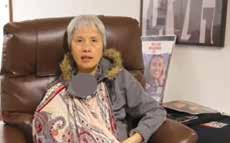
In October, Liora, sitting in a wheelchair, was asked in an interview with a local television station how she imagined their reunion.
“At least to be able to hug her,” Liora answered.
On Saturday night, Noa spoke in a video that was screened during a demonstration in Tel Aviv calling for the government to reach a deal to secure the release of the remaining hostages.
“As an only child to my parents, as a child to a mother who is terminally ill, the thing that occupied me the most in captivity was concern for my parents,” she said, adding that it is “a great privilege to be by my mother’s side, after eight months of uncertainty.”
Noa boyfriend, Avinatan Or, is still being held hostage. At least 116 hostages abducted by Hamas on October 7 remain in Gaza — though 42 of them have been confirmed dead. 105 civilians were released from Hamas captivity during a weeklong truce in late November, and four hostages were released prior to that. Seven hostages have been rescued by troops alive, and the bodies of 19 hostages have been recovered, including three mistakenly killed by the Israeli military.
Two soldiers were killed during fighting in Gaza this week as the Israeli military used fighter jets and attack helicopters to support ground troops in the Strip.
Master Sgt. (res.) Nadav Elchanan Knoller, 30, was a platoon sergeant in the 8th Reserve Armored Brigade’s 121st Battalion and was from Jerusalem. Maj. (res.) Eyal Avnion, 25, was a deputy company commander in the 8th Reserve Armored Brigade’s 121st Battalion and lived
Unfortunately, with their deaths, the total number of lives lost in the IDF during the Hamas war comes to 322.
Another reservist of the 121st Battalion was seriously wounded in the same incident, which was still being investigated by the Israel Defense Forces.
In another incident, a soldier in the 401st Armored Brigade’s 52nd Battalion was seriously wounded by anti-tank fire in Gaza, as troops continued to battle the terror group in Gaza’s southernmost city Rafah, as well as in Gaza City’s Shejaiya, and in the Netzarim Corridor in the Strip’s center.

The IDF had ordered civilians to leave the area of Khan Younis overnight on Monday and then carried out a wave of airstrikes in the area. The strikes targeted areas where the Palestinian Islamic Jihad terror group had fired rockets into Israel on Monday.
At least 1.9 million Palestinians of the 2.3 million Gazan population are currently in the “humanitarian zone,” located in the al-Mawasi area on the Strip’s coast, in western neighborhoods of Khan Younis, and in central Gaza’s Deir al-Balah.
A few hundred thousand Palestinians remain in northern Gaza, according to the estimates, and around 20,000 Palestinians remain in the Rafah area.

Parts of New Mexico were flooded over the weekend, forcing the rescues of at least 100 people. Most of central New Mexico remained under a flood watch into Tuesday, including Albuquerque, Santa Fe, Las Vegas and Ruidoso.

The flooding severely damaged the areas left bare by wildfires; those areas are void of trees, grass and brush to halt and absorb the waters.
National Guard spokesman Hank Minitrez confirmed troops had assisted over the weekend in the rescue of at least 100 people stranded by flood waters in vehicles or otherwise, mostly in the Ruidoso area, Ruidoso Mayor Lynn Crawford said he’d “never seen anything like that.” “It was insane,” he said on Monday.
Ruidoso spokesperson Kerry Gladden said there had been 26 swift water rescues in their village alone on Saturday and 51 on Sunday.
According to the National Weather Service, quarter-sized hail and 60 mph wind hit the Albuquerque area late Saturday night. Heavy rain from a severe thunderstorm brought flash flooding to many parts of the city and downed power poles, leaving up to 20,000 residents without electricity for hours.
On Monday, Boeing announced that it would be buying Spirit AeroSystems, a company that plays an important role in supplying and manufacturing airplane parts for Boeing. The acquisition values Spirit at $4.7 billion ($37.25 per share). With the manufacturing company’s net debt
included, the transaction value is estimated to be $8.3 billion.
In March, Boeing initially declared that it intended to acquire Spirit, which was owned by Boeing until it was sold in 2005. By reacquiring Spirit, Boeing believes that it will be able to make its airplanes more safe.
“We believe this deal is in the best interest of the flying public, our airline customers, the employees of Spirit and Boeing, our shareholders, and the country more broadly,” said Dave Calhoun, the president and CEO of Boeing.

Spirit AeroSystems manufactures several important parts for a number of Boeing planes, including the 737 Max’s fuselages. After they are manufactured, the parts are sent to Boeing factories, where they are assembled. Since Spirit is also a supplier for Airbus, a competitor to Boeing, the acquisition will split the
Spirit company, with Airbus purchasing the manufacturer’s “major activities” relevant to Airbus, including production of A350 fuselage sections in Kinston, North Carolina, and St. Nazaire, France, as well as A220 wings and mid-fuselage in Belfast, United Kingdom, all for just $1, according to Boeing’s rival. Spirit’s dealings with Airbus made up 19% of the supplier’s 2023 revenue, or $1.1 billion.
Spirit will pay Airbus $559 million in compensation. Although Boeing initially sought to force Airbus to pay more money, Spirit refused to participate in such a deal.
In January, an Alaska Airlines 737 Max had a door plug blowout mid-flight. Many other incidents, as well as a number of whistleblowers, have raised concerns over the safety of Boeing airplanes.
The Supreme Court ruled Monday that former President Donald Trump is entitled to substantial immunity from prosecution on charges of trying to overturn the last election, a blockbuster decision in the heat of the 2024 campaign that vastly expanded presidential power.
The vote was 6-3, dividing along par-

tisan lines. Its immediate practical effect will be to further complicate the case against Trump, with the chances that it will go before a jury before the election now vanishingly remote and the charges against him, at a minimum, narrowed.

The decision amounted to a powerful statement by the court’s conservative majority that presidents should be insulated from the potential that actions they take in carrying out their official duties could later be used by political enemies to charge them with crimes.
Chief Justice John Roberts, writing for the majority, said Trump had at least presumptive immunity for his official acts. He added that the trial judge must undertake an intensive factual review to separate official and unofficial conduct and to assess whether prosecutors can overcome the presumption protecting Trump for his official conduct.
If Trump prevails at the polls, the issue could become moot since he could order the Justice Department to drop the charges.
The liberal wing, in some of the harshest dissents ever filed by justices of the Supreme Court, said the majority had created a kind of king not answerable to the law.
Broad immunity for official conduct is needed, the chief justice wrote, to protect “an energetic, independent executive.”
“The president therefore may not be prosecuted for exercising his core constitutional powers, and he is entitled, at a minimum, to a presumptive immunity from prosecution for all his official acts,” Roberts wrote. “That immunity applies equally to all occupants of the Oval Office, regardless of politics, policy or party.”
In dissent, Justice Sonia Sotomayor wrote that the decision was gravely misguided. In a rare move and sign of deep disagreement, she summarized her dissent from the bench, making off-the-cuff remarks that underscored her frustration.
“Today’s decision to grant former presidents criminal immunity reshapes the institution of the presidency,” she wrote. “It makes a mockery of the principle, foundational to our Constitution and system of government, that no man is above the law.” (© The New York Times)

Want to live longer? Don’t eat ultraprocessed foods. According to a new study, eating those foods can reduce a person’s lifespan by 10%
The study – still unpublished – followed 500,000 people over three decades. It noted that the risk went up to 15% for men and 14% for women once the data was adjusted, said study lead author Erikka Loftfield, an investigator at the National Cancer Institute in Bethesda, Maryland.
Asked about their consumption of 124 foods, people in the top 90th percentile of ultraprocessed food consumption said overly processed drinks topped their list.
“Diet soft drinks were the key contributor to ultraprocessed food consumption. The second one was sugary soft drinks,” Loftfield noted. “Beverages are a very important component of the diet and the contribution to ultraprocessed food.”
After drinks, refined grains such as ultraprocessed breads and baked goods were popular with consumers.
The NOVA classification system sorts foods from minimally processed like whole foods such as fruits and vegetables to processed foods such as deli meat and sausage to ultraprocessed. Ultraprocessed foods contain ingredients “never or rarely used in kitchens, or classes of additives whose function is to make the final product palatable or more appealing,” according to the Food and Agriculture Organization of the United Nations.
The list of additives includes preservatives to resist mold and bacteria; emulsifiers to keep incompatible ingredients from separating; artificial colorings and dyes; anti-foaming, bulking, bleaching, gelling and glazing agents; and added or altered sugar, salt and fats designed to make food appetizing.
The preliminary study, presented Sunday at the annual meeting of the American Society for Nutrition in Chicago, analyzed dietary data gathered in 1995 from nearly 541,000 Americans ages 50 to 71 who were participating in the US National Institutes of Health-AARP Diet and Health Study.
Researchers linked the dietary data to death rates over the next 20 to 30 years. Compared with those in the bottom 10% of ultraprocessed food consumption, people who ate the most overly processed food were more likely to die from heart disease or diabetes, according to the study. Unlike other studies, however, researchers found no rise in cancer-related death.
The U.S. Dietary Guidelines for Americans already recommends limiting sugar-sweetened beverages, which have been linked to premature death and the development of chronic disease. A March 2019 study found women who drank more than two servings a day of sugary beverages – defined as a standard glass, bottle or can – had a 63% increased risk of premature death compared with women who drank them less than once a month. Men who did the same had a 29% increase in risk.
Scientists say that people should stay away from processed meats such as bacon, hot dogs, sausages, ham, corned beef, jerky and deli meats; studies have linked red and processed meats to bowel and stomach cancers, heart disease, diabetes and early death from any cause.
Ultraprocessed food manufacturing has exploded since the mid-1990s, with estimates that nearly 60% of the average American’s daily calories come from ultraprocessed foods.

The Supreme Court ruled Friday that federal prosecutors had improperly used an obstruction law to prosecute some members of the pro-Trump mob that entered the Capitol on Jan. 6, 2021.
The ruling could affect the prosecutions of hundreds of rioters out of the more than 1,400 who have been charged with an array of offenses for taking part in the effort to block certification of the 2020 election results.
It could also have an effect on part of the federal case against former President Donald Trump accusing him of plotting to overturn his 2020 loss at the polls. But the precise impact on those cases will not be-

come clear until trial courts review them in light of the Supreme Court’s ruling. Prosecutors had argued that the law applied to efforts to obstruct an “official proceeding” — the joint session of Congress that took place on Jan. 6, 2021, to certify the Electoral College results.
But Chief Justice John Roberts, writing for the majority, read the law narrowly, saying it applied only when the defendant’s actions impaired the integrity of physical evidence.
Lower courts will now apply that strict standard, and it may lead them to dismiss charges against some defendants, although most of those charged or convicted under the obstruction law also face other charges.
The vote was 6-3, but it featured unusual alliances. Justice Ketanji Brown Jackson, a liberal, voted with the majority and filed a concurring opinion. Justice Amy Coney Barrett, a conservative, wrote the dissent.
None of the opinions in the case discussed the charges against Trump, which rely only in part on the obstruction law. Federal prosecutors have downplayed the significance of the obstruction charge, saying it was an important but not essential part of their overall strategy to prosecute the 1,427 people charged thus far in the attack on the Capitol. Of that number, 350 were charged under the section of the law challenged in the case, according to the Justice Department.
The biggest unknown is the fate of the 52 people who have been convicted exclusively under the law, with no other charge — 27 of whom are currently serving sentences in federal prison.
The defendant in the case before the justices, Joseph W. Fischer, faced six other charges. (© The New York Times)

Former mayor of New York City Rudy Giuliani was disbarred in New York this week after a court said that he had made false statements about the 2020 election.
Giuliani is a former federal prosecutor and was a legal advisor to Donald Trump.
A New York appeals court in Man-
hattan ruled that Giuliani, who had already had his New York law license suspended in 2021 for false statements he made after the election, is now “disbarred from the practice of law, effective immediately, and until the further order of this Court, and his name stricken from the roll of attorneys and counselors-at-law in the State of New York.”
Giuliani’s attorney Arthur Aidala said they were “obviously disappointed” but not surprised by the decision. He said they “put up a valiant effort” to prevent the disbarment but “saw the writing on the wall.”
The court said in its decision that Giuliani “essentially conceded” most of the facts supporting the alleged acts of misconduct during hearings held in October 2023. Instead, the decision said, he argued that he “lacked knowledge that statements he had made were false and that he had a good faith basis to believe the allegations he made to support his claim that the 2020 Presidential election was stolen from his client.”
The court said it found that Giuliani “falsely and dishonestly” claimed during the 2020 presidential election that thousands of votes were cast in the

names of dead people in Philadelphia, including a ballot in the name of the late boxing great Joe Frazier. He also falsely claimed people were taken from nearby Camden, New Jersey, to vote illegally in the Pennsylvania city, the court said.
The order states that Giuliani must “desist and refrain from practicing law in any form,” including “giving to another an opinion as to the law or its application or any advice” or “holding himself out in any way as an attorney and counselor-at-law.”
Giuliani filed for bankruptcy last year after he was ordered to pay $148 million in damages to two former Georgia election workers over falsehoods he said about them. He is also facing criminal charges in Georgia and Arizona over his role in the effort to overturn the 2020 election. He has pleaded not guilty in both cases.
Back in the ‘80s, Giuliani made a name for himself as a top federal prosecutor in New York when he went after the mob. That recognition brought him into politics, and he became mayor of the Big Apple in 1994. His leadership of New York after the Sept. 11 terror attacks in 2001 earned him the title of “America’s mayor.”
plained.
Carrington decided to have all of her chickens attempt the Guinness World Records title for the most tricks by a chicken in one minute.
One of the chickens, Lacy, emerged as the clear winner of the flock, correctly identifying six letters, numbers and colors in one minute.
The focused nature of the tricks led Guinness World Records to create a new category for Lacy: the most identifications by a chicken in one minute.
“The chicken is a very underestimated animal, and I think if you could stop to think the chicken is a smart animal ... you could maybe look at other animals and think ‘Maybe they’re smarter than I thought,’” Carrington said.
So they’re not so bird-brained after all…


These fowl are not just fine feathered; they are fine readers, too.
Last year, Emily Carrington, a veterinarian, bought five chickens. She had wanted the hens to produce eggs for her, but once she got them, she decided to test their knowledge and train them to identify numbers, colors and letters.
“Their job was to only peck the number or letter that I taught them to peck and ignore the other ones. Even if I add a whole bunch of other letters that aren’t the letter they are supposed to peck, they will just peck the letter that I trained them to peck,” Carrington ex-
Hadjer Al-Ali is an honest homeless man living in Amsterdam. Looking for empty plastic bottles in public trash cans at the Amsterdam central station, Hadjer found a wallet stuffed with 2,000 euros in cash. Although the wallet did not have any identifying information on it, he turned in the wallet – and the cash – to police.
“Because we think that honesty should pay, he got a ‘silver thumb’ prize that we sometimes give to citizens and a gift voucher worth 50 euros,” authorities added.
If the money is not claimed within one year, it will go to the finder.
But when the public heard what Hadjer did, donations poured in for the man who had been living on the streets for 18 months. An online campaign raised more than 34,000 euros in just one day. People have sent him messages offering him a job.
“I want to thank everyone so, so, so much... I can’t describe how I’m feeling at the moment... I’ve been inundated by people saying the sweetest, nicest, things,” Hadjer said in a video post on Instagram.
“I can’t find the words, I don’t know what to say, I’m full of adrenaline,” he added, saying he could rebuild his life with the money collected.
Can’t bottle up those feelings of happiness.

Climbing buildings is his forte, but police aren’t too happy with Marcin Banot scaling tall buildings.
The Polish daredevil was arrested in Buenos Aires on Tuesday as he tried to climb a 30-story building without ropes, only to be removed by firefighters.
Banot was dressed in an Argentine football jersey and was intercepted after climbing 25 floors of the Globant building as onlookers gathered below.
More than 30 firefighters, ambulances and police cars were rushed to the scene after someone inside the building called police.
Banot had tried to climb the same building last week but was prevented by authorities.
The 36-year-old has pulled similar stunts in other countries and has hundreds of thousands of followers on social networks.
Can we call him a social climber?

Ivan Schalk had big dreams. The Dutch man had always wanted to build the world’s longest bicycle. Now, with a team of engineering experts, the 39-year-old achieved the feat with a bike that measures 180 feet and 11 inches long.
“I’ve been thinking about the idea

for years. I once received a Guinness World Records book in which I came across this record,” he told Guinness World Records.
Schalk, who has experience building carnival floats, finally set out to make his dream into a reality, and recruited a few fellow Prinsenbeek residents to his cause.
“Prinsenbeek is known for its volunteers and high technical employability,” Schalk said. “You can hang out in
front of the TV, but we’re not like that here in Prinsenbeek. We have the technical knowledge and want to apply this knowledge to the maximum.”
The team spent years building the dream bike, pausing for two years because of the pandemic. Finally, they took their big bike for a 100-meter ride, with one team member operating the handlebars up front and another pedaling in the back.
The team then broke the record for
the world’s longest tandem bicycle by adding extra pedals and more team members into the mix.
The bicycle will now have a new home at the local history museum in Prinsenbeek.
Wonder if you need a bigger helmet to ride such a big bike.



The time between the end of school and the beginning of camp is a challenge for all families. Sensing the need in the Five Towns and Far Rockaway community for free, fun, wholesome entertainment during this time, Jewish Community Council of the Rockaway Peninsula (JCCRP) created
an annual free Family Fun Day for all families. This year, activities included a magic show, face painting, bouncy houses, slide, balloon shaping, and arts and crafts activities. Everyone could partake in the snacks, refreshments and cotton candy machine!
The JCCRP Family Fun Day event


was a smashing success with over 800 attendees on Wednesday, June 26. So many local families came out to enjoy all of the rides and activities. Thanks to the support and partnership of the Jewish Community Relations Council of New York, NYC Office for the Prevention of Hate Crimes, UJA-Federation of New York,
Central Pizza Co, RNSP, and Kol Save. A big thank you to the Far Rockaway and Five Towns community for coming out to participate in our free family fun day!


New York State Assemblywoman Stacey Pheffer Amato recently met with CATCH (Creating A Team of Courage and Hope) founder Jessica Tsur to discuss access to mental health. Tsur discussed her organization and its uniqueness as it provides group therapy sessions for women in the Orthodox Jewish community.
“This is an amazing program, and Jessica has made a place where women from our community can come together to help each other with any type of mental health needs,” said Assemblywoman Pheffer Amato.
Those interested in learning more, can visit www.catchsupport.org.


On Tuesday, July 2, scores of residents of Lawrence and Inwood showed up at a Town of Hempstead zoning hearing on proposed Transit Oriented Developments planned in North Lawrence and Inwood. After the meeting, the TOH Board extended the moratorium on the development for another 30 days for comments. A change.org petition urging the Board to rescind the zoning statute garnered more than 550 votes by the time of the hearing.

Our campers brought so much excitement and energy to Hillel Day Camp 2024 opening day on Thursday! The hallways and fields were bursting with the elated sounds of children having the summer of their lives. They are so happy to be in camp with our staff ensuring their safety with careful supervision and our lifeguards, sports, and specialty staff implementing our carefully planned program that ensures participation and fun throughout the day.
Hillel Day Camp represents closeness, community, and camaraderie. We are so proud that so many of our staff members, counselors, and lifeguards grew up in the HDC family and have now taken on leadership roles in camp.
We’re off to a fabulous start! Week one already brought us so many fun activities like art, sports, swim, interactive onegs, an incredible show from the Extreme

Dunk Team, play at Lollibop Cafe and karate at Warren Levi Martial Arts. We are looking forward to adventures in our new specialties of messy STEM, Israeli dance, coding drones, and podcasting!
Follow the action throughout the week on Instagram @hillel_day_camp

16 July 2024 | 7:30-9:00pm 513 CENTRAL AVE, CEDARHURST, NY 11516





ART EXHIBITION + AUCTION

Please Join Us
Join artists Yaeli and Shaindy for an unforgettable evening of creativity and compassion, as we unite to support Nevut. NEVUT's vital mission is to provide therapy and reintegration after combat for lone soldiers in Israel. Let's heal hearts and minds, with every contribution strengthening our connection to our family and our homeland.
Featuring Guest Speaker Captain Chaim Meisels IDF



Last Monday evening, the Jewish Heritage Center (JHC) hosted its much-anticipated annual dinner, marking 36 years of incredible growth. The night was filled with inspiration, unity, and profound gratitude, as attendees came together to express their appreciation and support for all the JHC has done for the community as a whole, and for each individual personally.
Looking around at the diverse group of attendees, it was clear to see the wide-reaching impact of the JHC. The room was filled with people at vastly different stages of life, growth, and observance, yet all were united by their connection to the Center.
The dinner paid special tribute to Rabbi Dov Wolowitz, a”h, a pioneer in the world of kiruv and the founder of

the JHC. He noticed the hundreds of thousands of assimilated Jews in his own backyard in Long Island, but unlike all the others who saw, clucked their tongues, and moved on, he decided to do something.
His burning passion led to the founding of the JHC, with its mission to reach his Jewish brothers before losing them to assimilation.
Although he is no longer with us, Rabbi Wolowitz’s legacy continues to live on through the remarkable work of the organization. Every Jew brought closer to Yiddishkeit and every family connected to the Center is all his zechus.
Working alongside Rabbi Wolowitz were two remarkable people, Rabbi Naftali Portnoy and Rabbi Moshe Turk.
As directors of the JHC, they brought the dream and vision of Rabbi Wolowitz to fruition, dedicating their lives to Klal Yisrael and kiruv.
Rabbi Moshe Turk, a passionate talmid chacham with unparalleled ahavas Yisroel, and incredible kochos hanefesh was the first to join Rabbi Wolowitz, with the title of director.
One year after Rabbi Turk took on the role, Rabbi Naftali Portnoy brought his incredible vision, leadership qualities, and passion for helping Klal Yisroel to the JHC, and joined as Co-director.
Together, they were the drive be -
hind the JHC’s unstoppable growth. It was under their leadership that the JHC took shape and morphed into a thriving multifaceted organization that transformed the lives of over 25,000 Jews. They worked tirelessly and continuously, adding more programs, starting more initiatives, opening additional centers, and creating an environment where all Jews, no matter their level of affiliation felt welcome.
The dinner was a perfect opportunity to honor them and all the work and dedication they’ve invested in the JHC.
Thirty-six years after its founding, there has been a remarkable resurgence of Torah in America, with the JHC playing a pivotal role in this mass-scale reconnection.
But their work is far from over.
As mentioned by the dinner, the organization has ambitious plans for establishing a new campus in the heart of Nassau County, reaching even more Jews and facilitating additional growth.
It was truly incredible to see the outpouring of people who credited their transformations to the JHC and to catch a first-hand glimpse of the work they do.
As the JHC continues to expand its reach and impact, it reaffirms its commitment to showing up for Klal Yisroel and making a difference.
The first recorded fireworks in England were at the wedding of King Henry VII in 1486.

Every school graduates its oldest grade and then moves into summer mode, to prepare for the coming school year. MTA is no different, but the class of 2024 really was wonderful, and this unique grade left an indelible mark in so many places. Sometimes it is only after the building is empty of students that the realization hits that this was truly a grade like no other.
This grade did not get off to a smooth start, as they began high school in masks, with regular Covid checks. They were only allowed in the building certain days of the week, with other days on Zoom. The transition to high school is challenging enough, but doing so without the usual programming designed to bond as a grade put this group of talmidim at a distinct disadvantage.
Despite the obvious challenges, by the time this group graduated, there was a closeness that is not commonly seen so widespread throughout a grade. The grade represents those who excelled on the court, in the classroom, in the lab, and with robotics, to name a few. With all the varied skills and personalities, each boy was respected for who he was and what he was able to contribute to the grade. Everyone spoke about it at graduation, because it really set this group apart.
MTA honored some particularly talented individuals at graduation. Valedictorian Noah Segelnick gave an outstanding address at graduation, which
exemplified his accomplishments in both limudei Kodesh, and secular subjects as well. Eitan Canter, MTA’s salutatorian, impressed the crowd with his breadth and depth of knowledge in all areas. Elie Beer was also given the opportunity to address the crowd at graduation because of his impressive academic achievements. Noah, Eitan and Eli were talmidim in Rabbi Tanchum Cohen’s BMK shiur, which continued learning well after graduation. These talmidim exemplify the Torah values of the MTA Class of 2024.
In addition to excelling in MTA classes, this grade scored a combined GPA of 3.93 in 45 YU courses taken in the Spring semester! A GPA like that would be an incredible feat on the college level, and MTA Seniors achieved that level of excellence!
The Class of 2024 reached new heights outside the classroom as well. MTA’s well-known publication of “Shema Koleinu,” which is a collection of divrei Torah written by rebbeim and talmidim at MTA, is one of the ways that the Class of 2024 set themselves apart from many other MTA grades. Around the yomim tovim, MTA publishes an expanded version of Shema Koleinu, and this year, they became legendary. Eitan Isaacs, the director of marketing and design for the publication, partnered with a professional publisher and gave Shema Koleinu a facelift that truly elevated it. Hundreds more copies were distributed than ever

MTA is always impressive at Robotics competitions, but this class in particular was exceptional. With so many strong leaders in the Senior grade, they were destined to go far. Led by Captain Pinchas Rosenfeld, along with Hillel Katz and Raphi Farber, the Lionotics reached the City championship for the first time in six years and placed third best school overall amongst all New York City schools!
When October 7 hit, MTA got involved in many chesed initiatives. One of those was “Boots for Israel,” which an MTA parent began and is still spearheading. The Yeshiva took a day and packed over a thousand boots to be sent to chayalim in need of proper attire to protect them from the elements. During the
MTA chesed mission to Israel that many talmidim participated in, someone in Kfar Aza spoke of a unit in need of boots. Following the mission, Yaakov Feldman began fundraising within his grade. The collection period ended within 24 hours, because 125% of the goal was reached with over $3,700 raised in the senior class alone!
This class will not soon be forgotten. They left a legacy of achievements behind that the Class of 2025 will continue to cultivate as the incoming seniors. MTA looks forward to continuing the successes of the Class of 2024 in the years to come!
hat is more fun than chopping and dicing together? Mixing and mingling, of course – as connections are being created! YUConnects brought the frum singles community together for an engaging evening on July 19 at the Young Israel of Woodmere, featuring a “Chopped” competition led by the renowned chef Naomi Nachman. Singles from various backgrounds had the opportunity to meet and enjoy a dynamic and interactive experience that combined culinary creativity with social networking.
Naomi Nachman, a celebrated chef and author, guided the participants through the “Chopped” competition, where six tables of men and women
worked together to prepare dishes using a mystery basket of Israel-themed ingredients. Attendees showcased their culinary skills, teamwork and innovative spirit as they presented their food creations to a panel of local judges. The friendly competition created a lively atmosphere, breaking the ice and fostering meaningful connections among the participants.
The event, supported by Young Israel of Woodmere and organized with its YIWMeet program, was not just about cooking; it was about building relationships in a comfortable and friendly way. As the competition heated up, singles mingled, shared laughs, and formed new friendships. After the competition,
networking continued in the lobby, with conversations lasting well into the night, further cementing the evening as a memorable and successful gathering. Dates have already been made and more are in the works.
YIW Meet Group, a dedicated committee of the Young Israel of Woodmere, plans social events and recurrent activities for singles. Contact them at yiwmeet@ gmail.com.
YUConnects, open to the Jewish community, offers unique social activities, targeted matchmaking and educational programs to foster healthy relationships toward marriage. Celebrating over 660 engagements, YUConnects welcomes







By Rabbi Daniel Schonbuch, LMFT
In today’s fast-paced world, maintaining a healthy and fulfilling marriage can be challenging. The demands of modern life often leave couples struggling to keep their relationship vibrant and connected. As a Marriage and Family Therapist, I believe we need to address this by offering healthy marriage workshops like the one I am running on July 9 in the Five Towns.
This workshop is designed to provide couples with the essential tools to strengthen their bond and enhance their relationship. Led by myself and Rifka Twerski Ganz, LMFT, couples will spend a fun and interactive evening learning key skills from the Gottman Method and Emotionally Focused Therapy (Sue Johnson), two of the most respected approaches in the field of marriage and relationships.
I have always believed that when couples are taught key relationship skills, they can build a stronger and more intimate relationship. I have seen firsthand how many couples have achieved deeper connections and happier marriages in just one evening.
1. Positive Communication Skills: Effective communication is the cornerstone of any healthy relationship. The ability to express one’s needs and feelings convincingly yet non-judgmentally builds resilience in a marriage. Through a series of exercises, couples will master active listening, navigate conflicts gracefully, and build a foundation of trust and mutual respect.
2. Enhancing Love Languages: Understanding and speaking each other’s love language can significantly enhance the emotional connection between partners. The workshop will explore the five love languages – words of affirmation, acts of service, receiving gifts, quality time, and physical touch – based on Dr. Gary Chapman’s popular concept. Couples will identify their own and their partner’s love languages and learn practical ways to express love that resonate deeply with each other.
3. Enhancing Affection and Intimacy: This workshop will provide strategies for couples to rekindle their relationship and strengthen their emotional bonds. In his book, The Seven Principles for Making Marriage Work, John Gottman explains that when couples do this
effectively, they increase their positive sentiment override (PSO). With more marital happiness and vibrancy, couples can better handle common and even more difficult challenges. Through guided activities and discussions, couples will explore ways to increase affection, turn towards each other more frequently, and keep the spark alive even amidst busy schedules and everyday stresses.
An Interactive and Engaging Experience
What sets this workshop apart is its interactive and engaging format. Participants will not only learn skills but also practice them with each other, breaking off to practice the skills alone with their spouse. This hands-on approach ensures that the insights gained are not just theoretical but practical and actionable.
Investing in your relationship is one of the most valuable things you can do. Whether you are newly engaged or have been married for years, this workshop offers something for everyone. By attending, you will gain:
New Communication Tools: Enhance your ability to communicate effectively and empathetically.
Deeper Emotional Connection: Discover ways to connect on a more profound emotional level.
Renewed Intimacy: Learn techniques to maintain and increase physical and emotional intimacy.
Stronger Relationship Foundation: Build a robust foundation for a lasting, fulfilling marriage.
Don’t miss this opportunity to enrich your relationship and create lasting positive changes. Join us for an evening of learning, laughter, and love with myself and Rifka Twerski Ganz. Together, let’s build healthier, happier marriages.
The event will be on Tuesday, July 9, 8:00 PM at 9 Beechwood Dr., Lawrence, NY. For more information and to register, visit www.danielschonbuch.com.
Rabbi Daniel Schonbuch, LMFT, is a renowned therapist and author specializing in helping couples overcome their challenges and enhance their relationship and intimacy. He also treats individuals with trauma and addiction and practices EMDR, Somatic Experiencing, and IFS. He maintains offices in Cedarhurst and Brooklyn. To make an appointment, please call 646-428-4723 or visit www.danielschonbuch.com.



Shul league Opening Day Wire:
The storm clouds and occasional showers pregame could not put a damper on Opening Day…. We start with the action in Inwood, as YIW took on Edward Ave in a match-up of A League titans…. YIW got it started early with back to back singles by Tzvi Gewirtz and Yehuda Konig, followed by Avi Nenner and Yossi Rosenberg bringing them home. Edward’s pitcher, Daniel Braun, would settle in from there and end the threat. The score remained 2-0 as both pitchers held the opposing lineups in check through 4 innings. In the bottom of the 5th, Edward pushed across a run to make it 2-1. In the top of the 6th, Dovid Blum led off with a triple, followed by hitting sensation Avi Nenner, who singled to right. Yossi Rosenberg followed with a single and then player of the game, Steve Pollan, brought down the hammer – a shot down the left field line for a threerun homer. Edward would answer in the bottom of the 5th, with Adam Ofman tripling in 2 runs to make it 6-3. Edward would add another run on a sacrifice fly by Shuie Ofman. But YIW would answer in the 7th with Rabbi Nossi Lieberman getting the rally started with a lead-off single followed by a single by Tzvi Gewirtz. RBI

singles by Dovid Blum, Avi Nenner and Yossi Rosenberg gave YIW the insurance runs they needed, as Steven Pollan set down Edward Avenue in order in the 7th…. In the late game, White Shul and AC traded 0s until the bottom of the 6th when White Shul got 2 on and Elimelech Sperling smacked a 3 run go ahead HR. Zezy Fuld contributed with a strong pitching performance (complete game shutout) and some helpful defense by Eli Weiss with a sliding catch to stave off a late inning rally….
Over in Lynbrook on the turf… Aish Kodesh toppled a shorthanded YILC 12-3, as Yoel Wagschal was a HR shy of hitting for cycle with 4 RBI, and pitcher Aharon Yosef Obadia was dealing all morning for Aish.… In one of the few tight games of the day, The Meerkats held on to beat Forest 4-1, as Mikey Weiss rejoined the team last minute to pitch and Dov Breskin laced a late double to put the game out of reach…. At Woodmere middle, reigning champs, Shteeble, continued to be their professional selves,

Jeremy Rose (Oceanside): My earliest memory was beating YINW while playing for OT at Ogden in (I believe) the playoffs. This was more than just a big game for me personally, as I was at the beginning of my softball career, and the W came against friends that I had looked up to for my entire childhood. It was as if it was a coming out party showing these guys that I belonged.
Yehuda Konig: I don’t really have a best memory as I enjoy each season and each game; and I tend to remember the tough losses more than the wins. But in terms of a really good early memory, it was my first season. I played with Beth Shalom. They were such a great group of guys. I joined mid-season and really didn’t know that there was a Shul League. I came down to Lawrence Middle School, and there were multiple games going on at the same time. It was
putting up 7 runs with pitcher Jonny Meyers in championship form (0 walks and went the distance). Barry Grossman got the start for YIO, and, in his first game pitched in over a year, turned back the clock 15 years and kept his team in the game…. In the game of the day, YIH’s Sam Mezrahi pitched a no-hitter into the fourth inning and Rafi Cohen kept left field on lockdown as the Piermonts jumped out to an 11-0 lead, but the Misfits made a furious comeback late; lead by Avi Katz’s hot bat (3 RBI). With a chance to tie or take the lead, a tough call went against the Misfits as a player missed 3rd base coming home. Despite 2 gold glove catches by Leib Ptalis in the outfield and the rally for 10 runs, NW loses to YIH 12-10…. Lawrence Middle School hosted the debut of the team from Plainview; playing against the OT Flames in their first game since a heartbreaking loss in the finals last season…. OT scored runs in bunches, but a very young YIPV team put up a fight, with OT eventually emerging victorious by a score of 16-9….. Kay Shul (formerly Pickwick) changed their name but kept their mazal. They remain a juggernaut. They downed Woodsburgh 10-3. Jeremy “Stella” Tabak went 3-3 with 2 singles and a triple in the loss for Woodsburgh.
just a good feeling, similar to that feeling when you enter a baseball stadium through the tunnel.

Jay Fuchs: For me, it’s about the comradery, friendships and teamwork that has developed over the years. Everyone wants to win, but it’s done with sportsmanship. Special thanks to Eli Dworetsky, who started the league, followed by Gordon Zisholtz tenure as Commissioner, and now Jordan Hiller who continues running the league.
Jason Cohen: Would have to be remembering Eli Dworetsky, handling all the equipment for all fields, umping games, wrangling all equipment after the games, dealing with all the midweek drama too. All for the cause, namely, launching this program to help the community unite in a new, healthy and powerful way.



Aspectacular summer is officially underway at HALB’s Avnet Country Day School. The excitement began when over 300 staff members were on hand for orientation. Preparations have been a year in the making to welcome the largest number of campers in Avnet’s 60-year history. Daniel Stroock, camp director, inspired the team with the message that the memories made at camp will last a lifetime.
Once the doors officially opened at the Hirt Family Campus (HALB Elementary) and Lev Shlomo Campus (DRS), Avnet campers enjoyed the first few days of their summer adventure. Preschool campers in the Tipot division settled in while crafting Independence Day projects. The Ma’ayanot girls were thrilled to reconnect with their friends and participated in engaging activities like music, country cooking, swimming and a bowling trip. First week highlights for the Agamim and Naharot girls included decorating gratitude journals and visiting Dave & Busters. They are looking forward to seeing “Wicked” on Broadway next week.
It was back to the action for the Ma’ayanot boys, who gave their all during
In a gesture of kindness and solidarity, The Five Towns Premier invited Jonathon Benhamou, IDF combat commander from Ashkelon, to undergo rehabilitation and therapy at their state-of-the art rehabilitation center. A warmhearted send-off for Jonathan took place last week as the staff at The Premier saluted Jonatham for his courage and strength. Israeli flags, balloons and cheers made it a special and uplifting goodbye. The Five Towns Premier Rehab and Nursing Center once again has shown that they stand together with the community providing support, care and a sense of belonging.
For further information about the Five Towns Premier, please call 516-3749300.


Gaga, Dodgeball and a trip to Bounce! They also demonstrated their talents in Art and Country Cooking. Over at the Lev Shlomo Campus, the boys in the G’vaot and Harim divisions practiced for their Softball and Net Leagues and cooled down during swim. A trip to Bounce! was a great way to show off their trampoline skills.
“Thank you to our staff, campers and our parent body for helping us get off to an amazing start,” Daniel said. “It’s incredible to walk around the halls and fields and see the smiling faces of Avnet campers. We wish everyone a safe and enjoyable summer!”

Yachad New York members recently enjoyed a wonderful time at the annual “Bowling Across the Region” event, bringing together participants and community members from various NY regions for a fun bowling playoff.
The event was a hit, with everyone relishing the opportunity to engage in friendly competition. The incredible camaraderie between players was evident as they cheered for one another, offered support, and encouraged each other throughout the games. This spirit of togetherness not only made the event enjoyable but also provided a fantastic way for participants to socialize and build lasting friendships.

The thrill of the competition added to the excitement, helping to boost participants’ confidence, and creating fun, memorable experiences. The enthusiasm and energy of the players were palpable, making the event a highlight for everyone involved.
Thank you to all the community members who joined us and contributed to the event’s success. Your involvement is deeply appreciated and plays a crucial role in fostering the inclusive, supportive environment that Yachad strives to create.
Yachad looks forward to continuing this cherished tradition and seeing everyone again next year for another round of bowling fun!



On Tuesday evening, June 25, Yeshiva Zichron Aryeh/Priority-1 celebrated the visionary leadership of its Rosh Yeshiva, Rav Shaya Cohen. The event, held at The Space at Westbury, marked the profound impact Rav Cohen has had on Jewish education over the past half a century. His efforts have revolutionized chinuch, empowering parents and educators with essential tools to transmit a deep connection to Hashem to the next generation.
The evening began with David Striks,


president of Priority-1, who acknowledged Rav Cohen’s unwavering commitment and passion for spreading true Torah values and educational excellence. Supporters, alumni, rabbeim, and talmidim were then treated to a film detailing the influences of the Yeshiva and the Rosh Yeshiva. This was followed by a surprise musical tribute by Yaakov Shwekey, a distinguished talmid of Rav Cohen, and Abie Rotenberg, a close friend.
The Rosh Yeshiva delivered a passionate keynote address, urging attend-

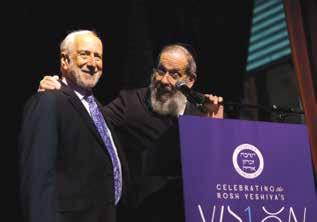

ees to reflect on their achievements while emphasizing the importance of continuous improvement. His call to never rest on laurels resonated deeply, inspiring all present to strive for greater heights in nurturing a generation of Jewish children with a passionate appreciation for the opportunity to live a life of Torah and mitzvos.
As Yeshiva Zichron Aryeh has grown to over 75 young men studying in-depth Torah and mussar, the need for an adequate facility has become evident. To ad-
dress this, the program concluded with the announcement of a two-stage building campaign, and the rendering of the Friedman Family building was unveiled for everyone to see.
The evening closed with a one-ofa-kind alumni reunion, where alumni joined talmidim and supporters in dancing, led by Joey Newcomb.

Nearly 100 members of the Touro Finance Alumni Network gathered last week at the Touro University campus in Times Square for its second annual event. Billed as an evening to expand professional networks, learn from other alumni in the business world and help rising undergraduate finance students, Touro graduates in finance roles at UBS, Morgan Stanley, JP Morgan, Deutsche Bank, Deloitte, Prudential, PwC, and other top firms, as well as some current students got to know one another and made professional connections over sushi.
The keynote speaker was Mitchell (Moyshe) Silk, the former assistant secretary for International Markets in the U.S. Department of the Treasury. After discussing his experiences in the Treasury Department, Silk gave the attendees three pieces of advice that he said helped fuel his success over his long career.
“What is most important to me and what kept me going, are my community, my family, and myself,” he said “This is primarily a finance crowd, and each of you should involve yourselves in community matters; dedicate yourself to your family, which should be self-explanatory; and take care of yourselves – take care of yourselves by learning, take care of yourselves by exercising, and take care of yourselves by pursuing outside interests.”
It’s All About Relationships
The Touro Finance Alumni Network launched last year at the penthouse office of Audrey Weitz, Managing Director at Old City Investment Partners in midtown Manhattan and a mother of two Touro University students. The organization was modeled after alumni organizations of top-tier public and private universities and the tremendous impact of those groups have had in creating opportunities for students and alumni alike.
“The point of the network is twofold: One is to help you, the alumni, build relationships with each other to advance your
own career,” said Jodi Smolen, director of career services for Lander College for Men (LCM) who organized the event and directs the Touro Finance Alumni Network. “Second is to connect back to Touro, so that you can hire Touro finance and accounting students into your into your firms now; and to mentor our current students to help jump-start their careers. It’s paying it forward.”
Josh Mandelbaum, a vice president and fixed income credit analyst at 1919 Investment Counsel, as well as a member of the Touro Finance Alumni Network executive committee, said events like these are important because in the financial industry, “it’s all about relationships.”
“It’s important to have relationships with people who went to the same school as you, because you never know what business and job you will need a few years from now,” said Mandelbaum, who travelled from Baltimore to attend.
“It also provides chizuk—it’s important to see successful alumni and for the young grads to start off making connections.”
Not only did the event help alumni and students network, it also sparked new ideas to branch out even further.
Abbie Jakubovic, a senior actuarial associate at Mercer and an alumnus of Touro’s Lander College for Men, suggested creating actuarial sub-group within the Touro Finance Alumni Network, and Yael Parkoff, a managing consultant at Forvis Mazars and a graduate of Touro’s Lander College for Women, suggested holding a similar event for women in business.
Beyond the ability to network and provide assistance to current Touro students and to alumni, one of the prevailing themes of the event was how graduates were returning home to take advantage of the opportunities that being home presents.
“I always say to people that one of the major problems of teaching is you don’t
The Walt Disney Company is said to be the largest consumer of fireworks in the world, spending around $50 million a year.

Keynote speaker Moyshe Mitchell Silk, former asst. secretary for International Markets in the U.S. Dept of Treasury, with Touro alumni
get to see the fruits of your labor,” said Dr. Meyer Peikes, chair of Touro’s undergraduate Department of Accounting and Business. “Sometimes you meet someone 20 years down the road, and sometimes
you don’t get to see them altogether. So it’s great to see all of you here and the companies you’re working for and your successes, we love to share in them.”

by Rabbi Shlomo Landau
Masked Greatness
In our community in Central New Jersey, there was a huge tragedy where two young teenage girls lost both of their parents within a relatively short period. A very kind and wonderful family opened their home and their hearts and offered to have the girls sit shivah in their home after the passing of the second parent. On one of the mornings of the shivah, I went to daven Shacharis at the beis ha’avel. As I entered, the host immediately approached me and said, “The most remarkable thing transpired here last night. Please do not leave after davening until I have shared this amazing story with you.” After davening, I approached the host, and here is the heartwarming tale that he shared. Late last night, after all the guests had left the shivah house and we were getting ready to retire for the night, there was a soft knock at the front door. I was a bit surprised that anyone would come that late. But the knocking continued,
and I went to the front door and peered through the peephole. What I saw nearly made me jump back. There was a woman in a face mask standing at my door! I inquired as to who she was and what she needed. She replied, “I am a Jewish woman from Brooklyn, and I apologize for my late arrival, but would it be okay to come in and speak with the orphaned girls?” I told her that I would ask the girls, and when they replied in the affirmative, I told her to go right in.
She apologized profusely for coming at such a late hour, but she added that she had an explanation.
“Please don’t be taken aback by my appearance. You see, less than a year ago on a fateful Friday night, we had a terrible fire in our home that claimed the lives of seven of my children. I, too, sustained serious burns, hence the burn mask that I am wearing. You can only imagine the nightmare that I have lived through over the last few months, but baruch Hashem, I am slowly starting to heal. Nevertheless, going in a car is extremely painful, as every bump and jolt

irritates my many burns. This is why I arrived at such a late hour, as the kind woman who drove me here drove extra cautiously and substantially slower to ease the difficulty of the trip.”
At this point, the host interrupted her and remarked, “You must have been very close to the deceased to have undertaken the difficult journey! Correct?”
The woman replied, “Actually, I had never even heard of this family until today, when somebody shared their unfortunate story. But upon hearing that these two young girls were sitting shivah by themselves, I realized that I had a unique opportunity and immediately decided to work on finding a way of getting here.”
She continued, “Think about it for a moment — is there anything that anyone can tell these two young orphans that will make them feel better? Is there anyone who can give them hope? Can anyone tell them that it’s going to be okay?
And if they do, the girls have a right to respond, ‘How do you know? Have you ever been a child bereft of both parents?’
But they will at least get some hope from me,” she remarked, “because I can look them in the eye and share with them my story of intense loss. I can candidly relate to them that a few months ago I would never have believed that I would find comfort and that I would ever start healing. Yet, miraculously, each day I feel just a bit better than the previous day, and I am starting to see a light at the end of the tunnel.”
And that’s exactly what happened. With difficulty, the woman sat down directly

across from the girls. She looked into their eyes and cried along with them, but she also gave them hope as she shared her tragic journey, chatting with them until the hour was very late, whereupon she gingerly stood up and took leave of the girls to begin her arduous trip back to Brooklyn.
Mi k’amcha Yisrael! Who is comparable to Your nation, Yisrael!
Reprinted from Flashes of Greatness by Rabbi Shlomo Landau with permission from the copyright holder, ArtScroll Mesorah Publications.


On Sunday, June 23, JCCRP hosted a Success Space event at Make It Too Pottery. Single mothers were invited to bring their children and enjoy a morning midday painting in a relaxed atmosphere. The families enjoyed a delicious lunch during the event, and each family was given a beautiful gift bag. Malka Sweet, our Success Space Di-
rector, received a lot of positive feedback following the event. The women were grateful at how inclusive the event was. The date and time were ideal for most, given the fact that many children were home between school and camp. The women came from all walks of Jewish life, and many bonded over their shared pottery and lunch.

This week’s fundraiser reception for New York State Assemblywoman Stacey Pheffer Amato proved to be a resounding success, reflecting her steadfast support within the Jewish community. The event drew a diverse crowd, including local leaders, business owners, veteran activists and an impressive number of young residents, all eager to show their appreciation for Pheffer Amato’s dedicated service.
The highlight of the evening was a series of presentations from notable community members, who took to the stage to express their gratitude and admiration for Pheffer Amato. They praised her unwavering commitment to the Jewish community, noting her role as one of its staunchest supporters in
the state assembly. They highlighted her efforts in securing funding for local synagogues, Jewish schools, and community centers, as well as her advocacy for legislation that protects religious freedoms and combats antisemitism.
The fundraiser not only highlighted Stacey Pheffer Amato’s achievements but also reinforced the strong connection she has built with her constituents. Her dedication and unwavering support for the Jewish community was clearly evident, making the event a memorable and heartfelt celebration.
There is still time to support Stacey and participate in the NYS donation matching initiative! Visit https://secure.actblue.com/donate/staceyforassembly.



By age 12, Benjamin Franklin left school and served as an apprentice at a printing shop owned by his brother, James. Despite being almost entirely self-taught, Franklin later helped found the school that became the University of Pennsylvania and received honorary degrees from Harvard, Yale, the College of William and Mary, the University of St. Andrews, and Oxford.

At the age of 42, Franklin was rich enough to retire and become a “gentleman of leisure.” Franklin’s retirement allowed him to spend his remaining 42 years studying science and devising inventions such as the lightning rod, bifocal glasses and a more efficient heating stove.
Franklin invented the “glass armonica,” which was an instrument designed to replicate the otherworldly sound that a wet finger makes when rubbed along the rim of a glass. To play the instrument, the user would simply wet their fingers, rotate the apparatus and then touch the glass pieces to create individual tones or melodies. The armonica would go on to amass a considerable following during the 18th and early 19th centuries. Thousands were manufactured, and the likes of Mozart, Beethoven and Strauss all composed music for it. Franklin would later write, “Of all my inventions, the glass armonica has given me the greatest personal satisfaction.”
Forbes ranked Benjamin Franklin the 89th richest man in American history.
According to legend, Benjamin Franklin was not allowed to write the Declaration of Independence because everyone thought that he’s trying to slip a joke into the document.
Benjamin Franklin had a son who remained loyal to the British and fled to London after the war.
Among Franklin’s inventions are swim fins, library chair, extension arm, Philadelphia or Franklin stove, lightning rod and bifocals. He never patented his inventions as he considered them a gift to the public.
It was Franklin’s idea to use a matching grant combining public money with private donations to build the Pennsylvania Hospital. It was the first time that this concept was used.
Franklin is the only Founding Father to have signed all three documents that freed America from Britain, the Declaration of Independence, The Treaty of Paris and the United States Constitution.
In 1728, when he was 22, Franklin wrote his own epitaph.
1. How old was the youngest signer of the Declaration of Independence?
a. 70
b. 38
c. 26
d. 22
2. There are 24 known copies of the version of the Declaration known as the “Dunlap Broadside,” named after John Dunlap. Who was he?
a. Vice president of the Congress
b. A printer
c. An early historian
d. The first Librarian of Congress
3. In 1989, a Philadelphia man found an original copy of the Declaration of Independence in the back of a picture frame that he bought at a flea market for $4. It was verified as one of the 24 surviving copies from the official first printing of the Declaration. How much did it sell for in 2000?
a. $1,200,000
b. $8,100,000
c. $36,000,000
d. $47,000,000
4. Why didn’t George Washington sign the Declaration of Independence?
a. Because when they approached him to sign it, he explained, “I’m fully in support, but I don’t want my name on it because I’d rather work behind the scenes.”
b. Because he said that he wanted to discuss it with his wife first and would do so when he returned to Virginia. At that point, the Declaration was already complete.
c. Because he wrote it and is listed as the author.
d. Because he was in New York preparing to defend Manhattan from the British.

7. What is the first word of the Declaration?
a. We

b. When c. Whereas d. Wherefore
5. Which of the following was included in the Declaration of Independence?
a. A list of bad things that the King of England had done to the colonies
b. A threat that the colonies would take over the country of Britain if the King did not stop the fighting
c. A declaration that George Washington was president
d. The Bill of Rights
6. Which two states voted against the Declaration of Independence?
a. Pennsylvania and South Carolina
b. New York and Virginia
c. Delaware and Maryland
d. Colorado and California
7-B (The first sentence in the Preamble: “When in the course of human events, it becomes necessary for one people to dissolve the political bonds which have connected them with another, and to assume among the powers of the earth, the separate and equal station to which the laws of nature and of Nature’s G-d entitle them, a decent respect to the opinions of mankind requires that they should declare the causes which impel them to the separation.”)
6-7 correct: If you would have been around in 1776, you would have been one of the Founding Fathers. Nice wig!
3-5 correct: Not bad, although you are not exactly Benjamin Franklin.
0-2 correct: It’s a good thing America wasn’t relying on you in 1776!

By Rabbi Berel Wein
Rabbi Moshe ben Nachman (Ramban) is of the general opinion that events, as recorded in the Torah, occurred in a linear timeline. This is in spite of the maxim that there is “no late or early” in the Torah. He limits that rule to certain halachic instances as they appear in the Talmud. Thus, according to the Ramban, the story of Korach and his contest against Moshe that forms the central part of this week’s parsha occurred after the tragedy of the spies and their negative report about the Land of Israel.
As I have commented before, the negative report of the spies was motivated, according to rabbinic opinion, by personal interests having no objective value as to the issue of the Land of Israel itself. So too, this uprising against Moshe led by Korach, is also not an issue of justice or objective benefit to the people, but rather it is motivated purely by the personal issues and jealousies of Korach and his followers.
Both Korach and the spies masked their own personal drives for power and


position with high-sounding principles of public good, social justice and great concern for the future of the people of Israel. The very shrillness of their concern for the good of society itself calls attention to their true motives – they protested too much!
Pious disclaimers of any self-interest seem to always accompany those that clamor for social betterment and a more just society. But it is often personal ambition and the drive to acquire power over others that is the true face of these
policies. Only Heaven, so to speak, can do so. Moshe’s plea to Heaven is directed not only against the current Korach that he faces, but it is also against the constant recurrences of other Korachs throughout Jewish and world history.
Only a shocking miracle of the earth swallowing Korach and his followers and of a fire consuming those who dared to offer incense in place of Aharon would impress the historical psyche of Israel as to be wary of Korach’s imitators through the ages.
The very shrillness of their concern for the good of society itself calls attention to their true motives – they protested too much!
movements and individuals. All of the dictators of the past and present centuries promised great improvements for their peoples and countries and yet all, without exception, eventually only pursued their own personal gain and power. Always beware of those who speak in the name of the people. Most of the time, they are only imitations of Korach.
This is perhaps an insight as to why Moshe took such a strong stand against Korach and demanded an exemplary punishment from Heaven. It is extremely difficult for humans to judge the true motives of others in their declarations and
There is an adage in Jewish life that one should always respect others but also be wary of their true motives. Only regarding Moshe does the Torah testify that as the true servant of G-d, he is above criticism and suspicion. But ordinary mortals have ordinary failings, and self-interest is one of those failings. Moshe is true, and his Torah is true. After that, no matter how fetching the slogan or how glorious the promise, caution and wariness about the person and cause being advocated are the proper attitudes to embrace.
Shabbat shalom.

Every year, when we approach Parshas Korach, we attempt to understand the nature of Korach’s rebellion against Moshe and Hashem. The parsha begins (Bamidbar 16:3), “And they gathered against Moshe and Aharon, and they said to them, ‘You have more than enough! The entire congregation is holy, and Hashem is among them. Why do you exalt yourselves over the congregation of Hashem?’” Rashi there explains that Korach’s complaint was that “they all heard the words from Hashem’s mouth.” In other words, the entire Jewish people are prophets because they heard “Anochi Hashem Elokecha, I am the Hashem your G-d” and “Lo yehiyeh lecha, You shall have no other gods before Me” from G-d’s mouth, so why do they need Moshe Rabbeinu?
The Yismach Moshe said that he remembered three of his previous lives. He remembered that one of those lives was during the generation of the desert. He remembered that Korach was a very big person and not simply an honor seeker. Korach spoke of very exalted concepts, and he remembers that it was a very difficult test to avoid following Korach. The Yismach Moshe remembered that, with much difficulty, he avoided taking sides in the dispute between Korach and Moshe. Although it was extremely tempting, he did not follow Korach, though he did not support Moshe either.
A simple reading of the pesukim yields the impression that Moshe was all alone with no supporters. The Gemara, however, tells us that the sun and moon came to defend Moshe Rabbeinu.

By Rav Moshe Weinberger
Adapted for publication by Binyomin Wolf

According to the Gemara (Nedarim 39b), “The sun and the moon ascended from the heavens and said before [Hashem], ‘Master of the World, if you justify [Moshe] ben Amram, we will illuminate, and if not we will not illuminate” and the world will be plunged into darkness. We must understand why it was the sun and moon in particular that came to Moshe’s defense. In addition, we see that Moshe’s challenge to Korach was set for the following morning, the intersection between day and night, during the transition between the time of the sun and the time of the moon, as it says (Bamidbar 16:5), “in the morning, Hashem will make it known who He has chosen.”
In order to understand how the sun and the moon connect to the dispute between Korach and Moshe, we must first understand how the Jewish people
received the Torah on Sinai. The Gemara (Shabbos 82b) tells us, “When Moshe ascended to the higher world, the ministering angels said before Hashem, ‘What is this child of a woman doing among us?’ Hashem said to them, ‘He has come to receive the Torah.’ They said, ‘You seek to give this treasure which has been hidden for nine hundred and seventy-four generations to flesh and blood?!’” We see from this episode that the Torah is so lofty and exalted that it is completely unfathomable that a human being can have any connection to the Divine wisdom of the Torah.
The biggest miracle in history, bigger than the splitting of the Red Sea and the plagues in Egypt, is the fact that Moshe brought Divine wisdom down to earth and that we still have it today. The angels’ claim sounds true. How is it pos -
sible that Hashem’s thoughts, as embodied in the Torah, can be understood or remembered by man? Although it seems as if such a thing is not possible, we know that this is indeed what transpires when a Jew studies Torah. And this only happens through the process outlined in the introduction to Pirkei Avos, “Moshe received the Torah from Sinai and gave it over to Yehoshua...”
The miracle of our connection to the Torah only exists because of the unbroken chain of the mesorah, the tradition from Moshe Rabbeinu who brought the Torah from the heavens until today. Therefore, if a person separates himself from his rebbeim, teachers, the gedolei Yisroel, and the tzaddikim, who serve as his link to Moshe and Har Sinai, then he has no way to effect the miracle of the Torah’s connection with his mind. Without a connection to the unbroken chain reaching back to Moshe Rabbeinu, the miraculous link between heaven and earth, his mind once again becomes a piece of flesh and blood that can no longer contain the Divine wisdom of the Torah. When we nullify ourselves to our teachers and the tzaddikim, the masters of the mesorah, the tradition leading back to Har Sinai, we connect to the unbroken chain connecting us to Moshe Rabbeinu and the Giver of the Torah Himself. It is said that the Divrei Chaim of Zanz, zy”a, had a chavrusa with the author of the Minchas Chinuch. Although both men were giants in Torah, their study sessions were “not going.” After discussing the issue, they decided that their chavrusa was not succeeding because there was no “giver/receiver” re -
lationship between them. As we said above, the Torah was meant to be transmitted from rebbe to student throughout the generations. Because both giants in Torah were on equal footing, there was no “giver/receiver” dynamic in their chavrusa, and it was not working out. They therefore decided that every day they would switch off so that one day, the Divrei Chaim would be the “rebbe” and the Minchas Chinuch would be the “student,” and the next day, it would be the opposite. Only then was their chavrusa successful.
We can now understand the problem with Korach. Because he said, “We are all neviim , prophets, so we no longer need Moshe Rabbeinu,” he severed his connection to Har Sinai and the Giver of the Torah. He lost everything. The Jewish people are compared to the moon (See Sukkah 29a, Bereishis Raba 6:3), which can only give over the light it receives from the sun. It has no light of its own. If the moon were to consider itself self-sufficient and say that it does not need the light of the sun, it would no longer have any light at all. Every month on Rosh Chodesh, the moon “runs out” of light and once again turns to the sun to receive its light and then begins to shine again till it reaches its fullness in the middle of the month. Similarly, when Korach said that the Jewish people no longer needed Moshe, his claim threatened to sever the link between the Divine and mankind, which would have had cataclysmic consequences.
That is why the sun and moon told Hashem that they would not shine if Hashem failed to justify Moshe in his dispute with Korach. If the Jewish people lost the giver/receiver relationship connecting them to the source of Divine light, the sun and moon would also cease their giver/receiver relationship and the world would be deprived of physical light as well. If the giver/receiver, rebbe/ student, or parent/child relationship is broken down, we no longer have any true existence. The sun would never rise and the moon would disappear.
The Gemara in Bava Basra 74a relates a story in connection with this point in one of the wondrous tales told by Raba bar Bar Chana:
[The Arab Merchant] said to me, “Come, I will show you the hole in the ground which swallowed up Korach.” I went, and I saw two cracks which were emitting smoke. He took a few pieces of wool, soaked them in water, put them on the tip of a spear and inserted them into the cracks.
When he took them out, they were singed. He said to me, “Tell me what you hear.” [I put my ear near the cracks in the ground] and I heard them saying, “Moshe and his Torah are true, and we are the liars!” The Arab said to me that every thirty days, they are shaken up in Gehenom and brought to this place like meat that is being stirred in a pot and they say, “Moshe and his Torah are true, and we are the liars!”
locaust and Judaism and now insisted that she wanted to become a Jew. He asked if Rav Gutnik could please “talk some sense into her” and convince her not to abandon her family’s ways. Although he was reluctant to get involved in the affairs of a non-Jewish family, Rav Gutnik agreed in order to simply do someone a favor.
When Rav Gutnik met with the girl, she insisted that she wanted to convert. He tried to explain to her that every-
Because the Rebbe had said so, Rav Gutnik dutifully called the family, explaining that although he did not know why, the Rebbe in New York told him that he should meet with the girl’s mother. A few minutes after the mother sat down to meet with him, she began crying and confessed that she was really Jewish, that she had survived the Holocaust, and that because of her horrific experiences, she wanted to run away from everything Jewish, fled to Melbourne, and hid the fact that she was Jewish. She told him that even her husband did not know she was really Jewish.
Just like the moon recognizes on Rosh Chodesh that it needs the sun in order to have light, Korach now recognizes every Rosh Chodesh that the Jewish people are nothing without Moshe Rabbeinu,
According to the Rashbam, when the Gemara says that every thirty days, Korach and his followers call out, “Moshe and his Torah are true,” it means they make this proclamation every Rosh Chodesh. Just like the moon recognizes on Rosh Chodesh that it needs the sun in order to have light, Korach now recognizes every Rosh Chodesh that the Jewish people are nothing without Moshe Rabbeinu, who serves as the link to Har Sinai and Divine wisdom. Korach now realizes his mistake. Just like it is obvious that the moon has no light if it does not turn to the sun, if a Jew turns away from his rebbeim, teachers, and the tzaddikim like Korach did to Moshe, that Jew has no existence.
The third of Tammuz is the yahrtzeit of the Lubavitcher Rebbe, zy”a, and I would be remiss if I did not tell over a story about the Rebbe. Recently, I asked a talmid of mine who is a Lubavitcher for a story about the Rebbe that I had not heard before, and he told me the following:
The well-known philanthropist and businessman, R’ Yosef Gutnik of Melbourne, Australia, is the son of an important rav and talmid chochom in Melbourne, Rav Chaim Gutnik. Approximately 45 years ago, a non-Jewish man called Rav Gutnik asking for help. He explained that his fourteen-year-old daughter learned about the Holocaust in school and became obsessed with it. She began reading books about the Ho -
one grows up in a certain way and that she should follow in her parents’ ways. Judaism does not seek converts – she could live a righteous life as a gentile following the seven Noachide laws. If she wanted to consider conversion as an adult, that was another matter, but she should follow her parents as long as she was living in their home. She compliantly agreed, and he thought that was the end of it.
But a few weeks later, the man called Rav Gutnik again, complaining that his daughter was crying every day that she had to become Jewish. He asked if the rav could speak with her one more time. He agreed and met with the girl. After trying to convince her once again to listen to her parents, she refused to listen, saying that she simply had to become Jewish. Rav Gutnik then made the following proposal. He told her about the Lubavitcher Rebbe in New York. He told her that the Rebbe speaks English and that she should write about her predicament to the Rebbe and that Rav Gutnik would support whatever the Rebbe advised her to do. Rav Gutnik gave her the address, she agreed, went home, and wrote the letter.
A few weeks after his last meeting with the daughter, the Lubavitcher Rebbe’s secretary called Rav Gutnik with a message from the Rebbe. The Rebbe told Rav Gutnik that he should stop speaking with the girl’s father and should instead speak with her mother.
Rav Gutnik now understood the girl’s connection with Yiddishkeit. And the irony of the fact that it was the Holocaust which caused the girl’s mother to run away from Yiddishkeit and which caused her daughter to become interested in Yiddishkeit was not lost on Rav Gutnik. Amazed that the Rebbe knew to tell him to speak with the girl’s mother, the next time he was in New York, he asked the Rebbe how he knew that he should talk to the girl’s mother. The Rebbe told him that it was not ruach hakodesh, Divine inspiration (although no Lubavitcher would believe that). Instead, after reading the passionate letter written by this girl, the Rebbe felt that it simply could not be that such a letter was written by a non-Jew. He therefore assumed that she must already be Jewish. That is why he said that Rav Gutnik should speak to the girl’s mother.
A Jew can try to sever the giver/receiver relationship, like this girl’s mother did. But such a life is not a life at all. Only two things can happen if someone severs the connection. The person must either reestablish the connection and once again draw from the Divine light (as the woman’s daughter did) or the person’s existence will be completely negated and will fade away from any connection with the Jewish people.
May it be Hashem’s will that we all renew our connection to the baalei ha’mesorah , those that connect us to Moshe Rabbeinu and the Giver of the Torah, so that we will renew ourselves by turning to the Source of the Divine light, so that we will be “renewed in the future like the moon” with the coming of Moshiach, may he come soon in our days.
Rav Moshe Weinberger, shlita, is the founding Morah d’Asrah of Congregation Aish Kodesh in Woodmere, NY, and serves as leader of the new mechina Emek HaMelech.

By Rabbi Shmuel Reichman

In our previous article, we began exploring the concept of bracha. We explained that bracha represents the transition from infinite oneness to particular twoness — the process by which Hashem’s divine energy (shefa) flows into this world. When we recite brachos and say, “Baruch atah Hashem,” we are not blessing Hashem. Hashem, infinite and perfect, does not need our blessings. Rather, there are two simultaneous intentions that we must have when making a bracha The first, as Rabbeinu Bachya explains, is to acknowledge Hashem as the source of all blessing, abundance, and goodness in the world (Rabbeinu Bachya, Kad Hakemach, Bracha). This is a meditation of hakaras ha’tov (recognition of the good) and a practice of sourcing all multiplicity and bracha back to its source. In essence, when we make a bracha, we are recognizing Hashem as the source of all bracha.
Our second intention, as the Rashba (Shu”t HaRashba 5:51), Vilna Gaon, and Nefesh Hachaim (Nefesh Hachaim 2:2, 2:10) explain, is asking Hashem to continue to abundantly manifest into this world and into our personal lives.
Bending the Knee
Hakaras ha’tov, recognizing Hashem as the source of the good in your life, is an essential component of brachos. Only when we negate our egos and acknowledge that the goodness and bracha in our lives comes not from our own independent efforts but from Hashem — our ultimate Source and Creator — can we then receive more bracha. As the Nefesh Hachaim explains, by recognizing Hashem as your source, you transform yourself into a vessel capable of receiving more of the very bracha that you acknowledged. This is because Hashem can only flow into the space
you allow for Him. When you negate your ego, you make space for Hashem to flow into your life. In essence, you are recognizing Hashem as the source of bracha, appreciating Him, connecting yourself to Him, and then continuing to bring His flow of goodness back down into your life!
This deep idea is illustrated in the famous story in Neviim of Elisha’s visit with Ovadiah’s destitute widow, a woman who was struggling with poverty (Melachim II, chap. 4). Elisha instructed her to gather as many vessels as she could find so that she could pour oil into them. Miraculously, as long as there was room in the vessels, the oil kept flowing into them, but as soon as she ran out of vessels, the oil stopped flowing. This oil was a bracha from Hashem; it therefore flowed from an infinite source and would continue to flow as long as there was a vessel to receive it. The same is true regarding all bracha and shefa from Hash-
em; Hashem flows into the space that we make for Him in our lives.
Perhaps this is why we bend our knees in Shemoneh Esrei specifically when saying the word Baruch at the beginning and end of the first bracha and at the end of Modim — the bracha of thanksgiving. As humans, we are proud, capable, and intelligent. Chazal identify our tall, vertical stature as one of the two key characteristics that differentiate our physical appearance from that of animals. (The second is our ziv ha’panim, the glow that shines forth from our face, a reflection of our higher intelligence.) Our spine represents our stature, but it also represents our ego. Bowing down means negating our ego, recognizing Hashem as the ultimate source of our existence and the limits of our independent power. In Hebrew, the word “berech” shares the same root as the word “bracha” and means a
knee. One form of negating our ego is by bending our spine (Bava Kama 16a), the other is by bending our knee, thus, lowering our height and stature. The very means by which we receive bracha is by bending our berech (knee), thus negating our ego and creating space for Hashem to flow into our lives.
There is a deeper idea here as well. Bending the knee represents the process of expressing twoness from oneness. When standing erect, the leg is one continuous limb. When we bend our knee, we take that oneness and bend it into two. This is a literal act of creating twoness from oneness, a process we undertake as we become aware of the bracha that Hashem infuses into our lives.
This understanding of bracha also sheds light on a famous Gemara (Brachos 35a). The Gemara states that if one fails to make a bracha before taking pleasure (hanaah) from this physical world, it is as if he stole from Hashem. The Gemara then points out a contradictory source: “The heavens are for Hashem, while the land He gave to man” (Tehillim 115:16), which seems to imply that man is permitted to use the physical world freely. The Gemara solves this contradiction by stating: Man is stealing from Hashem only when he does not make a bracha beforehand; however, once he makes a bracha, it is no longer stealing. The question then is: What fundamentally changes when we make a bracha?
The simple answer is that a bracha is the means through which we “ask permission” from Hashem to use His world. Once we do so, we are allowed to partake in it, because it is as if He gave us permission to do so. However, there is a much deeper layer here. The entire world stems from, and therefore belongs to, Hashem. Without a bracha, one fails to source him or herself, and the world as a whole, back to its root, i.e., Hashem. In doing so, it is as if one is saying that Hashem is not connected to — or manifest within — this world. Therefore, when one uses the world in this manner, he is disconnecting it from its spiritual source, “stealing” it from Hashem. The spiritual concept of stealing is the act of taking an item away from its rightful owner and place. If one proclaims through his actions that the physical world is not fully connected to Hashem, he is essentially stealing from Hashem, removing the world from its rightful owner and place. However, in making a bracha , you source both the physical world and yourself back to Hash-
em. In doing so, you have connected both yourself and this physical world to Hashem — our rightful source — and the issue of stealing is resolved.
Klalos: Curses of Limitation Klalos (curses) are the exact opposite of bracha. If bracha is the overflowing and boundless expression of goodness and shefa into this world, klalah represents the limitation and constriction of Hashem’s flow into this world, replacing abundance with boundaries and restriction. A curse
containing no boundaries or edges. A body, on the other hand, starts and ends at specific places.
The Gemara (Taanis 8b) illustrates the application of this principle with regards to tefillah. The Gemara says that if you are walking to your grain storage house to count your grain, and you have not yet seen it, you can daven that your grain should be increased. If, however, you have already seen it, you can no longer daven for the increase. Before you give it concrete form, it could be anything; it remains in
When you negate your ego, you make space for Hashem to flow into your life.
is the attempt to limit Hashem’s manifestation and presence in this world. It is important to note that while the concept of klalah is often perceived as inherently negative, this does not have to be the case. Bracha represents outflow and endless abundance, while klalah represents a limitation of that abundance. If used correctly, the middah (characteristic) of klalah can actually be constructive. When the use of limitations is implemented only in order to help make the bracha useful and real, the klalah itself ends up becoming part of the bracha. For instance, too much rain results in flooding. A limitation on rain, resulting in a proper amount of water, is a necessary and productive form of limitation. The problem is when klalah is used for the purpose of destroying bracha and preventing any bracha from manifesting.
Bracha vs. Klalah
The Gemara (Taanis 8b) states: “Ein ha’bracha mitzuyah ela b’davar ha’samui min ha’ayin — bracha (abundance) occurs only in that which is hidden from the eye.” The logic behind this cryptic statement is profound. When something is not yet seen by the physical eye, it can be anything. The potential is limitless; Hashem can make it into anything. However, once the human eye sees it, it becomes fixed as that alone. It is now finite and limited, no longer subject to bracha and potential increase. When you see something, you immediately give it boundaries and limitations. This is why the gematria of “re’iyah” (seeing) is the same as “gevurah” (limitation and middas ha’din). Something spiritual cannot be seen. A neshama is boundless,
the world of potential and is still subject to the boundless flow of bracha. Once, however, you give it finite measure, it can be nothing more than what it already is. Davening for additional bracha would be a tefillas shav (prayer in vain).
We can now understand Bilaam’s attempt to curse the Jewish People in an entirely new light. Bilaam attempted to curse Klal Yisrael, to cut off their spiritual connection with Hashem. In response, Hashem did more than just negate Bilaam’s curses; He turned these very curses into brachos, strengthening the connection between Hashem and Klal Yisrael and reinforcing the channel of bracha that flows from Hashem into this world.
Returning to our original question, why were brachos (as we know them) only instituted at the time of the second Beis Hamikdash? The answer is as follows: There are two stages of history. The first stage lasted from Creation until the time period of Purim and Chanukah. This stage was highlighted by the miracles of yetzias Mitzrayim and Matan Torah and the presence of nevuah. During this stage, Hashem’s revelation in this world was apparent and clear. The physical world was naturally seen as an expression of a spiritual reality, and it was easy for one to source the physical back to the spiritual. As a result, institutionalized brachos were unnecessary; when one ate a meal, they naturally sourced the food back to Hashem, as it was abundantly clear that the food came from a transcendent, spiritual source —
Hashem. The same was true for the rest of daily life; spirituality came naturally and spontaneously.
However, with the end of prophecy came the end of this stage as well. We no longer experience miracles; we no longer experience Hashem as openly manifest in the physical world. As a result, Chazal instituted standardized tefillah and brachos for everyone to say throughout the day, the yearly cycle, and the various stages of life. The world has bent; the light has faded. We no longer naturally source ourselves back to Hashem; we need help pointing us in the right direction so that we can achieve this mission. This is the function of the standardized brachos and tefillah; they serve as a guiding path back to Hashem. (It is important to note that while the standardized format is identical for everyone, the internal experience and awareness is unique within each of us.)
Our mission is to use the physical world as a medium through which we connect to Hashem. We no longer see reality with a clear lens. But that gives us a unique opportunity — to create light within the darkness and to use our free will to choose to see Hashem. We don’t only ask for bracha; we create it by actively seeing Hashem’s presence flow into every aspect of our lives.
May we be inspired to live lives full of bracha, sourcing every dimension of our lives back to Hashem, and living a life of oneness within this world of twoness.
Rabbi Shmuel Reichman is the author of the bestselling book, “The Journey to Your Ultimate Self,” which serves as an inspiring gateway into deeper Jewish thought. He is an educator and speaker who has lectured internationally on topics of Torah thought, Jewish medical ethics, psychology, and leadership. He is also the founder and CEO of Self-Mastery Academy, the transformative online self-development course based on the principles of high-performance psychology and Torah.
After obtaining his BA from Yeshiva University, he received Semicha from Yeshiva University’s RIETS, a master’s degree in education from Azrieli Graduate School, and a master’s degree in Jewish Thought from Bernard Revel Graduate School. He then spent a year studying at Harvard as an Ivy Plus Scholar. He currently lives in Chicago with his wife and son where he is pursuing a PhD at the University of Chicago.
To invite Rabbi Reichman to speak in your community or to enjoy more of his deep and inspiring content, visit his website: ShmuelReichman.com.
By Rabbi Avrohom Sebrow
Yosef, the son of Rebbe Yehoshua, was sick and temporarily expired (Bava Basra 10b). During that brief lapse, he was given a glimpse of the World to Come. Immensely grateful to have his son back among the living, Rebbe Yehoshua asked him what he witnessed in the Heavenly realm. Yosef said, “I saw an inverted world.” Tosfos explain that he witnessed Rav Yehuda, the student of the great Amora Shmuel, holding a loftier place than his Rebbe. Tosfos explains the reason for this anomaly.
Yosef proceeded to list other observations of the Heavenly realms. He then said, “And I also heard there that they were saying: Those executed by the government enjoy such exalted status that no one can stand in their section.” The Toras Chaim explains that everyone has a canopy in the World to Come. If someone of a lower stature tries entering the canopy of someone of a greater stature in the World to Come, he will be singed. Those executed by the government achieve such a lofty status in the World to Come, that even the tzaddikim of that generation cannot enter their canopy.
The Gemara wonders who could possibly be so great. Is it simply the fact that someone was executed by the government that makes him great? The Gemara suggests that it must be referring to Rebbe Akiva and his chaveirm. They made a tremendous kiddush Hashem by not forsaking the Torah even on the pain of death. Rebbe Akiva never stopped teaching Torah. Even while being tortured by the Romans, Rebbe Akiva did not budge an inch. It must be that someone who died such a momentous death and made an unbelievable kiddush Hashem achieves an unfathomable place in the World to Come. Yet, the Gemara challenges that position. Rebbe Akiva was the gadol hador. He persevered and rose from humble beginnings to become the Torah bearer for his generation. Moreover, the Gemara cites numerous examples of his extraordinary kind deeds. Surely, he would have achieved a

lofty place in Olam Haba even if he was not executed.
Therefore, the Gemara says what Yosef heard must have been referring to those killed by the government in Lod. Rashi explains that the Gemara is referring to an incident recorded very briefly in Taanis (18b)
Trajan’s daughter was murdered. Trajan did not know who committed the murder. However, in his mind, he was sure
lives to save the Jewish community who are granted a lofty place in the World to Come. Even the tzaddikim of the generation cannot enter their canopy.
The Lev Shalom asks, “Why did the Gemara have to retract from its original suggestion? Yes, Rebbe Akiva achieved a lofty position in Olam Haba even without his execution. However, there were other great Tanaim and tzaddikim in his generation. Perhaps, Rebbe Akiva only achieved a
Is it simply the fact that someone was executed by the government that makes him great?
that the Jews were responsible. He sought to annihilate the entire Jewish community as retribution. Luleyanus and his brother Pappas falsely admitted to the heinous crime to spare the Jewish community. The ruse worked and the Jewish community was saved, but sadly Luleyanus and his brother Pappas were executed. It is these brothers who selflessly gave their own
loftier place than other tzaddikim because he died al kiddush Hashem?”
The Mishareis Moshe answers that, in truth, the Gemara could have used that explanation. However, the Gemara wanted to stress that this tremendous, elevated status is not only granted to people who were otherwise great tzaddikim, like Rebbe Akiva. Even people of lesser stature who
are not gedolei hador achieve this lofty perch in Olam Haba if they were executed by the government. It would seem that Pappas and Luleyanus were not known as the greatest tzaddikim of their generation, yet, no one of their generation can enter their canopy because of their self-sacrifice they made protecting Jews.
Rav Chaim Shmuelevitz, zt”l, the famed mashgiach of the Mirrer Yeshiva, said that this Gemara applies to our soldiers protecting Eretz Yisrael. Those soldiers that gave their lives protecting other Yidden achieve a lofty place in Olam Haba where other tzaddikim may not stand. Rav Asher Weiss, shlita, noted that while some parts of Sichos Mussar perhaps were not written by Rav Chaim himself, these words were. Rav Chaim in his own notes said that the above Gemara applies to Israeli soldiers. Moreover, he said that the Torah mandates that we show gratitude to someone who opens a door for us. Certainly, we must show gratitude for those who put their life on the line protecting us. Therefore, Rav Chaim wrote (during the Yom Kippur War) that it is our obligation to daven for these soldiers “bli gevul,” without limit.
Rav Yitzhak Pinchas Goldwasser, shlita, commented that he does not know in these times how anyone cannot cry and pour out his heart for these soldiers. (Hasicha vol 26)
Hashem should listen to our tefillos and bring peace to Eretz Yisrael and may we merit the ultimate redemption speedily.
(Vol 26 of Hasicha with the quotes from Rav Chaim Shmuelevitz and Rav Yitzhak Pinchas Goldwasser is available by sending an email to this author.)
Rabbi Avrohom Sebrow is a rebbe at Yeshiva Ateres Shimon in Far Rockaway. In addition, Rabbi Sebrow leads a daf yomi chaburah at Eitz Chayim of Dogwood Park in West Hempstead, NY. He can be contacted at ASebrow@gmail.com.

By Rabbi Yair Hoffman

For whatever reason there is, there is a hidden and relatively invisible group of people in our community: the single mothers of Klal Yisroel. And although many in our communities have tried to institute programs where people volunteer to bring these women’s sons to shul or volunteer to bring them to father-son learning programs, by and large, these programs kind of fall apart after a few months.
And the divorced women who live in our communities are a group whose numbers are growing dramatically.
Most of these women are not members of our shuls either. These women have children; they have struggles and questions, too.
These women need a rav who can address the important issues of their lives and of their children’s lives. They need a rav who can help them decide which two of their five children should be the one to go to summer camp. They need advice that only daas Torah can give them.
The Suggestion
Each shul should consider taking in between five and ten single mom families to this effect and offer them free or heavi-
ly, heavily discounted membership. True, everyone else is a paying member, but this is a huge need in Klal Yisroel.
In the Far Rockaway/Five Towns community alone, this author has a list of over seventy-five single mothers who could use such assistance and there are, of course, many more.
Please reach out to me if your shul can offer this to any of them.
What does halacha say about these women and their plight? The pesukim in the Torah tell us about orphans, widows and converts. But what about the growing number of divorcees? And if, in fact, the answer is that we should devote more resources to this invisible group, then we really have to do it.
A few years ago, a woman approached a number of gedolim in Eretz Yisroel about the plight of divorcees and obtained a remarkable letter. (Because there was a slight factual miscommunication in the recipient of the letter, it was never published at the time.) The three gedolim? Rav Aron Leib Shteinman, zt”l; Rav Chaim Kanievsky, zt”l; and Rav Michel Yehuda Lefkowitz, zt”l. The letter is
translated below:
To the Honorable Organization..
We have heard of the remarkable acts of chessed that you do with widows, rachmana litzlan, in a most befitting manner. Now you approach with a question in regard to divorced women: Do they have a similar halachic status in regard to tzedaka and in the manner in which to deal with them on an equal basis?
Our opinion is that the circumstances and situations are equal in their importance.
May the Holy One Blessed Be He enable you to continue in your blessed handiwork.
One who signs with wishes of blessing,
[Rav] Michel Yehudah Lefkowitz, Bnei Brak 5769 [zt”l]
We too join with what has been mentioned above,
[Rav] A.L. Shteinman [zt”l]
[Rav] Chaim Kanievsky [zt”l]
One important point that we must have in mind is that it is the greatest
chessed for chessed not to be done as if it is a chessed. All people have what to contribute, in conversation and in social activity. Our obligation is to realize that everyone is created b’tzelem Elokim, in the image of Hashem, and that there is depth to who they are as people. Their social contribution, their thoughts, and their opinions matter, and they are enjoyable company.
There was a famous bakery owner in Williamsburg, Mr. Gelb, who not only gave needy people challah and cake for Shabbos and yom tov, but also gave them change so that their self-esteem would remain intact. An even higher level that can sometimes be achieved is to actually render any assistance in such a manner that even we do not detect or perceive it as chessed, per se.
So, practically, what does this mean? We can help in two ways. Baruch Hashem, one of our askanim, Rabbi Dovid Greenblatt, has created an excellent organization called “Sister to Sister.” This organization is a remarkable way to lend assistance to this invisible group.
A second way, however, is to seek out
members of this invisible group and actively help them. Some of these divorcees have an ex who baruch Hashem cares enough about his children to provide them with even more than the court-mandated child support. Others often get a pittance. And some get nothing at all.
We must also not forget that divorced men also need to be welcomed into our homes and need emotional support and assistance. Often, men are perceived as the evil ones when they, too, have suffered enormously. Whatever happened in a marriage is not our concern. Ahavas Yisrael and chessed must be applied to all parties – these mitzvos are gender-neutral.
Tzinius
When helping them, it should be done in the most tzinius manner possible and with the contributions of both the husband and wife. It should also be done in a manner where they do not feel that you are doing it as a chessed. There are many ways to do this.
– Learn with their child
– Notice their kids in shul
– Offer to take the children along with yours on an outing
– Help them keep up with homework
– Shabbos invitations
– Extend invitations earlier rather than later
– Occasional financial help or a gift
– Offer to babysit once a month
– Ask if they need anything at Costco
– Offer to build them a sukkah – or to use yours
– Help them deal with fixing their car
– Help them deal with the IRS
– Help them in general negotiations
– Help them ensure that their kids have friends
– Sheitels – look out for a new one for them.
– Avoid avoiding them
One important point that we must have in mind is that it is the greatest chessed for chessed not to be done as if it is a chessed.
– Ask in general, “Is there anything specific I can do for you?”
– Just call to say hello
– Bring them flowers for Shabbos
– Get to know their favorite food items and that of their children
– Suggest shidduchim when possible and appropriate
– Suggest shidduchim for their children
– Help them deal with fixing the house
– Don’t be judgmental
– Don’t stigmatize
– Don’t say things in a pitying way
– Be sensitive to call them back
– Avoid saying insensitive things or asking insensitive questions
The pasuk in Michah (6:8) states, “What does Hashem require of you? Merely to do justice and love chessed.”
The idea is that we must foster and develop a love of chessed. Rav Sher explains that there are three elements to this love:
1. To love doing acts of chessed ourselves.
2. To love and appreciate a situation where chessed is being performed by others.
3. To love the existence of opportunities for chessed in the world.
The Chofetz Chaim writes (Ahavas Chessed 2:1) that not only must one love chessed, but one must stick to this character trait and always go beyond the measure of what is required. He gives the analogy of a parent. A loving parent gives more food and clothing than the child requires; we must do likewise in sticking to the middah of chessed.
The dramatic rise in divorces provides us all with an unprecedented opportunity for chessed. This chessed should be performed with the utmost consideration and thought for their self-esteem and self-perception. They are our brothers and sisters, and should be treated as such.
This article should be viewed as a halachic discussion and not practical advice. The author can be reached at yairhoffman2@gmail.com.

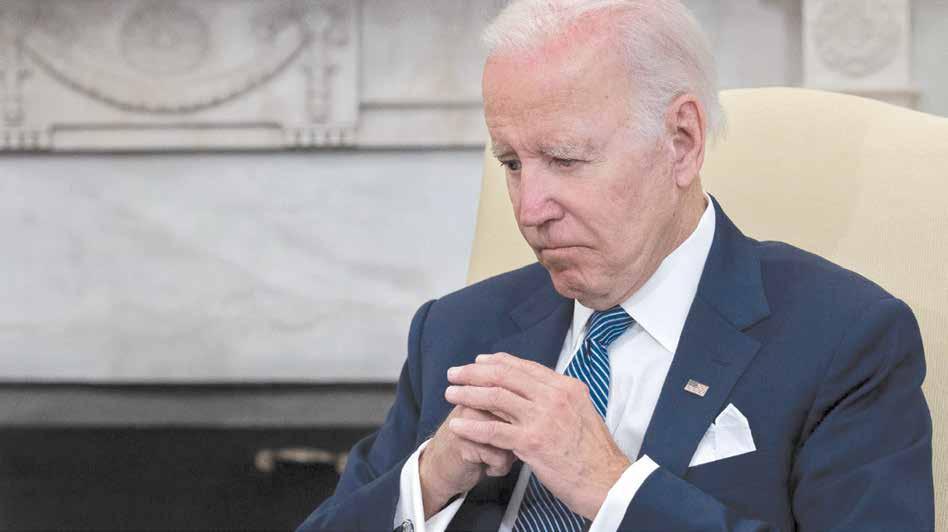
By Shloime Schwartz
From the very first moments of last Thursday night’s debate, President Joe Biden’s age-related issues were on full display on the biggest stage possible. Concerns about his advanced age began while Biden was on the campaign trail in 2020 but have been downplayed by the President, his supporters, and the media. During the debate with Donald Trump last week, the reality could no longer be ignored. The president looked feeble and brain-fogged, losing his train of thought, mumbling incoherently, and staring blankly off into space. In the aftermath, his entire candidacy is being called into question, as Democrats panic and the American public debates whether their president is physically and mentally fit for office.
Biden is far from the first commander-in-chief to have his presidency affected by medical issues. Presidents are only human, and just like anyone else, when they are sick, their ability to function is impaired. But because of the position they occupy, their health issues can have reverberations that are felt far beyond the Oval Office. Throughout American history, the health of the President has often left its mark. Which doctor they went
to, or what medicine they chose, or the decision to conceal an illness have all altered the political course of the country in major ways.
Abr A h A m LincoL n
Lincoln is seen as one of the greatest presidents in American history, but he was also plagued by numerous medical issues. His tall figure and distinctive facial appearance have led to some speculation about

Lincoln suffering from Marfan’s syndrome, a genetic illness which causes issues in the joints, spine, and cardiovascular system. Lincoln also suffered from the results of illnesses, accidents, and violence including smallpox, malaria, getting kicked unconscious by a horse, having a thumb nearly severed, getting frostbite, being clubbed in the head during a robbery attempt, and being beaten by his own wife.
Despite this impressive list of physical injuries and ailments, it was emotional and mental issues that played a far greater role in Lincoln’s life and presidency. It is well documented, by sources from Lincoln’s own time and later historical research, that the president suffered from clinical depression, or “melancholy” as it was known in that era. After traumatic episodes, disappointments, failures and betrayals, Lincoln would fall into bleak depressive episodes, some of which were so severe that his friends would effectively put him on suicide watch, hiding his shaving razors and monitoring him closely. In his own writings, Lincoln describes his bleak moods with his trademark eloquence: “A storm [in his brain], punctuated
by thunderclaps of thought –self-critical, fearful, despairing…intensity of thought, which will sometimes wear the sweetest idea threadbare and turn it to the bitterness of death.”
Lincoln dealt with his issues in a variety of ways, including seeking out humorous books, plays, and poems that would lift his mood. He also took blue mass pills, which were then a common medicine prescribed to those suffering from melancholy. Blue mass pills were made from elemental mercury and caused terrible side effects on Lincoln. Although they seemed to help his depression, they would also make his hands shake and send him into unexplainable fits of sudden rage, uncharacteristic for the usually gentle and courteous Lincoln. In 1861, five months after he was elected, Lincoln ceased taking the pills and slowly returned to himself.
In the subsequent years of his presidency, Lincoln impressed those around him with his supreme self-control and how he was able to control his anger despite the many situations that should have rightfully caused him to explode.
Ultimately, Lincoln, along with Winston Churchill, who suffered from similar issues, serve as examples of how individuals with depression can overcome their illness to accomplish great things. Author Joshua Wolf Shenk, who wrote a book about Lincoln’s depression, makes the argument that Lincoln’s sensitivity to pain and suffering – which played a role in his depressive episodes – also made Lincoln such a great leader: “If Lincoln were alive today, his condition would be treated as a ‘character issue’ – that is, as a political liability. His condition was indeed a character issue: it gave him the tools to save the nation.”
Like several other presidents, James A. Garfield was the victim of an assassination attempt. But unlike Presidents Lincoln, Kennedy and McKinley, who quickly succumbed to their injuries, Garfield lived for two months after he was shot. In fact, many historians have made the case that medical treatment for the assassination was what actually killed Garfield, not the assassin’s bullet.
On July 2, 1881, Garfield was shot by a disgruntled and deluded Republican voter named Charles Guiteau. Guiteau, who had been kicked out of a cult in upstate New York and was living homeless on the streets of Washington, D.C., believed that he had helped Garfield win the election and that he deserved to be appointed consul to Par-

is. After stalking and harassing several members of Garfield’s staff, and having been rebuffed for the consulship, Guiteau hatched his assassination plot. He waited for Garfield in a train station and shot him twice in the back.
According to the analysis of modern physicians, Garfield’s bullet wounds were not life-threatening, and with proper medical care, he could have been back home from the hospital within three days. What led to his ultimate demise was the unsterile medical practices of the 1800s and his treatment by a quack doctor named Dr. D.W. Bliss
highly regarded by many and was selected to care for Garfield because he was known to have treated Lincoln after his assassination fifteen years earlier. While it was true that Bliss had been present at Lincoln’s deathbed, he had done nothing medically for the president, a detail he concealed from the public.
Bliss’s gruesome gaffes and blunders began from the very beginning. Alexander Graham Bell invented a special device to detect bullet shards in Garfield’s body, but Bliss used it incorrectly, then publicly bashed Graham and discredited the device as defective. He probed the president’s wounds with unwashed hands and instruments, widening them from three inches to twenty-one inches. Since the president could not eat, Bliss transfused beef extract into his patient’s body. He became fixated on the idea that the bullet was near the president’s liver and continued to search for it, causing infections and blood poisoning that eventually killed Garfield.
In the end, it was the callous ineptitude of this unscrupulous careerist that led to the death of America’s twentieth president.
After traumatic episodes, disappointments, failures and betrayals, Lincoln would fall into bleak depressive episodes, some of which were so severe that his friends would effectively put him on suicide watch, hiding his shaving razors and monitoring him closely.
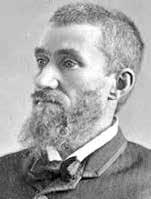
In the mid-1800s, Dr. Ignaz Semmelweis had proposed that dirt and unsanitary conditions could spread infections and that doctors should wash their hands and sterilize their instruments. This was a new idea that met with a lot of pushback from the medical establishment, who believed that hand-washing was a practice for peasants and laborers, not highly educated doctors. Semmelweis was humiliated and disgraced by his peers for his suggestions and died a broken man, but twenty years later, his ideas had begun to be accepted.
Dr. D.W. Bliss, who was brought in to treat Garfield, belonged to the old school of medicine. Bliss had a checkered past; he had fled the field of battle at Bull Run during the Civil War, abandoning the soldier he was meant to be treating, and later on, he was jailed for taking bribes while serving as the head of a government hospital. Still, Bliss was well connected and
Some of the more conspiracy-minded commentators have suggested that the closest parallel with Joe Biden’s situation may be Woodrow Wilson, who was president from 1913-1921, during the stormy years of World War I and the uncertain era that followed.
In 1919, during his second term as president, Wilson arrived back in Washington, D.C., after a strenuous tour of the Western states, trying to convince the American public to support his proposal to form a League of Nations. He suffered a massive stroke, which left him paralyzed and partially blind. With the president incapacitated and bedridden, Wilson’s team faced a quandary. Term limits had not been instituted yet, and the popular Wilson was seeking to run for a third term in the 1920 election. The stroke, however, had wrecked Wilson’s health, and with it, his ability to govern. Doctors who assessed him said that his judgment was off, he had very little impulse control, and that he was emotionally dysregulated. Even after months of recovery, he still had not come back to himself, Wilson’s wife Edith, along with a few close advisors, kept Wilson’s condition a secret from the public. They controlled what he saw and who he spoke to,
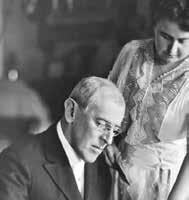
with Edith taking the lead. She effectively became a proxy for a significant amount of presidential power, and her decisions made a big impact on governance. When the Secretary of State was found to be conducting meetings without her or the president present, she had him fired. At a time when essential international negotiations about the League of Nations were ongoing, the First Lady refused to allow the British ambassador to see the president, because one of the ambassador’s aides had made disparaging comments about her. When reviewing proposals, she would add notes, and she would review classified information despite the fact that she had no security clearance or training.
Because of her outsize influence, some historians have called Edith Wilson the first female president of the United States. Her influence can be seen in the roles of Hillary Clinton and Michelle Obama, who despite having no qualifications other than being married to the president, sought to exercise their influence on American life via their husband’s role. Some commentators have explicitly compared Jill Biden to Edith Wilson, suggesting that she has become a shadow president behind her incapacitated husband.
Eventually, Wilson’s health problems became known to the public, and despite his desire to run for a third term, he was replaced by James Cox as the Democrat candidate for the 1920 presidential election. Wilson died soon afterward, in 1924.
For a brief time on November 22, 1963, the nation held its breath, waiting to see if the doctors at Parkland Hospital in Dallas, Texas, could save the life of the stricken young president. Ultimately, John Fitzgerald Kennedy succumbed to the assassin’s bullet, and the mourning nation was sent off on a radically different trajectory.
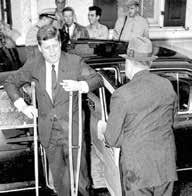
This was not the first time that Kennedy had been at death’s door. In 1954, when JFK was the junior senator from Massachusetts, he underwent back surgery after being told by his doctors that he was at risk of being paralyzed. The surgery led to an infection, and JFK’s condition deteriorated. He slipped into a coma, and in an eerie foreshadowing of his ultimate demise, the media alerted the nation that JFK was at death’s door.
JFK recovered from his 1954 scare, but the myriad issues that had caused it were concealed from the public. A central focus of JFK’s appeal, and his endur -
ing legacy, was his youthful energy and the vigorous aura he portrayed. Ironically, JFK was perhaps one of our most sickly presidents, riddled with a variety of health issues from the time he was a child. JFK had bouts of whooping cough, measles and scarlet fever that almost killed him. In 1947, at age thirty, he was diagnosed with Addison’s disease, a rare endocrine disorder where the body does not produce enough of essential hormones. At the time, doctors thought JFK would only live for another year; he maintained the optimistic hope that he could survive for another decade.
Addison’s disease weakened his body in many ways, and JFK simultaneously struggled with a variety of other ailments, one of the most consistently problematic being back pain. He was initially treated with steroids for back pain in the 1930s, which caused degeneration of his spinal discs. While president, JFK sought out the services of the notorious Dr. Max Jacobson, also known as “Dr. Feelgood.” Jacobson is -
Because of her outsize influence, some historians have called Edith Wilson the first female president of the United States.
sued vitamin shots to JFK, which actually contained methamphetamine, amphetamine, and powerful painkillers. Some historians have speculated that these powerful drugs, which are now illegal, affected Kennedy’s performance at the 1961 Vienna Summit, his first face-to-face meeting with the Soviet leader Nikita Kruschev. These meetings took place in the wake of the disastrous Bay of Pigs invasion and were a highstakes moment to discuss critical issues between the two countries at the height of the Cold War. JFK later criticized his own performance at the summit, and some have said that Jacobson’s treatments made JFK unfocused, irritable, and subject to wild mood swings. Later, when other doctors forced Jacobson out, Kennedy’s leadership skills and style improved noticeably.
“I want you to know that I will not make age an issue of this campaign. I am not going to exploit, for political purposes, my opponent’s youth and inexperience.” With this classic retort – emblematic of President Reagan’s signature wit – concerns about Reagan’s age (73, at the time) were largely deflected. Although Reagan and Biden could not be further apart politically, the issues faced by the current president are most closely paralleled by his conservative predecessor.

Just shy of 70 when he assumed office in 1980, Reagan was the oldest person elected U.S. president, a fact that his opponents harped on incessantly. After an uncharacteristically weak and gaffe-ridden performance in his first debate against Democratic challenger Walter Mondale in 1984, those concerns were heightened. In the second debate, Regan returned to form, eloquent and sharp, issuing the legendary quote about age being an issue in the campaign.
The 1984 election turned out to be one the biggest victories in Republican history, winning the electoral votes in every state besides Michigan, a landslide almost inconceivable in today’s political climate. In Reagan’s second term, criticism of his mental acuity continued. In 1994, five years after he left office, Reagan was diagnosed with Alzheimer’s, and many of his critics seized this as evidence that Reagan had been impaired while in office. That debate has continued until this day, with very little evidence to support it. Doctors who examined Reagan throughout his presidency found no signs of any dementia or Alzheimer’s; his cognitive tests were consistent with a man of his age and the copious documents that tracked his schedule while in office show that he always maintained a full slate of events. Ultimately, Reagan serves as a counterbalance to Biden: an old president can be one of the greatest of all time, despite unfair criticism, if he has the energy and the vision to lead and inspire.
Another president who parallels Biden is his opponent. Almost a full year older than Reagan when he first assumed office, Donald Trump has faced daily attacks of the sort that the media suppressed about Biden: being mentally unfit for the presidency. But where Biden comes off as vacant, slack-jawed, weak, and exploitable, Trump is accused of being aggressive, impetuous, unstable and unwilling to be influenced by “more reasonable” people in his circle. Lacking Reagan’s polished wit but possessing chutzpah in spades, Trump memorably rebuffs these criticisms by describing himself as “a very stable genius” and bragging about his report card grades from elementary school. Ultimately, Trump can point to the concrete evidence of doctor’s assessments and his palpably different energy level, which may prove to be the deciding factor in his return to the highest office in the land.


As the school year began to wind down, I became filled with mixed emotions that kept banging at my very filled anxious, churning brain.
I did expect a sense of separation from what I had loved my entire life to be hard, very hard. The reality of it is much harder than I thought it would be but not for the expected reasons.
Right now, it’s not about the work or the job but rather about the people. The conversations with colleagues are so poignant and heartfelt that when engaging in them, I cry and have to quickly disengage.
The line that I hear most often: “Thank you for giving me the courage and strength to take chances and to believe in myself.”
Yeah, for me, that’s a hard one to process.
At the first of the “good luck on your big move” parties, I refused to acknowledge that I was retiring. I was given three big scrapbooks filled with memories. I had proclaimed that I was not accepting anything as a gift that had to be put in a suitcase. I was adamant. No one cared; I was presented with a magnificent memory book filled with photos and letters.
Do you remember when there were real photo prints that were not scrolled down on a phone?
I was also given two big fat looseleafs filled with four years of my Reflections and a promise of a bound one that will be filled with the best 25. I wonder who chose those and which ones they are?
Two weeks later, I still cannot bring myself to read the sentiments. Just looking at the cover brings a huge lump to my throat. As I’m not ready, I will put the lot in my suitcase. And as it is my way, I will cherish the place that they have carved for themselves in my heart. I plan to comment privately to my dear colleagues – I won’t move on from these people I care about.
At this time, one week away from our flight, our house is filled with soon to be homeless furniture, stuff that will be accompanying us on the flight, stuff for the lift (a small one) and what is going to shluchim through an organization that picks up small household items, clothes,

By Barbara Deutsch

shoes and assorted stuff that people accumulate and then decide they don’t want or need. Actually, why has it ever part of their lives at all?
It’s called chesedcenter.com; they are pleasant, easy to work with and come when they say they will. We are happy that our no-longer-needed things have found new homes and are helping people who will use them.
when needy, only want new.
So what should happen to things that are still good but no one wants?
There can be comparisons made to people as well.
In these final and hectic weeks, as we prepare to leave our familiar and move onto adventure, there have been many speeches. When I am asked to speak, I try very hard to limit my comments to words
At this time, I find myself here, Cedarhurst, there, Israel, nowhere and everywhere.
We are loath to give away furniture that is in excellent condition and perfectly useful when the piece has served its purpose and is no longer needed. We want to get paid for it even though we have used it for years and years.
No one wants or has use for a perfectly good piano.
When we want to donate or give away useful things to people who are in need, we are insulted that they don’t want it, even though they need it and it’s free.
“I don’t need your junk!”
I was told that young couples, even
and ideas that will mean something to the audience. At the HANC goodbye party, I had so much to say but it was too hard to express the full scope of my gratitude to the wonderful people with whom I have worked these last 15 years.
I said what I said and thanked no one in particular. I probably will have more to share about this in the future; right now, not sure.
My dear friend and “like a daughter” Nicole married off her second child recently, a daughter. Not so long ago, Nicole lost her mother after a long struggle with ill-
ness. I determined that I would bring her mother to the sheva brachas, a disparate group of neighborhood, childhood and camp friends.
I started my remarks with a conversation about how we met in the gym. I am more than 25 years older than she is; we became part of a cohort that “worked out” daily, 5:00 am on the dot for her. Jan, Nicole, Debby, Autumn, Malkie and the other Malkie straggled in.
We were a motley crew with wide age differences between us. All of us wore baggy t-shirts, stretched-out sweats or skirts, everyone in top-of-the-line sneakers; we were athletes after all.
During Covid, the gym closed, and everyone led isolated lives in their homes. Nicole took it upon herself to take care of me and my husband Bob; she shopped, she shlepped and forbade us to leave the house.
Now I walk at 6:00 am – I’m older and need sleep – with another member of our group, Autumn. You can find us walking along the railroad tracks in the pre-sunrise darkness.
During my sheva brachas speech, I discussed Nicole, her relationship with her mother, her sister and our gym history. After my comments, a friend of Nicole’s and my son commented that he saw me walking early one day in my “gym” garb.
Afterwards, he called my son and commented, “I think I just saw a homeless woman walking. She looks a lot like your mom.”
It is me.
At this time, I find myself here, Cedarhurst, there, Israel, nowhere and everywhere. I need to be home, in Yerushalayim, and useful.
And useful.
Mrs. Barbara Deutsch is currently the associate principal at HANC 609 and a longtime reflective educator, parent, grandparent, and new great-grandparent. Even after all these years, she still loves what she does and looks forward to working with kids every single day.
By Yeshaya Kraus, LCSW
Ah, summer.
It’s a time when many parents wave goodbye to their children with a mix of wistfulness and relief. The school year is over, there are no more tests, homework, or finals to carry on or freak out about, and the kids will be away for a month or two to enjoy their well-earned (and well paid for) summer break. As responsible parents, we’ve done our due diligence in making sure our kids have the knowledge and insight needed to stay safe and are reasonably confident that they’re going to be just fine. They’ll have a great time, really. Don’t worry about them. They’ve left. Now what?
There are a few opportunities that present themselves in having even some of your children out of the house, which often fly under the radar. We’re creatures of habit, and unless we put some real thought into it, we’re likely to stick as much to the status quo as we possibly can. Status quo is nice; it’s comfortable. Holding on to it keeps us safe, balanced, and lets us go through life without having to think too much about what our next step is. When a natural break presents itself, though, we need to think about how to take advantage of it. It would be a shame to let it just pass us by.
One opportunity that comes from having kids away for the summer, or any extended period of time, really, is the chance to change the tone of your relationship with your children. Distance allows you to step back from your usual patterns. Inherent in the experience of being in camp is that, by necessity, a child has to handle things on his own. Whether it’s problem solving, logistics, or social issues, the child needs to develop a sense of “I’ve got this” in order to make it work. It’s one thing for a child to assume that role because she has to. It’s quite another to have a parent acknowledge that it’s going on and communicate that you trust your kid to do what’s needed. For a kid, there’s a real difference between “I’ve got this” and “I’ve got this and my parents believe in me enough to trust me with it.”
Let’s say you’re talking to your son once a week. You’re hearing all about what he’s

up to and what’s coming up. You’re not able to actually do anything to impact it or even help him in an immediate sense, though. By necessity, you’ve taken on the role of a bystander; you have to trust that he’ll be able to handle whatever happens. Depending on your relationship, that may not be such an easy thing to do. By consciously allowing yourself to take a back seat, acknowledging to yourself that he’ll be OK, and expressing that you believe he can handle it, you’re building trust. Barring circumstances where you really do have to get involved, for whatever reason, you’re creating a huge win for your child. Trust is implicit in sending your kid away. You can make it explicit.
Distance also gives you the opportunity to communicate more intentionally and mindfully. Living together on a daily basis can be a source of tension, at times. Some parents may react to or interact with their children in ways they’re not proud of. Even the best parents can be reactionary or irritable sometimes. This tension is usually rooted in everyday occurrences, like chores, homework, or other run-of-the-mill parent/child power struggles. If this is the case, you can take advantage of distance. The source isn’t there now, so you have the opportunity to step back from the old patterns of your relationship and approach it differently, with a little more thought. Though it may feel old-fashioned to some,
writing letters is a great way to carefully and honestly share what you want to share. You can be unwaveringly supportive, loving, and caring in a way that might not be as accessible to you when you’re dealing with day-to-day stressors of in-person life. The same is true with a weekly phone call. You can make note of things you want to share over the week or set aside some time to plan out how best to give support to your child while they’re away.
The focus shouldn’t be just on the kids who’ve left, either. If you’ve still got children at home, the smaller population gives you the opportunity to focus more on each child. Although this is a good idea during the entire year, you may find it easier over the summer to spend one-on-one time with each of your kids. It doesn’t have to be anything big. Just engage with them on their own interests. It could be a crafts project, taking a walk in the evening, or just playing a game and schmoozing. You can use the extra time you have to build a stronger connection. The absence of some family members may mean that the others are taking on new roles in the family system, with different responsibilities and privileges. You can use that to encourage them and build them up. If you feel it doesn’t make sense to focus on kids one at a time for whatever reason, you can plan family time. It’s not often as realistic or practical during the
school year, but the flexibility of a lighter schedule combined with fewer people at home can make it a strong possibility with long-term potential benefits.
Another opportunity that’s often overlooked is the ability to focus on your marriage more when some or all of your kids are away. Everyone talks about the need to be spontaneous in marriage or to create a sense of excitement. For parents of larger families, that’s easier said than done. Aside from the time and energy involved in actually parenting, there are multiple schedules, obligations, and general tasks to juggle just in order to keep everything running relatively smoothly. There’s that status quo we mentioned earlier. Although the kids leaving for a month or two doesn’t completely get rid of that, it may give you a little extra wiggle room to spend more quality time together as a couple.
There’s also value to using that time to spend time just relaxing on your own. Reconnect with a hobby or set aside time to discover something new. Again, it doesn’t have to be a big deal. Taking the time to think about it and move towards a goal can be an empowering experience, regardless of the scale. Honest self-care is severely underrated.
I’ve spoken with many people who have expressed the sentiment that the summer is a time when nothing changes for them. They’ll even get jealous of their kids who have a reprieve from the grind of the rest of the year. With a little bit of a shift in perspective, the summer can be a time of both relaxation and growth, even if it’s on a smaller scale than your kids.
Yeshaya Kraus, LCSW, is a therapist in private practice in Far Rockaway. He specializes in men’s mental health, parenting, relationships, and dating. He is also the creator of the Building Together workshop for engaged and newly married couples, and speaks publicly on a variety of topics, including dating and marriage. For inquiries or to register for the Building Together online workshop, email him at yykraus@gmail.com or WhatsApp at 917-412-5824.

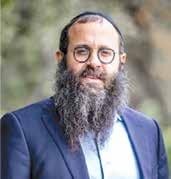
By Eliyahu RosEnBERg
t was a summer’s day in August of 1998 when young Chaim Danzinger found himself on a long car ride to Russia. It wasn’t eighteen-year-old Chaim’s dream destination – far from it, in fact – but his friend had convinced him to go, and so there he was.
There were many hours left of the trip until Chaim and his fellow counselors would reach the Russian camp where they planned to work for the rest of the summer. Thus, with perhaps some mixture of dread and hunger, Chaim, sitting in the cramped van, turned to his friend, Eli, and innocently asked, “Are we going to have any meals?”
In an instant, Eli pulled out three food items: a box of matzah with the year
“1994” written on it, a cracker that didn’t seem very appetizing, and a small jar of Manischewitz gefilte fish. That was the menu for the next twenty-four hours of Chaim’s life.
“We don’t have enough gefilte fish for everyone,” Eli announced to the counselors, “so half of you will get the gefilte fish and the other half of you will get the jelly in the gefilte fish.”
Chaim wished he hadn’t asked.
Nestled in the mountains of Russia, the summer camp that the group worked in was a place where young Russian Jews, who had little knowledge of their roots,
We’re shluchim in Rostov because the Rebbe taught us that you have to go out, not necessarily to the place that has the nicest beaches, the nicest city, or the best weather. you have to go where you’re needed.
The world was created so that there should be chessed.
one of the lessons that the Rebbe gave through the shlichus institution is that the best way to help yourself is to help others. The best way to go up spiritually is to help others to go up and you’ll automatically go up, too.
could receive a Jewish education. At the start of camp, these young boys knew nothing about Judaism. But at the end of the summer, something profound had awakened within many of the campers: for the first time in their lives, they had a deep yearning for Yiddishkeit. A change of similar magnitude, in fact, transpired in Chaim as well. At the beginning of camp, he wished he was someplace else, namely California. But by the summer’s end, the young counselor had fallen in love with the Jews of Russia; he didn’t want to leave.
One week after camp started, a fourteen-year-old boy named Dima walked into Chaim’s bunk.
“Chaim,” the camper said, with a sincere look in his eyes. “Ya khochu a brizania – I want a bris.”
Dumbfounded by the boy’s request, Chaim gave Dima a blank stare. The camper couldn’t possibly be serious. What sane fourteen-year-old boy would want a bris? So, he threw Dima a basketball, hoping to distract the kid for a while. The young boy went away for a little bit, but two hours later, the camper came right back into Chaim’s bunk and once again insisted, “Ya khochu a brizania.”
That night, Chaim brought the issue up at a staff meeting with his fellow counselors.
“We have a problem,” he told them urgently. “This fourteen-year-old boy wants to do a bris. I don’t know what’s going on.”
“Don’t worry. There’s no problem,” his friend and fellow counselor, Eli, calmly assured him. “On the last day of camp, a
mohel is going to come.”
Fast forward to the final day, and sure enough, a mohel came to the camp and appointed Chaim as sandek. On that day, three kids in Chaim’s bunk – who were not raised frum – courageously chose to have a bris.
“In the middle of the bris, I was holding his head, and I was looking at this boy who was having modern-day mesirus nefesh – modern-day self-sacrifice –to become part of the Jewish nation. And the next thing I knew it, I blanked out. I just fainted. They woke me up. It was too much for me,” Rabbi Chaim Danzinger recalled.
“Camp was over, and they [the campers] all went back to towns and villages that had no rabbis, no Jewish infrastructure, no shuls, no schools. And I couldn’t get back to myself. It changed me to my core. I witnessed Jewish children who were willing to sacrifice something to be a Jew.”
Growing up in Canada, young Chaim Danzinger never envisioned himself becoming a Chabad shliach or even a rabbi. But that summer sparked a deep passion within him and changed the trajectory of his entire life. Deeply inspired by the experience, Rabbi Danzinger returned to the camp year after year until he realized that the Jewish children of Russia deserve a much better camp experience. Determined to start a camp that was as good as the ones in America, he embarked on a mission, recruiting top staff members. And soon enough, Rabbi Danzinger was successful in creating a camp that would, in his words, “take things to the next level.”
Although Rabbi Chaim Danzinger and his wife, Kaila, shared the same dream of becoming shluchim of the Rebbe, his wife made it clear, before they got engaged, that moving to Russia was off the table. Her unwillingness to consider the move was, of course, a bit disappointing for the aspiring shliach, as he felt a deep connection to the Jews of Russia. But Rabbi Danzinger, out of respect for his wife, pushed his love for Russia aside and accepted that he wouldn’t be moving to the country any time soon. Instead, he and his wife headed to California to pursue a shlichus opportunity in Pasadena.
“One day, I got a call. I was talking to the chief rabbi of Russia, and I was being offered to move to a city called Rostov,” Rabbi Danzinger explained. “Now, usually, I wouldn’t even consider it because there was nothing to talk about; my wife didn’t want to move. But when I heard the name Rostov, it resonated with me.”
As Rabbi Danzinger explains, Rostovon-Don is a Russian city of unparalleled historical significance for two main reasons. First, it became a capital of Chabad in 1915 when the fifth Lubavitcher Rebbe moved there. And second, in 1942, the Nazis tragically invaded Rostov and massacred the city’s entire Jewish community, resulting in 27,000 deaths. Thus, not only was Rabbi Danzinger being offered a unique opportunity to lead a city that is central to Chabad’s history but to also revive Jewish life in a place devastated by the Holocaust. In 2008, when Rabbi Danzinger was offered the shlichus opportunity, 15,000 Jews lived in Rostov, but the city didn’t have a single rabbi. Thus, Rabbi Danzinger decided to speak to his wife about the offer.
“So, I spoke to my wife, and we had a long conversation. After the conversation, we kind of came to an agreement. I
said, ‘I know you don’t want to move there [to Rostov], but would you consider going there for two days, and then from there, we’ll continue to Israel on a paid vacation?’ And she agreed,” Rabbi Danzinger recounted.
Rabbi Danzinger arrived in Rostov on a Thursday with his wife and two-yearold son. On Shabbos, the city’s community gathered for a beautiful davening. After davening concluded, the congregants stayed at the shul, even though there wasn’t much of a kiddush.
“That’s when I learned for the first time that Russian Jews don’t come to shul on Shabbos for the kiddush. Why do they come to shul? To daven to Hashem. They come to shul to connect with their roots, to connect with one another,” he explained. “They sat there. They sat for two hours, asking questions. It was beautiful. I just felt like, ‘Wow, this is what I was missing.’”
After their two-day trip to Rostov, the couple spent some time in Israel and then returned to California. Upon arriving back home, Rabbi Danzinger waited anxiously to hear his wife’s verdict, but she wasn’t saying much.
So, he asked her, “What did you think of the trip?”
“Oh, I loved it,” she said with a smile. “It was so nice being in Yerushalayim again.”
“Anything else…?” he asked her, hoping she would say something about Rostov.
“Yes, of course. Thank you for convincing me to go to Chevron. I was worried it would be dangerous,” she responded, dodging the question again.
“Anything else?” he asked her once more.
“Yes,” she said, looking at her husband. “I realize that we’re more needed in Rostov. Let’s make the move.”

This article is based on a podcast, “Inspiration For the Nation,” hosted by Yaakov Langer. To catch more of this conversation, you can watch it on LivingLchaim.com or YouTube.com/LivingLchaim or listen wherever you listen to podcasts (just search for “Inspiration For The Nation”) or call our free hotline: 605-477-2100.
“Some people ask, ‘What does your wife think today? Is she happy there?’” Rabbi Danzinger said. “She’s very happy. In a Jewish family, the most important thing is shalom bayis . If my wife wasn’t happy there, I would not be there – there’s no question about it.”
It has been nearly sixteen years since Rabbi Danzinger and his wife Kaila became shluchim in Rostov. Since they made the move, they have launched several projects, providing humanitarian support to those in need and restoring Yiddishkeit to the city’s Jewish community, which now hosts a warm and thriving shul with daily minyanim, as well as services on Shabbos and Yom Tov.
One of the couple’s most notable efforts has been in helping individuals with special needs and their families. Having founded the first Jewish special needs organization in Russia, Rabbi and Rebbetzin Danzinger, with help from volunteers, provide support to children
with special needs through a variety of programs, including a phenomenal summer camp for children with disabilities and their mothers. The couple has also started several programs to support elderly Jews in Russia. Together with his wife and children, Rabbi Danzinger continues to this very day to be inspired by the warm and selfless Jews of Russia.
“We’re shluchim in Rostov because the Rebbe taught us that you have to go out, not necessarily to the place that has the nicest beaches, the nicest city, or the best weather. You have to go where you’re needed,” Rabbi Danzinger explained. “And what I could tell you today is that we’re not inspiring the Jews of Rostov. I don’t know if we’re even teaching them. I think we’re being inspired by them. We’re learning from them. Their amount of self-sacrifice, their willingness to go out of their comfort zone, of going above and beyond – that is the inspiration.”

Moderated by Jennifer Mann, LCSW of The Navidaters

My husband and I agree on most things when it comes to my brother-in-law’s shidduchim, but there was one thing that recently that we had polar opposite opinions on. Since we always read your column, we thought we’d send it in and see what your panelists think.
My brother-in-law (33, single) has never dated a woman older than him. He claims it’s not the way it’s supposed to be done and would feel weird. In the meantime, he’s dated hundreds of women (literally!) and has come to a standstill in his suggestions because either they’ve already dated or met already. I told him that he should definitely broaden his age range and date older than him. My husband agrees with his brother and thinks that’s a crazy idea. I would love to hear about what you think.
Thank you! Tamar*

Rebbetzin Faigie Horowitz, M.S.
While I agree that dating women who are a bit older is appropriate, I would be more concerned about something else. If he has dated hundreds of women by the age of 33, broadening the pool of available women is probably not the answer. There may be other issues he needs to resolve that are holding him back. Encouraging him to go into therapy and have a series of deep conversations with a capable mentor would be more helpful. Looking within himself with honesty and doing the work is work. It’s a lot easier to find a “fix” such as dating women who are biologically older. If you think you can encourage him to speak to someone, do so with sensitivity and wisdom. Respect him and respect your role.
Michelle Mond
Age is just a number. Age is just a number. AGE IS JUST A NUMBER!
I would shout this from the rooftops if it wouldn’t be socially inappropriate. I have seen guys marry girls older than them so many times, and guess what? They are just as happy as those guys who have married younger. I don’t know what it is with the frum community specifically and this “guy must be older than girl” trend, because in society at large age is truly not much of a factor at all. The one and only excuse I’ve heard with dating women over a certain age is fertility, but with modern medicine, even that excuse gets debunked.
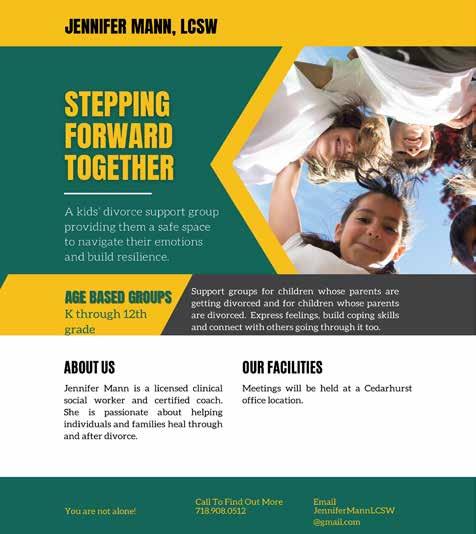
For those like your brother-in-law I implore you to check out our amazing “single” Tzipora Grodko’s Instagram page. On her page, she highlights real couples with their real stories. Many of these stories highlight this exact fact –of age being just a number. It also highlights the reality that going out of one’s comfort zone is very often where a single will find his or her yeshuah.
I applaud you for taking care of your brother-in-law and caring about his dating life. After all is said and done, though, he is his own person and will make his own decisions. If he is very influenced by your husband, I would encourage your husband to encourage his brother to step out of his comfort zone on this one.
Keep us posted if there’s any good news!
Tzipora Grodko
Age is truly nothing but a number. Experience can age someone and a lack of maturity can misrepresent age. Other than fertility, I don’t believe age holds much relevance when trying to connect to another person unless there’s generational differences due to a large age gap, etc. Of course, you can give the debate of a lifetime and your brother-inlaw may choose to not budge.
When trying to invite change and insight, it’s always best to challenge the “listener” with a question to invite insight rather than preach. Preaching = Defensive due to one’s self-esteem feeling challenged. Questions welcome curiosity in a non-threatening manner.
Dr. Jeffrey Galler
I t sounds like your brother-in-law has been very successful at dating
Your brotherin-law has been very successful at dating but very unsuccessful at finding a life partner.
but very unsuccessful at finding a life partner.
Of course, expanding the size of the pool of available women might be helpful. If he’s only dated younger women, he should try dating older women. If he’s only dated tall women, he should try dating short women. If he’s only dated blondes, he should try dating brunettes. If he’s only dated New York women, he should try dating Californians. And so on.
However, what in the world makes you think that the results would be any different?
There are only two possibilities here:
Possibility #1 is that among the hundreds of women that he has dated, he has actually found some that he’s liked, but they have rejected him. If so, he may need assistance in making himself more likeable or more attractive.
Possibility #2 is that among the hundreds of women that he has dated, he has never found anyone suitable for a long-term relationship. If so, he may have to consider that his fantasized, idealized image of a suitable life partner is a fiction that simply does not exist.
And, if so, he might be ready for the next phase of life, when he decides to abandon his unrealistic expectations, decides that it’s time to settle into the joys of a happy marriage, and decides that he’s ready to be a responsible father rather than merely a loveable uncle.
Dear Tamar,
We’re all certainly entitled to date whom we want to date. While I do tend to be on the side of following one’s own intuition, I also believe in having an open mind, going outside of our comfort zone, challenging our core beliefs when they don’t compromise our values and ethics, and trying something new.
Tamar, you’re a wonderful sister-inlaw for writing into a column on behalf of your brother-in-law. Since you are showing the column to him, I’m going to address him directly. Dear Brother-in-Law, Not only do I think you owe it to
yourself to consider dating older women, but I encourage you to explore why you are against it. Where did this idea come from that you must date women your age and younger? Did you learn this anywhere? What would it mean to you on a deeper level to be with a woman a bit older? Do you have any concerns or fears?
Also, while it is a huge possibility you simply haven’t met your bashert, is it also a possibility that something more is going on. “Hundreds” of women is a lot of women. I am wondering if a few sessions with a dating coach might be helpful. And if that isn’t hitting the spot because the content runs a bit deeper, then I suggest seeing a therapist.
may have
to consider that his fantasized, idealized image of a suitable life partner is a fiction that simply does not exist.
Jennifer Mann, LCSW is a licensed psychotherapist and certified trauma healing life coach, as well as a dating and relationship coach working with individuals, couples, and families in private practice at 123 Maple Avenue in Cedarhurst, NY. To set up a consultation or to ask questions, please call 718-908-0512. Visit www.thenavidaters.com for more information. If you would like to submit a dating or relationship question to the panel anonymously, please email JenniferMannLCSW@gmail.com. You can follow The Navidaters on FB and Instagram for dating and relationship advice. He
Wishing you all the best. Sincerely, Jennifer

By Sara Rayvych, MSEd
Welcome to summer! The kids are officially transitioning from school to camp mode. These in-between times are hard, and kids can be thrown off during this period. Be gentle on yourself and your child.
It’s also a hectic time, and parents have many things on their mind. Whatever your child’s summer plans, there are many necessary preparations. Whether it’s clothing, snacks or summer gear, there is so much to do and too few hours to accomplish it all.
Each season brings its own excitement and challenges. As we begin the hotter weather, it seemed prudent to review some basic safety issues. Kids are young and excited about the warm weather.
They may not take the necessary precautions to ensure their own safety. As the loving adults in their life, it’s our job to be proactive and keep them safe.
Keeping hydrated is one of the basic rules of survival. It’s also one that kids neglect as they’re running around outside getting that amazing fresh air and sun.
Sending along a reusable water bottle helps keep H2O ready. It would seem obvious that if you provide a water bottle then a child will drink from it. Sadly, this is not a realistic assumption, and parents need to verify their child actually had some sips. Hydration can be easily assessed by urine color. Dehydration is seri-


ous, and if you have any questions please reach out to a medical professional.
It’s wise to write your child’s name on their water bottle. Most water bottles look similar, and it’s not uncommon to find rows of water bottles lined up and nobody knows which is theirs. The AAP considers water superior to sports drinks. Please consult your child’s pediatrician about the role of Pedialyte or electrolyte drinks.
The sunshine is exciting but burns are dangerous and need to be addressed by a physician. Please ensure your child has full protection, even when the sun doesn’t feel strong. In addition to sunscreen –which must be reapplied throughout the day and after water – children can wear longer, loose clothing and a hat to stay covered. Be careful about ears that peek

out from baseball hats. Rashguards have become common and can protect children while swimming. While on the topic of swimwear, it’s worth mentioning that bright colored bathing suits are more visible than darker suits under water, ensuring your child is easily seen at all times.
Children require constant supervision around water and should only swim with a lifeguard present. Water should not be kept unattended in baby pools or anywhere that it can be accessed by others.
I’ve been pleased to see the increased usage of helmets. Baruch Hashem, children no longer need to be concerned with being teased for basic safety measures. Helmets should be considered mandatory for those riding skateboards, bikes and scooters – especially electric models.
I’ve noticed an alarming but bizarre trend of children wearing helmets with the chin straps unfastened. Alternatively, the straps are closed but very loose. In either scenario, the helmet is not securely on their head and where it needs to be to protect them. If the helmet can easily fall off or be pushed aside, then it’s not truly on. Children often need an adult’s assistance to ensure it’s on properly and
being used correctly each ride.
Traditionally, bikes and scooters worked based on human effort. Today, we have electronic models that not only require minimal human input, they also go exceedingly fast. These carry an increased risk, and parents need to carefully consider whether this item is appropriate for their child.
Walking down the street in the main shopping area, I was suddenly confronted with a teenager riding their motorized bike or scooter towards me. Fortunately, the rider made sure to swerve before reaching me, frightening us in the process. This has happened on a number of occasions. It’s not only unsafe, it’s a true lack of derech eretz.
Sidewalks are meant for pedestrians. It’s where we push babies in strollers and little ones walk holding their parent’s hand. It’s not intended for vehicular traffic. Children and teens should not ride bikes or scooters in crowded pedestrian areas – certainly not motorized ones. They should be taught how to safely maneuver their bikes and pass a pedestrian when that inevitably occurs.
School is out, and more kids are walk-

ing around town. Please drive extra cautiously and always be alert for children in the vicinity. Children may dart out from between cars or chase an errant ball. While it’s the parent’s responsibility to provide proper supervision for their youngster, we all need to do our part.
Teach children how to safely cross the road. This includes older children who may be distracted by a phone or other item. Children should cross at crosswalks, certainly not from between cars since a driver cannot see a child that is behind a vehicle. Children mimic adult behavior. If they see us dashing between cars or crossing against the light, we risk them doing the same.
The temperature inside a vehicle rises very quickly. Infants and children should never be left in cars. We’ve all heard of the many tragedies with “forgotten baby syndrome.” Rather than careless neglect, this mostly occurs when a parent has a change in schedule or is distracted. In many of these tragic situations, it occurred when the parent that doesn’t normally bring the child to daycare was given the job and they accidentally followed their normal routine, forgetting the child in the car. Babies and toddlers often fall asleep in cars and may not even be aware their parent is exiting
the vehicle. Similarly, children shouldn’t play in cars. It’s not a toy and requires an adult’s presence.
There are many methods parents can use to remind themselves of their precious passenger in the back. Suggestions include placing something in the back seat that you routinely take out of the vehicle with you, such as a purse or left shoe (right shoe is used for driving), always checking the front and back of the vehicle, or leaving something such as a diaper bag or stuffed animal in the front seat whenever your child is present. It’s easy to think that only a negligent parent forgets a child, but it’s important to remember this has mostly happened when a child’s presence in the car was not part of the normal routine.
While there are necessary precautions for parents to take, the summer is the perfect time to get out and enjoy Hashem’s beautiful world. It’s a time to create warm memories and connect with family. Have a wonderful summer!
Sara Rayvych, MSEd, has her master’s in general and special education. She has been homeschooling for over 10 years in Far Rockaway. She can be contacted at RayvychHomeschool@gmail.com.

Often overlooked, water is one of the most critical components of our health, helping to maintain bodily functions, enhancing our physical performance, and supporting our overall well-being. Although it’s important, many individuals do not consume enough water daily, ultimately leading to dehydration and potential health risks. Keep reading to learn the significance of hydration along with attainable ways to ensure sufficient water intake.
Let’s delve into water and its role in the body. Water makes up around 60% of the human body, helping the body function properly, with every cell, tissue, and organ depending on it. These are some of the roles that water has on our bodies.
Cellular Function: Water plays a crucial role in cellular processes, transporting nutrients within cells and to cells. More so, water helps maintain cell structure and helps with chemical reactions.
Regulating Temperature: Through sweating and respiration, water helps to regulate body temperature. Water absorbs and dissipates heat, helping the body stay cool and preventing overheating.
Digestion: For proper digestion, water is key in dissolving nutrients and helping to make them ready for absorption. Additionally, it helps with metabolism, helping to convert food into energy.
Joints: Water helps lubricate our joints by reducing friction and wear. Specifically, water is essential to help maintain and prevent joint-related issues.
Furthermore, there are endless health benefits of water and staying properly hydrated. These benefits impact both our physical and mental health.
Performance: Physical performance can be impaired by dehydration, leading to reduced endurance, decreased strength, and fatigue. To reach optimal athletic performance and maintain adequate energy levels, keeping hydrated is imperative.
Cognitive function: Even slight dehydration can affect our concentration,
By Tehila Levine-Soskel, RDN, CDN

mood, and memory. Mental clarity and brain function is supported by adequate water intake.
Weight: Staying hydrated and drinking enough water can help with weight management. It helps increase our satiety and reduces the chances of overeating. Swapping water for high-calorie beverages is one way to contribute to your health.
Skin: Healthy and radiant skin can be attributed to those who stay well hydrated. Water helps reduce the appearance of fine lines and wrinkles by maintaining skin elasticity.
inadequate fluid intake, illness, or other factors. Being aware of the signs of dehydration is key, as well as taking preventative measures. Symptoms of dehydration include thirst, dry tongue, dry lips, fatigue, dizziness, lightheadedness, reduced urine output, muscle cramps, and other negative health factors.
Preventative measures to ensure you are properly hydrated are as follows. Firstly, make sure you have regularly drink water. You can do so by making a
Incorporating hydrating foods into your diet is another way to increase your water intake.
Digestion: Water helps support the function of the gastrointestinal tract, preventing constipation.
Kidneys: Proper hydration is crucial to maintain kidney function, reducing the risk of kidney stones and other infections.
Dehydration occurs when the body loses more water than it has, whether from
habit out of it. Carry a water bottle around with you as a reminder to stay hydrated. Drink when you first wake up and throughout the day. Don’t wait to start drinking towards the end of the day.
Incorporating hydrating foods into your diet is another way to increase your water intake. Fruits and vegetables like cucumbers, celery, watermelon, strawberries, tomatoes, lettuce, cantaloupe, oranges, and
zucchini all contain high water content and can be included in your diet.
Coffee and alcohol are considered diuretic beverages, meaning they can increase your fluid loss. Limiting the amount of coffee and alcohol you drink can also help you stay better hydrated. Focus on water being your main choice of beverage. Setting reminders to drink more water, whether through alarms or reminders on your phone, can help you be more mindful to drink more.
Certain groups of people may require specific attention to hydration. Firstly, those pregnant and nursing have increased water needs to help support both mother and baby. Secondly, children may be more susceptible to dehydration, especially during the warmer weather. Parents should remind and ensure kids are drinking frequently. Older adults are at a greater risk for dehydration due to adipsia, which is the reduced thirst sensation, and other health conditions. Regular water intake encouragement in this population is key. Lastly, athletes need to watch their hydration levels and may benefit from electrolyte drinks to help replenish.
Hydration is an integral aspect of our health that should not be neglected. From supporting cellular function to enhancing cognitive and physical performance, water plays an essential part in maintaining overall well-being. Even just mild dehydration can impact your mental and physical health. By familiarizing yourself with the signs of dehydration and engaging healthy habits to promote water intake, you can ensure you’re helping meet your body’s hydration needs.
Tehila Soskel is a registered dietitian nutritionist with a private practice in the Five Towns. She sees clients for weight loss, diabetes, and other various diseases. Appointments can be made for in-person or virtual sessions: 516-457-8558, tehilasoskelrd@gmail.com, tehilasoskelnutrition.com.


By Rebbetzin Faigie Horowitz

1. Garden together. Till and sow flowers and/or veggies as a team, whether separately in both your homes or together in one place. Plant at the same time and see whose seeds sprout first. Remember that you can plant seeds from your kitchen (think avocados, tomatoes, beans). You don’t have to go out and buy supplies. Take photos, of course, and compare notes. You may want to compost, plan for the next season, and talk about gardening experiences of the past.
2. Take a bug walk at night or during the day. Grab binoculars or magnifying glasses and your phones. Capture photos or draw them in pads with pencils. When you get home, look up the creatures you found. Another time you can paste the facts and interesting drawings in a scrapbook. Mementos of experiences together are worth investing the time.
3. Make individual layered salads with dressing at the bottom of clear
cold beverage cups with lids. Stick a disposable spoon in the slot where you normally insert the straw. They can be taken outside to the deck or porch. This is a great activity for those long Shabbos
5. Joke-a-thon: This one is for a rainy day and works well with middle schoolers who love jokes and riddles. Make sure to have post-its in different colors. Each kid gets a different color
Mementos of experiences together are worth investing the time.
afternoons before shalosh seudos when everyone is sick of freeze pops and ice cream.
4. Play museum. You can be the director. A curator can draw frames on your driveway or patio. Other kids can be artists and draw portraits or landscapes. Give the exhibit a name such as “Treasures from the Berger Brood.”
and writes down riddles and jokes and posts them all over your house (except for on fine furnishings and art). Each kid can prepare five. Other kids need to collect one of each color and guess the riddle at the joke-a-thon after fifteen minutes. Then you play the role of judge and award points for each response on the basis of originality, correct guess,
or great connection with the placement. Then give prizes or hold a raffle for participation.
6. Make sukkah decorations together using unusual supplies and original craft kits. Use beads, glittery pipe cleaners, paper cuts, stencils, beans, scrapbook paper, and washi tape. Have all materials laid out in a makerspace that you have created at a table covered with a disposable plastic tablecloth. Save the leftovers for your next crafting activity.
7. Create scrapbooks from their mementos from the school year. Make sure to have blank books and materials available. Ask the grandchildren to bring over their knapsacks and detritus from their rooms. Their mothers will bless you for the clutter removal.
JWOW! is a community for midlife Jewish women which can be accessed at www.jewishwomanofwisdom.org for conversation, articles, Zoom events, and more.




The second annual JFood Show was held at the New Jersey Convention and Exposition Center in Edison, New Jersey, on Tuesday, June 18. The event split the day into two halves where the first half was more like a trade show for those in the kosher food industry, while the second half was open to consumers who were able to buy tickets to sample all of the products.
The event featured a food court with a buffet for guests, speeches given by people in
By Nati Burnside
the kosher food industry, panels about different topics, and more. The show is evolving year by year, and next year might bring even more attractions to the table.
But this article is more focused on what was there this year. If you couldn’t make it out to the show, here are the top five things that I had, along with a little information that might give you a metaphorical taste of what it was like to be at the show.
Hey, I can’t bring you an actual taste. Metaphorical is the best I can do.


A few years ago, Moshe Chaim Weiss had a regular job.
“I had been sitting in an office for too long, and I’d always loved cooking,” said the now chef/owner of Chef Mocha Catering. “I saw a chance to start something, and I took it.”
It’s been two years now since Weiss started his company, and he’s starting to get going in the catering business. He’s been doing small simchas all over the tristate area, and word is starting to spread that his food and service are really great.
The sesame chicken he brought to JFood Show was a big hit
with everybody passing by. A little different than most sesame chicken dishes you might have previously had, this version featured slightly smaller pieces of chicken (and therefore a crispier product), and a sauce with probably more sesame seeds than you’ve ever seen.
Weiss said that his sesame chicken is his top dish – he brought it to the food show because he wanted to make a good impression on the crowd by sharing his best stuff.
While he’s only doing fleishig events so far, Weiss hopes to expand to milchig dishes also in the future.
Frozen foods have been slowly getting better and better over the last few years. In the kosher food business, one of the brands that has recently been at the forefront of that has been Elite Gourmet.
Started by Yaacov Yusupov three years ago, Elite Gourmet offers about 20 different products that are all pretty much in the same vein. Yusupov had been working in the food industry before he started Elite Gourmet, and he saw that there was an opening for a specific line of high quality frozen foods like ravioli and tortellini.
Elite Gourmet now carries dairy, meat, and pareve versions of ravioli and their new line of arancini. That means everything from cheese, to vegetables, to meat, and even combinations of those (well, not combinations of dairy and meat, obviously).
The Elite Gourmet station is always a busy one, but this time,
it was busier than ever. The new line of arancini drew tremendous attention, and all of the samples were gone in just a couple of hours after the show began.
“I guess they were more popular than we thought,” Yusupov said about their newest creation. “Maybe next time we need to bring a lot more product!”
The arancini had a good outer crust. The inside had a nice texture with the combination of rice, cheese, and sauce. Other flavors included an identical one without the sauce and a pareve one with just mushrooms and rice.
Elite Gourmet is looking to get into whole frozen meals as their next step. With a great demand for high quality, ready to eat frozen food, Elite Gourmet can be found in kosher supermarkets all over the country.

You probably don’t need a real introduction to Meal Mart. They’ve been around since 1947 and produce tons of products that are probably used by almost every kosher-keeping family in America.
But while Meal Mart could stick to all of the products they already make, instead, they are always trying to add more options. One of the ways that they try to accomplish that is by following the trends in the kosher community.
As you might have seen, charcuterie and meat boards are rising in popularity. After checking with the providers of the boards, Meal Mart decided to make three new products.
One of those is their new prosciutto. Right now, it comes only in bulk packaging for food service providers like deli counters or


those making charcuterie and meat boards, but if it takes off, they might make smaller packages for retail in the future.
The top reason that they chose prosciutto is that it’s fairly difficult to make. That means being able to purchase it will save those board providers a good deal of time and effort. If the sales go well, the company will look into making other types of meat in the future.
“We brought the prosciutto to the show to raise awareness that it’s now something we offer,” said David Benscher, national sales manager for Meal Mart. “Our goal is to provide items that make it seem like you spent a ton of time making them.”
The prosciutto was that perfect balance of salty and fatty and had an amazing beefy flavor. It’s available along with the new pepperoni and dried salami to food service providers nationwide.
One of the most common trends at JFood Show this year was the increasing number of gluten-free products. But most of those were items that you could easily tell were gluten-free.
That was not the case when it came to the products at the table for Pure Bakes by Danielle.
Danielle Kimmel is the owner whose name you’ll find on the package. She had to go gluten free for health reasons seven years ago. At the time, she could cook, but she couldn’t bake. Her longing for the high-end desserts of her past life led her to start trying to make her own gluten-free versions.
Three years later, she had made a ton of progress and decided to start her business. She now has 40 products available online that can be shipped nationwide, and her products are in supermarkets
all over the tristate area.
“We want to expand all over the country so that everyone can enjoy high quality kosher desserts whether they are gluten free or not,” said Kimmel about her plans for the future.
All the products are gluten-free and pareve, and that includes the salted caramel cookie dough cup. It’s a thin layer of chocolate on both top and bottom with caramel flavored cookie dough sandwiched in between. The caramel flavoring is there for two reasons. The first is that caramel flavor hides the almond taste that is used to keep everything pareve. The second is that the peanut butter cups were so popular that Kimmel decided to add another type of cup.
Given how great the taste was, she clearly knows what she’s doing.
Jack Setton’s uncle always made beef jerky as a hobby. Being exposed to it at a young age made it something that he was used to – it was a regular part of his life, so much so that when he went to Israel for the year, he packed a dehydrator.
That’s when he first started doing it as a business. He set up the dehydrator on the porch and started making beef jerky himself. After all, it’s easier than packing your uncle.
After he came back to America, he thought about making his hobby into a real company. It was a big decision, but he had the background to make it happen.
“I figured if I put myself behind it 100% that I could make it into a real business,” Setton said about his decision.
But he’s not trying to make just another kosher beef jerky company. His goal is to grow into a more mainstream product that you might find in regular supermarkets.
Setton decided to bring his honey-garlic flavor to JFood Show because his metrics say that it’s the most popular product, and he wanted to appeal to as wide an audience as possible. The flavor is a great mix of sweet and spicy, and the jerky has a texture that isn’t too dry or sticky.
Three years in, Setton has five flavors of dried salami, nine types of jerky, and four artisan cuts in his repertoire. His products should be available in kosher supermarkets all over the tristate area shortly, so get ready to look out for them on your next shopping trip.

By Naomi Nachman
This recipe is from my friend Yocheved Gross (owner of Hair and Blush Academy), who is a fabulous cook. This stuffed eggplant is so versatile, so feel free to make it your own! Whether you serve it as an appetizer or main, it’s sure to be a winner.
◦ 12 mini purple eggplants
◦ 4 tablespoons avocado oil
◦ 1 large onion, finely diced
◦ 6 cloves garlic, minced, or 6 frozen cubes
◦ 1 pound extra lean chopped meat
◦ 2 tablespoons fresh parsley, cleaned and chopped
◦ 2 teaspoons fresh basil, cleaned and chopped
◦ ¾ teaspoon kosher salt
◦ ½ teaspoon fresh black pepper
◦ 1 red bell pepper, finely diced
◦ 1 yellow pepper, finely diced
◦ Chopped chives, to garnish
◦ Prepared techina, for serving

Prepare the Stuffed Mini Eggplants with Techina
1. Preheat the oven to 350°F. Cut the mini eggplants in half, keeping the stems intact. Scoop out the eggplant flesh, reserving the skins, and dice finely.
2. In a skillet, heat the oil. Add the onion and garlic and sauté in the oil until cooked through. Add the diced eggplant and sauté until soft. Add the meat and sauté until all the liquid is evaporated and the meat begins to brown. Remove from the heat and break up the meat with a fork so that there are no large chunks.
3. Combine the meat and eggplant, parsley, basil, salt, and black pepper. Spoon the mixture into the eggplant skins and sprinkle with the diced red pepper. Transfer the stuffed eggplants to a greased baking dish and bake, covered, until the eggplants are completely soft and cooked through, at least an hour and a half to two hours.
4. Before serving, garnish with the chopped chives. Top with techina.
Naomi Nachman, the owner of The Aussie Gourmet, caters weekly and Shabbat/ Yom Tov meals for families and individuals within The Five Towns and neighboring communities, with a specialty in Pesach catering. Naomi is a contributing editor to this paper and also produces and hosts her own weekly radio show on the Nachum Segal Network stream called “A Table for Two with Naomi Nachman.” Naomi gives cooking presentations for organizations and private groups throughout the New York/New Jersey Metropolitan area. In addition, Naomi has been a guest host on the QVC TV network and has been featured in cookbooks, magazines as well as other media covering topics related to cuisine preparation and personal chefs. To obtain additional recipes, join The Aussie Gourmet on Facebook or visit Naomi’s blog. Naomi can be reached through her website, www.theaussiegourmet.com or at (516) 295-9669.

This column features business insights from a recent “Mind Your Business with Yitzchok Saftlas” radio show. The weekly “Mind Your Business” show – broadcasting since 2015 – features interviews with Fortune 500 executives, business leaders and marketing gurus. Prominent guests include John Sculley, former CEO of Apple and Pepsi; Dick Schulze, founder and Chairman Emeritus of Best Buy; and Beth Comstock, former Vice Chair of GE; among over 400+ senior-level executives and business celebrities. Yitzchok Saftlas, president of Bottom Line Marketing Group, hosts the weekly “Mind Your Business” show, which airs
at 10pm every Sunday night on 710 WOR and throughout America on the iHeartRadio Network.
Since 2015, Yitzchok Saftlas has been speaking with leading industry experts on the “Mind Your Business” show, sharing insightful business and marketing strategies.
In this article, we’ve gathered tips from five creative leaders on how to channel your creativity to produce content that expresses yourself while truly connecting with your audience.

Linda Kaplan Thaler, Advertising Hall of Fame i nductee and President of Kaplan Thaler Productions
In order to connect with an audience, you really need to get inside their heads. For example, one of my first big accomplishments in advertising was writing the “I don’t want to grow up” Toys R Us jingle. I knew the ad had to be a song, because it needed to be the kids who retained the message, not the parents. The kids were going to be the ones who nagged their parents to buy their Barbie at Toys R Us, as opposed to any other store. So, I started writing the song, but I couldn’t get it right. I said, “I’ve got to think like a child. Could somebody bring me a toy piano?” Now, I have a master’s in music. I can certainly play a regular piano, but using the toy piano helped me get in the range that a little kid would sing in. It was that mindset that got us to the final jingle. Virtually overnight, kids started singing it everywhere. I remember that it had only been on TV for a week, when I overhead a four-yearold girl singing it on her way to the bus stop. Her mother said, “If you don’t stop singing that song, you’re never going make it to school on time.” I knew we had a hit. Decades later, kids around the world can still sing the song to me in their native languages. That was my first realization that to understand your audience, you have to know who they are and get into their headspace. In this case, it was about getting into the headspace of a little four-year-old kid. It was about bringing out that inner child that still resides somewhere within all of us. If you can truly channel your audience, you’ll be able to connect with them on a profound level.

c re AT e Yourse LF
c ountry Yossi, noted Musician and r adio Personality
As a creative person, you have to create yourself. Don’t let anybody try to mold you into something that they want you to be. You’ve got to look deep inside yourself to discover who you are and what your strengths are. Everyone is imbued by G-d with a certain talent. You have to find out what yours is and use it. And I don’t just mean to use it to become rich or famous, but to use it to find and fulfill your G-d-given purpose. It won’t be easy. You have to be shtultz; you need a strong backbone. No matter what setbacks you encounter, you need to keep trying. Don’t give up. It doesn’t matter how many times you fail. You’re not truly a failure until the moment you decide not to get back up. You can get knocked down many times in a fight, but if you get back up, you’re still in the fight. As you try again and again, taking different approaches, you will discover exactly who you are and where your strengths lay along the way. But, you have to be willing to try new things and to not be afraid.
It was about bringing out that inner child that still resides somewhere within all of us.

c re AT ive dic Ho T oMY
Ari Boiangiu, o wner of Blue Melody Group
The moment a creative person gets offered that first dollar to share their art with the world, a tremendous dichotomy grows. Making a living through creativity raises the questions: what am I doing this for? And what do I have to do to my art, to present it in a way that’s going to help me make a living?
This is something that you will have to take on a case-by-case basis. Of course, things go much smoother when the client is able to just put his trust in the artists that he hired and say, “You guys are great, we know you’re great. So, just show us why you’re great and do your thing.” That kind of client takes away any doubts that you will have to compromise on your creativity. However, this is often not the case. You have to remember that art is only one side of the coin. The other side is customer satisfaction, and it is just as important if you want to make a living through your creativity. Our job is to make the customer happy. As a musician, if a customer wants to give me an absurd set list, a bunch of obscure songs that I have to learn or anything else that’s outside of my wheelhouse, that’s just something that I’ll have to work on. Because, there’s a special level of service and customer satisfaction when you can do those crazy things for your client. So, you need both sides of the coin. You need to be able to express your unique creativity, while also keeping in mind what the client is looking for.

Posi T ioninG Yourse LF
s teve c ohen, Acclaimed Professional Magician
When I met positioning expert Mark Levy, I told him that I was trying to think of a stunt that would put me in the public eye. But, Mark told me, “You don’t need a stunt. You need to drill down into who you are and figure out what it is about you that’s unique and different that we can then promote. Take David Blaine, he’s known as the street magician. Penn and Teller are considered the bad boys of magic. They have these hooks that people can latch on to.”
And so, he did an interview with me, and after all kinds of data analysis, he realized that I perform mostly for the well-to-do crowd. No one had ever claimed to be a magician specifically for the very rich. Around that time, I was featured in a magazine that said, “Steve Cohen is the millionaire’s magician. He performs for A-List celebrities and members of country clubs.” Mark said, “That’s it. You’re going to be known as the Millionaire’s Magician from now on.” I thought it sounded ridiculous, but he said, “You have to go all in on this, Steve.” Everyone else said not to do this, because I was going to alienate my audience. But Mark told me, “If you can’t turn away the $2,000 gig, you’ll never get the $20,000 gig.” And he was right.
Once I started branding myself as the millionaire’s magician, the media ate it up. They just took that name and brand at face value, and my career snowballed from there. That’s the power of creative and niche positioning.

shifra Mendelovitz, President of Act2 i nteriors
Design can be a much more powerful tool than people realize. Well executed designs can drive productivity, ROI for your business, and even overall happiness.
We were once called in to redesign the interior of a middle-range residential building. The management company warned us that tenants were very unhappy, constantly complaining, and many were leaving, leading to a lot of vacant apartments. After we finished our work there, the super came to me and said, “I just wanted to tell you that I am having the best time now. No one is complaining. I’m not getting any more angry calls. Everyone is happy. People are ringing my bell every day to ask for apartments, but we don’t have any left. All those vacancies have been filled.” So, how did a redesign cause such an attitude shift with their tenants? When people don’t feel good about their surroundings, they will be much more likely to find things to complain about. But with a pleasing interior that is designed to make them feel good, they will suddenly find themselves much happier, and their complaints just don’t feel quite as important anymore.


Leaders said that thousands of children were going to die, and it didn’t materialize, and no one seems to be trying to explain why.
- David Adesnik, senior fellow and director of research for the Foundation for Defense of Democracies, talking to Fox News about the dreaded famine that experts said would take place in Gaza which never materialized

This party should not in any way do anything to work around Ms. Harris.
– Rep. Jim Clyburn (D-SC), longtime Black political kingpin, warning Democrats not to skip over Vice President Harris, if Pres. Biden bows out of the race
The fact that people keep coming back to this is so offensive to so many of us. They still don’t get that the message you’re saying to people, to this Democratic Party, is, we prefer a white person.
- An anonymous Democrat operative talking to Politico about rumors that someone other than Kamala Harris will be the Democrat nominee if Pres. Biden drops out of the race
The experts told us Joe was fine. The experts told us to take the vax. The experts told us the laptop was fake. The experts told us the border is secure. The experts told us 2020 was the MOST legitimate and secure election in history. Remember who the propogandists are. Never trust any of them again.
- Tweet by End Wokeness
To prepare for the debate, the President has been sequestered since last week. He doesn’t mind – he thinks that he’s a juror on the O.J. trial.
– Greg Gutfeld, Fox News
We’re successful, we’re debt free, we own everything. Why have people who are having a hard time paying their rent pay more for our drink? Maybe it’s my little way to give back.
- Arizona Iced Tea founder Don Vultaggio on the Today Show, explaining why the brand’s tall cans are still only 99¢

Democratic officials have tried to spin this in many ways. But behind the scenes, make no mistake, most Democratic officials witnessed the same shocking spectacle that you did: the difficulty that the presumptive Democratic nominee, the current president of the United States, had just articulating his basic thoughts during the 90 minutes of the debate.
- Debate moderator Jake Tapper, CNN
I decided to travel around the world a couple of times…shortly before the debate. I didn’t listen to my staff…and then I almost fell asleep on stage.
- Pres. Biden at a fundraiser giving an excuse for his abysmal debate performance
Just like the Hunter laptop incident, like the freakouts over every lost Supreme Court decision, like the concocted “ethics” problems of Supreme Court justices, like the entire Russia collusion hoax, the Biden coverup is rationalized in the name of decency.
– David Harsanyi, The Federalist
[Biden] was so bad that Jimmy Carter watched the debate and said, “Wow, that guy’s almost dead!”
It was so bad that Nanci Pelosi’s face unfroze.
It was so bad that Vladimir Putin denied poisoning him.
It was so bad that Anthony Fauci blamed it on bat soup.
It was so bad that ABC sent grief counselors to The View.
It was so bad that even Kamala Harris is worried that Kamala Harris may become president.
- Greg Gutfeld, Fox News
When will politicians, or at least the intern who runs their account, learn that lying on this platform doesn’t work anymore?
- Elon Musk responding to Kamala Harris tweeting that Trump would ban abortion nationwide

I fully support the prime minister’s idea that he can never allow a permanent ceasefire [if] Hamas is allowed to be functional. That’s my red line on that.
– Sen. John Fetterman (D-PA), at a press conference with Prime Minister Netanyahu in Israel
I could never support Israel being bullied into an artificial kind of permanent ceasefire against an enemy like Hamas.
- Ibid.

While a new career as a firefighter might not be in the cards for Bowman, an unemployment application is. We wish him all the best of luck and good riddance.
- National Republican Congressional Committee spokesman after Jew-hater Congressman Jamaal Bowman (D-Bronx/Westchester) – who several months ago pulled a fire alarm in the Capitol in order to stop a vote from taking place – was defeated in the primaries
BREAKING NEWS!!! Jamal Bowman wins renomination. Oh wait…false alarm.
- Tweet by Rep. Dan Crenshaw (R-TX)
The Congressional seat in the Bronx and Westchester was not “won.” It was bought.
– Tweet by Climate Defiance, after Bowman lost
Maybe if you wanted to fix the climate, you wouldn’t be [upsetting] the people who control the weather.
– Reply by Kyle Beckley
For once, Jamaal Bowman can actually blame the Jews for something real.
- Stephen L. Miller
We’ve lost our minds completely. With our own hands, we are rehabilitating Gaza, before disarmament, and mainly the hospitals, which are the centers for terrorism. Mr. Prime Minister, stop this foolishness. This time, it won’t be possible to say that we didn’t know.
- Finance Minister Betzalel Smotrich, after Israel restored electricity to Gaza
He won a few prizes for being stupid including a chauffeured ride to a local medical facility to check his injuries before arriving at his less than luxurious accommodations at Ivey’s Iron Bar Lodge!! At the lodge, he was given a freshly washed 2 piece ensemble to get comfortable in, before being shown to his sleeping area in our open floor plan.
- Facebook post by the Brevard County (FL) Sheriff’s Office after a 66-year-old beat up a 29-year-old who tried stealing his truck

The individual who is responsible for a heinous criminal act is the criminal.
- Homeland Security Secretary Alejandro Mayorkas when asked if the open border bears responsibility for the heinous murder of a 12-year-old girl in Houston by illegal aliens
I don’t know what Mayorkas is smoking because it needs to be legalized.
- A Border Patrol source to The New York Post after Homeland Security Secretary Alejandro Mayorkas argued that there is vetting at the border
I think they shouldn’t include anyone of that caliber — a wife beater, murderer. I can’t imagine why they would include someone like that.
- Fred Goldman, whose son was killed by O.J. Simpson along with Nicole Brown, condemning BET for including a tribute to Simpson at their awards show

By David E. Sanger and Farnaz Fassihi
With the rest of the world distracted by wars in the Gaza Strip and Ukraine, Iran has moved closer than ever to the ability to produce several nuclear weapons, dramatically bolstering the speed at which it can produce nuclear fuel in recent weeks inside a facility buried so deep that it is all but impervious to bunker-busting bombs.
The sharp technological upgrade goes hand in hand with another worrisome change: For the first time, some members of Iran’s ruling elite are dropping the country’s decades-old insistence that its nuclear program is entirely for peaceful purposes. Instead, they are publicly beginning to embrace the logic of possessing the bomb, arguing that recent missile exchanges with Israel underscore the need for a far more powerful deterrent.
In interviews with a dozen American, European, Iranian and Israeli officials and with outside experts, the cumulative effect of this surge appears clear: Iran has cemented its role as a “threshold” nuclear state, walking right up to the line of building a weapon without stepping over it.
U.S. officials are divided on the question of whether Iran is preparing to take that final step or whether it will determine it is safer — and more effective — to stay just on the cusp of a weapons capability, without openly abandoning the last of its commitments as a signer of the Nuclear Nonproliferation Treaty.
Most officials spoke on the condition of anonymity because so much about Iran’s nuclear program, from assessments of its status to secret efforts to infiltrate and slow it, is highly classified.
And they caution that while Iran could now produce the fuel for three or more bombs in days or weeks, it would still take considerable time – maybe 18 months – for Iran to fabricate that fuel into a warhead that could be delivered

on missiles of the kind it launched at Israel in April.
But Iran’s nuclear expansion comes at the most delicate of moments.
The Iranians are acutely aware that the United States is determined to avoid a broadening of the conflict in the Middle East, and there have been back-channel messages between Washington and Iran to underscore the dangers. The Iranians themselves, one senior administration official said, know how much they have to lose if the war spreads.
Yet as one European diplomat involved in discussions with Iran put it, if the Iranians had been enriching uranium at current levels just a few years ago, when the region was not such a tinderbox, Israel would almost certainly be considering military options to strike Iran’s nuclear facilities.
Prime Minister Benjamin Netanyahu of Israel, who came right to the edge of ordering such action on several occasions in the past, has said little about Iran’s recent buildup, preoccupied by the war with Hamas in Gaza and the risk that it will spread to open conflict with
Hezbollah on the border with Lebanon. There are now indications from Israeli officials, however, that they are focusing anew on Iran’s recent advances.
They are also focusing on the change in the way Iran talks about its long-running nuclear program, which Israel –sometimes with the active participation of the United States – has tried to cripple in recent years.
As Iranians prepare to go to the polls Friday to elect a successor to President Ebrahim Raisi, who was killed in a helicopter crash last month along with the foreign minister, top Iranian officials have dropped the ritual assurances that Iran has only peaceful uses in mind for its nuclear program. One official close to Iran’s supreme leader recently declared that if Iran faces an existential threat, it would “reconsider its nuclear doctrine.”
Israel’s defense minister, Yoav Gallant, raised Iran’s nuclear surge in meetings this week with Secretary of State Antony Blinken, Defense Secretary Lloyd Austin and CIA Director William Burns, people familiar with the meetings said.
In April, Iran had fired hundreds
of missiles and drones at Israel, most of which Israel intercepted. But the attack, which was retaliation for an Israeli strike that killed several Iranian armed forces commanders at Iran’s embassy compound in Syria, was a serious escalation. The Iranians most likely emerged from the experience determined that the country needed a more potent deterrent, U.S. officials and outside experts have concluded.
“Iran is sending a clear message that if the pressure of sanctions continues, if assassination of its commanders continues and if Washington or Israel decides to tighten the noose, it will then break all the chains,” said Hossein Alizadeh, a former Iranian diplomat who defected in 2010. He spoke from Britain, where he now lives.
According to independent estimates based on production statistics from the International Atomic Energy Agency, which still has limited access to Iran’s facilities, the country has now enriched enough uranium at 60% purity – which can be converted to bomb-grade fuel in days or weeks – to make at least three weapons.
David Albright, a nuclear expert, said in an interview that once Iran finishes installing the new centrifuges in Fordo, its underground facility, Iran should be able to double that inventory in a matter of weeks or months.
Even though it would still take more than a year to actually produce a weapon, the question is whether U.S. or Israeli spy agencies would detect the move and be able to stop it.
In a statement issued Monday, the United States, Germany, Britain and France underscored the dangers.
“Iran is growing its stockpile of high-enriched uranium to levels unprecedented for a state without a nuclear weapons program,” the countries said, adding that “such activity has no credible civilian justification.”
Facilities Left in Place, and a Deal Abandoned
The last time Washington felt it faced a true nuclear crisis with Iran was 2013, when President Barack Obama dispatched Burns, then a top State Department official, and Vice President Joe Biden’s national security adviser, Jake Sullivan, to explore the possibilities of a deal with the newly elected Iranian president, Hassan Rouhani.
Burns and Sullivan – who today, in very different roles, remain key players in the decision about how to deal with Iran’s expanding capabilities – emerged with a six-month deal to restrain the Iranian program in return for billions of dollars in sanctions relief. An acrimonious on-again, off-again negotiation followed for a permanent deal, and one was struck in the middle of 2015.
Under its terms, 97% of Iran’s nuclear fuel was shipped out of the country to Russia, which at the time was working alongside the United States, the European Union, Britain, France, Germany and China to keep Iran from obtaining a weapon.
But there was a weakness in the deal, acknowledged by negotiators at the time.
Iran insisted that it had to hold onto its major enrichment facilities, resisting American and European demands that they be dismantled. So the underground facility at Fordo remained, spinning nonnuclear material – a concession that the lead U.S. negotiator referred to at the time as a “bitter pill.”
So did the main enrichment site at Natanz, which is much closer to the surface and easier to destroy. (Iran is now building a deep-underground facility at Natanz, but it will not be ready, U.S. intelligence officials estimate, for several years.)
While the U.S. and Israeli air forces often practiced what it would take to bomb Fordo, even building a mock-up of the site in the Nevada desert, military officials say it would take repeated, precise strikes by the U.S.’ largest “bunker buster” to reach down that deep.
For all the recriminations nine years ago from Republicans in Congress about the nuclear agreement, Iran initially stuck to its terms, limiting its production to token amounts of nuclear fuel. IAEA inspectors came and went with regularity, and while there were arguments about reconstructing the history of Iran’s past activities, the agency’s cameras provided a 24/7 eye on the chain of custody of Iranian fuel.
And, largely out of the sight of inspectors, Iran developed its new IR-6 centrifuges, able to produce fuel far faster than the old IR-1s that it struggled with for years, preparing for the day when, under the provisions of the agreement, it could install the new machinery.
Then President Donald Trump abandoned the 2015 accord. He argued that the reimposition of sanctions would break the Iranian regime and predicted that the country would beg for a new deal.
Trump was wrong on both counts. The Iranians slowly began reactivating the plants. They removed some cameras and banned some inspectors. And they began enriching to 60% purity – putting the country far closer to bomb fuel than when Burns and Sullivan were sent off for secret negotiations 11 years ago.
An effort by the Biden administration to reconstruct the key elements of the deal collapsed in 2022. Rafael Grossi, the director general of the IAEA, said after a recent trip to Tehran, Iran, that the 2015 deal that Trump pulled out of is now dead.
“Nobody applies it, nobody follows it,” he told a Russian newspaper recently. “There have been attempts to revive it here in Vienna. But unfortunately, although they were relatively close to success, they failed for reasons unknown to me.”
Iran has insisted that it cannot manufacture or use nuclear weapons because of a 2003 “fatwa,” or religious edict, issued by the country’s supreme leader, Ayatollah Ali Khamenei. The country said the fatwa remained in effect even after Israel stole, and then made public, a huge archive of Iranian documents that made plain the country was trying to design a weapon.
U.S. officials say there is no evidence of a current effort to weaponize Iran’s near-bomb-grade uranium; Israelis argue that such efforts are indeed underway, under the guise of university research.
For Iran, the risks of moving to weaponization are high. While Iran has removed or deactivated some of the IAEA’s cameras, it is clear that the program is deeply penetrated by Israeli, American and British intelligence services.
The cat-and-mouse game with inspectors and Israeli and Western spies
has been going on for years. But the recent nuclear expansion can be traced to the missile launches in April, when Iran and Israel went to the brink of war.
Soon after, three senior officials with close ties to Khamenei began declaring that Iran’s no-weapons doctrine was reversible if the country faced an existential threat. (Shiite Islam allows clerical scholars to reverse edicts and fatwas to reflect the demands of current times.)
The officials were Kamal Kharazi, an adviser on foreign policy to Khamenei and a former foreign minister; Abbas Araghchi, a prominent diplomat who served as deputy foreign minister and a nuclear negotiator for the 2015 nuclear deal with world powers; and Gen. Ahmad Haq Taleb, a member of Iran’s Revolutionary Guard who serves as the commander for protecting and defending Iran’s nuclear sites.
If Israel threatened Iran’s nuclear facilities, Haq Talab said in a speech in mid-April, “it’s entirely possible and imaginable that the Islamic Republic will reconsider its nuclear doctrine and policies and reverse its previously stated positions.”
A few weeks later, Kharazi told Al-Jazeera that Iran had the capacity
to produce a nuclear bomb but that it has not decided to do so.
“If Iran’s existence is threatened, we will have no choice but to reverse our nuclear doctrine,” he said.
And in late May, Araghchi said at a conference in Doha, Qatar, that Israeli attacks “could force others to rethink their security calculations and their nuclear postures.”
The statements seemed coordinated, or at least a reflection of the debate taking shape within Iran’s power circles about whether it was time to weaponize the nuclear program and build a bomb, according to four Iranian officials, including diplomats and members of the Revolutionary Guard. All were privy to the continuing strategic debate.
Sharp divisions remain, but “at this point, many Iranians are starting to believe and say out loud that building nuclear deterrence, given all the threats we face, is not just a military strategy,” said Mehdi Chadeganipour, who served as an adviser to former President Mahmoud Ahmadinejad. “It is pure common sense.”
© The New York Times


It was obvious nearly a year ago that President Biden shouldn’t run for a second term. In an August 2023 poll by the Associated Press, 77 percent of the public and 69 percent of Democrats said he was too old to be effective for four more years.
Yet Biden and his inner circle persisted, driving on toward Thursday’s disastrous televised debate, which vividly portrayed the failings the country had already detected.
How did this happen? What was the combination of moral conviction, personal confidence and selfishness that propelled Biden, despite the risks, toward his decision to seek another term?
I have an unusual window on Biden’s march toward the precipice. In September, I wrote a column headlined “President Biden should not run again in 2024.” It shouldn’t have gotten as much attention as it did, because it said no more than what many Democrats were mulling through last summer. But perhaps because I have been a strong supporter of most of Biden’s foreign and domestic policies, this call for him to step aside created a stir.
In the months after that column appeared, I have talked regularly with people close to Biden about why he stayed in the race. Their comments help explain the path to Thursday night – and illustrate too how Biden’s inner circle will be crucial now in encouraging him to step aside and let someone else take on former president Donald Trump.
Biden’s main reason for running again was that he felt, in his gut, that he could win. He loathes Trump – you could see the contempt animating that otherwise-frail demeanor Thursday – and it’s been his political mission to stop Trump and his MAGA rebellion. He did it twice, in the 2020 election and the 2022 midterms, and he thought he could do it again. Most
By David Ignatius

important, he believed there was no one who could do it better.
Biden might have considered withdrawing if Vice President Harris was more popular than he was – running 10 points ahead of him in polls, say. But Harris hasn’t gained traction as vice president, and Biden knows it. Some say Biden deliberately sidelined Harris; I think her shortcomings reflect her own political weakness. But the fact is that Biden had no obvious heir.
Perhaps paradoxically, Biden might also have stepped aside if Trump hadn’t run. He could have said he had achieved his political quest of vanquishing Trump – and opened the way for a younger generation of leaders. But Trump’s successful primary campaign almost guaranteed that Biden would stay in.
Biden’s family has played a central role, especially his wife, Jill. When my column appeared last September, I was told by people who know the Bidens well that the president was angry but that the first lady was irate. She’s his protector and advocate – always. His children, Hunter and Ashley, would probably have been
comfortable with him stepping aside. But even after Thursday night’s dismal performance, you could see Jill Biden onstage at a “victory” party clapping and leading a chant, “Four more years!”
Loyalty is admirable, except when it disserves people we love. President Lyndon B. Johnson’s wife, Lady Bird, knew the strains he was suffering in office and his fragile health. She talked with him about not seeking another term as he was being inaugurated in 1965, and he confided to her in 1967 that he had decided against running the next year, though he kept waffling until his announcement in March 1968.
Biden’s inner circle of aides has also been protective – to a fault. Biden is a stubborn and sometimes-irascible man. He has maintained a remarkably disciplined White House, with few leaks and minimal backbiting. But loyalty and discipline can come at a cost. In the days after my column argued that he should step away, I heard rumblings of agreement among insiders, but they were quickly squelched. Discipline prevailed.
What’s especially painful about the
Biden story is that he has been in most ways a very good president. The biggest lie Trump told Thursday was his portrait of the country as a ruined mess. The economy is strong, the United States is working seamlessly with an ever-closer set of allies in Europe and Asia, and our global financial, military and intelligence dominance has rarely been clearer. Biden has been effective despite the obvious signs of stress. He has also remained a decent man. That’s his valedictory, if he could accept it. I noted in September that Biden should understand that he has achieved what he described in his 2021 inaugural speech: “When our days are through, our children and our children’s children will say of us: They gave their best, they did their duty, they healed a broken land.” Biden did just that.
Biden’s closest counselors – political adviser Mike Donilon, former chief of staff Ron Klain, the first lady – have an obligation to be honest with him now. If he has the strength and wisdom to step aside, the Democrats will have two months to choose another candidate. It will be a wide-open and noisy race, but that will be invigorating for the country. It’s never too late to do the right thing.
Thursday night had the sense of an ending. There was something Shakespearean about the gaunt, haunted face of Biden on stage squinting as if to see in a dwindling light, often struggling for words even as the nobility of his purpose remained. I was reminded of a passage in “King Lear,” when Edgar advises his struggling father, the Duke of Gloucester, “Men must endure their going hence, even as their coming hither; Ripeness is all.”
But an ending is also a new beginning. That’s what Biden, with the wisdom of his age, can give to the country.

Here’s how our border mess could become an election-year nightmare:
Imagine that hundreds of Tajik migrants from Central Asia enter the United States through a smuggling network that the FBI subsequently discovers might have links to the Islamic State-Khorasan terrorist group. Some of the migrants are arrested nearly a year after they entered the country, but many still have not been located.
In our scenario, the FBI scrambles to find what could be a ticking ISIS-K time bomb. It uses wiretaps and sting operations to locate recent arrivals who may have some connection to the Islamic State spinoff. But it’s playing catch-up. The Department of Homeland Security’s inspector general reports that the agency lacks the vetting tools it needs to identify and stop migrants with possible terrorist connections at the border.
Folks, this isn’t a hypothetical. All of these details are real. Intelligence officials haven’t found evidence of an organized ISIS-K plot against the homeland. But the awful truth is that they don’t know what’s out there. America, with its porous border, is vulnerable to the stream of people who enter the country every day.
FBI Director Christopher A. Wray has been delivering hair-on-fire warnings about this problem for months. His latest came in June 4 testimony to a Senate committee: “Increasingly concerning is the potential for a coordinated attack here in the homeland” such as the March attack by Tajik members of ISIS-K that killed 139 people at a Moscow concert hall.
In early June, the FBI and DHS arrested eight Tajik migrants in New York, Philadelphia and Los Angeles. The operation, aided by FBI wiretaps, was first reported by the New York Post. The paper said that at least one of the suspects had slipped
By David Ignatius

into the country across the Mexico border more than a year ago. Surveillance showed that some of the Tajiks had used “extremist rhetoric,” according to CNN.
“Rather than risk the worst-case scenario of a potential attack, senior U.S. officials decided to move in and have the men apprehended,” CNN reported.
Concern about the ISIS-K threat grew earlier this year when the intelligence community received new information that more than 400 Central Asian migrants had entered the United States through a “human smuggling network” potentially connected to ISIS, according to NBC News. Because of what one official told me was “extra caution,” about 150 of these “persons of interest” have been arrested, but about 50 haven’t been located, the network said.
This flow of Central Asian migrants is a new headache for DHS. Officials estimate that about 40 people from that region cross into the United States every day, and that there are now “tens of thousands” of undocumented migrants here from Tajikistan, Uzbekistan, Afghanistan and other Central Asian countries. Most are economic migrants arriving through
smuggling networks that operate using social media, cheap travel, transit through layovers in Europe - and then easy entry into the United States.
The big gap in the system is that DHS lacks the tools to vet potentially dangerous migrants seeking asylum at border points of entry. It needs more people and resources to query classified databases and use biometric data. Despite the lessons of 9/11, intelligence agencies remain wary about sharing highly classified information without secure facilities, which are lacking at most border posts.
A scathing report on the lack of vetting tools was issued June 7 by DHS Inspector General Joseph V. Cuffari. “The Department of Homeland Security’s technology, procedures, and coordination were not fully effective to screen and vet noncitizens applying for admission into the United States,” he wrote.
“Until the Department addresses these challenges,” Cuffari continued, “DHS will remain at risk of admitting dangerous persons into the country or enabling asylum seekers who may pose significant threats to public safety and national security to continue to reside in
the United States.” DHS did not dispute Cuffari’s findings or his recommendations for improvements.
The core problem is that border enforcement has become a political football rather than a law-enforcement and national-security problem. A divided Congress won’t approve the spending DHS needs for additional people and updated systems. And despite a 2004 law that requires intelligence agencies to share counterterrorism information, DHS “could not access all Federal data necessary to enable complete screening and vetting of noncitizens seeking admission into the United States,” according to the inspector general’s report. DHS doesn’t have the technology to collect biometric data at land crossings, and the Defense Department won’t share all its biometric data, the report found.
The asylum backlog is crushing. The DHS report calculated that 54 percent of 762,432 asylum cases filed between 2017 and 2023 weren’t resolved within 180 days, with some taking up to five years to adjudicate. Among the stalled asylum cases, 620 involved “potential national security concerns,” the report said.
The Biden administration tried to pass bipartisan border-security legislation this year, but it was derailed by former president Donald Trump – who evidently prefers blaming Democrats for the border mess to trying to fix it. President Biden finally issued an executive order this month imposing greater controls. But rather than making a forceful call to action, Biden did it quietly, over protests from progressive interest groups.
A solid, well-policed border is an essential condition of public safety. I pray that Biden doesn’t find out in the next few months just how dangerous our lack of bipartisan border policy could be.
© 2024, Washington Post Writers Group
By Avi Heiligman

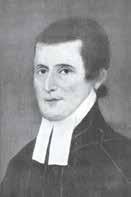


The basics facts about the American Revolutionary War that are taught in schools pretty much follow the same storyline. Patriots in the Thirteen Colonies were upset about the British rule, especially with regards to taxes, and decided to take up arms to drive out the British. The British weren’t too happy about the rebellion and sent troops to the colonies. Fighting started in 1775 with the Declaration of Independence being ratified on July 4, 1776. General George Washington became the commander of the Continental Army and had some victories as well as a few defeats until British General Cornwallis’s surrender at Yorktown in 1781. This led to the Treaty of Paris in 1783 with Britain acknowledging American independence. The war officially ended with the treaty, and in 1787, George Washington became the first president.
While these basic facts are correct, there are a lot of details and heroes that get overlooked in this short version.
The armed conflict began in April 1775 with colonial militia fighting the British at Lexington and Concord. They managed to push back the British to Boston – the phrase “the shot heard around the world” is attributed to the battle. The Battle of Yorktown was the last of the fighting of the war. British forces stayed in Charleston and Savanah until late 1782.
Fort Knox, Kentucky, was named after Henry Knox who witnessed the Boston Massacre in 1770. He tried to diffuse the situation but was unsuccessful. Five years later, the 25-year-old former bookseller joined the army and impressed General Washington who had come to command the army during the British siege on Boston. Knox, who was soon commissioned as a colonel in the army, realized that cannons from recently captured forts could be used to break the siege. He proposed his plan to Washington who, in turn, made him in charge of transporting the cannons over 300 miles over mountains and frozen rivers. It took six weeks to transport the cannons as they fell through the icy rivers, but the men transporting the cannons recovered them and pressed forward. They reached the heights that Washington had captured, and this forced the British to move their fleet from Boston. Knox was then chosen as Washington’s chief artillery officer, was the logistical mastermind behind the famous crossing of the Delaware River, and was very active in the victory at Yorktown. He later became the first Secretary of War for the United States.
Around 2,500 Jewish families were living in colonies in the 1770s, and about 100 of them joined the American cause for independence by taking up arms. Francis Salvador was the first Jewish
soldier to be killed while fighting the British. Born in London to a Sephardic Jewish family, he moved to the colonies and owned land in South Carolina in a district called Ninety Six or “Jew’s Land.” He soon became involved in the Revolution and was elected as a delegate to South Carolina’s Provincial Congress. Salvador was the highest-ranking Jew in the state, and he pushed for the colonies to become independent of the British.
The British riled up Native Americans to fight the colonists, and Salvador rode 30 miles to warn colonists of the danger.
The “Southern Paul Revere,” as Salvador is sometimes called, joined Major Andrew Williamson as he led a militia of 300 men to fight off the attack that also included British Loyalists. On August 1, 1776, the Americans were led into an ambush, and Salvador fell wounded into the bushes. He was found by the Indians, scalped and died of his wounds a short while later.
Baltimorean Reuben Etting heard about the Battles of Lexington and Concord and signed up to fight against the British. Unfortunately, he was taken prisoner and when the British heard he was Jewish only gave him pork to eat. He refused to eat it and survived off of scraps from other prisoners. After abuse and mistreatment by the British, Etting was released from prison but died shortly thereafter.
Not all war heroes wore uniforms, as was the case of Abigail Minis. Born in 1701 to an Ashkenazi Jewish family, Minis soon moved to the colonies with her husband Abraham and was given land in Georgia by the governor. Her husband died in 1757, leaving her to run the large plantation while caring for her eight children. During the Revolutionary War, Abigail fed and financially supported American troops who endured hardships throughout the Siege of Savannah. After Savannah fell to the British, she moved to South Carolina but not before bringing food to Jewish war hero and prisoner of war Mordecai Sheftall.
The American patriots that fought the British for their freedom during the Revolutionary War will be remembered as heroes. Not all of their stories are known to the general public, but their sacrifices allowed the United States to become an independent country. July 4 has become a day for parades, barbeques and fireworks to celebrate American independence as well as a time to reflect on the heroes of the past who have made America what it is today.
Avi Heiligman is a weekly contributor to The Jewish Home. He welcomes your comments and suggestions for future columns and can be reached at aviheiligman@gmail.com.

MAJOR APPLIANCE REPAIR
Servicing Washers , Dryers , Refrigerators , Dishwasher, stoves
All work guaranteed. Call 718 3762288
VACUUM SALES AND REPAIR
All areas call Max Flam 718-444-4904
THE LEATHER SHOPPE
The spot for all your custom leather Judaica. Tallis/tefillin bags, lulav and esrog bags, havdallah sets, challah covers, shtenders, pesach sets, matzah/afikomen bags. WhatsApp: (732) 523-0007 or email: theleathershoppe732@gmail.com for a full catalog. We ship.
MY MOTTO IS DON’T WAIT TO buy real estate
Buy real estate and wait Your realtor for life 516-784-0856 Alexandra at Realty Connect USA
PEACEFUL PRESENCE STUDIO
Men’s private yoga, Licensed Massage & Holistic Health Guidance 436 Central Ave, Cedarhurst Info. & free video training www.peacefulpresence.com 516-371-3715
GERBER MOVING
FULL SERVICE MOVING
Packing Moving Supplies
Local Long Distance. Licensed Insured 1000’S Of Happy Customers Call Shalom 347-276-7422
HANDYMAN AVAILABLE
For big or small jobs, Sheetrock, carpentry, painting, electrical, plumbing, install & repair appliances Call Ephraim at 347-593-4691
MANAGEMENT STAFF WILL ASSIST you with: * Obtaining Medicaid and Pooled Income Trust
* In-home Assessments, Individual and Family Counseling
* Securing reliable home care assistance
* Case and Care Management services
Dr. S. Sasson, DSW, LCSW (718) 544- 0870 or (646) 284-6242
HAIR COURSE:
Learn how to wash & style hair & wigs. Hair and wig cutting, wedding styling Private lessons or in a group Call Chaya 718-715-9009
ZEVIZZ WOODTURNING JUDAICA Challah knifes, batei mezuzah, besamim holder, kiddish cups, havdalah candle holders, yad for sefer torah, pens, stenders, bowls and more 952-356-2228

Torah Academy for Girls is seeking an experienced Administrative Assistant to calmly and efficiently manage our exciting Early Childhood department. The ideal candidate will possess excellent organizational skills, a keen eye for detail, and the ability to handle multiple tasks with a calm demeanor. Responsibilities include managing schedules, coordinating meetings, and providing administrative support. If you thrive in an exciting setting, we'd love to hear from you. Competitive salary offered. Apply today to join our team!
Please send resumes to openings@tagschools.org
DON’T GET STUCK WITH A TWO STORY HOUSE YA KNOW, IT’S ONE STORY BEFORE YOU BUY IT BUT A SECOND STORY AFTER YOU OWN IT! Call Dov Herman For An Accurate Unbiased Home Inspection
Infrared - Termite Inspection Full Report All Included NYC 718-INSPECT Long Island 516-INSPECT www.nyinspect.com
Don’t miss this opportunity!
4 Bedroom 21/2 Bathroom House Perfectly located in Cedar Bay Park, walking distance to all.
Oversized property for expansion, A Must See.
LOCATION, LOCATION.
For More Info call (516) 881-7727 Leave Message
WOODMERE
Introducing a stunning 14-side hall colonial home in the Hewlett Woodmere School District. Formal living room, formal dining room, den with a skylight. Eat in Kitchen, two sinks, a double oven, a warming draw and a microwave. First floor bedroom, a full bathroom and laundry room. Two-car garage. Upper level has four bedrooms, two full bathrooms. Finished basement with playroom, storage and utilities. Well-groomed exterior with porch adjoining the master bedroom. Hardwood floors and back patio. Central air conditioning, inground sprinkler system, alarm system. Close proximity to schools, shopping centers, restaurants, and transportation options. Mark Lipner Associate Broker Berkshire Hathaway Laffey International 516-298-8457 mlipner@bhhslaffey.com
WOODMERE
Beautiful, brick, colonial boasting 5 bdr 3.5 Bth in pristine condition. Excellent location, near all! Move right in! RCUSA 516-512-9626

CAN’T AFFORD YOUR PROPERTY TAXES?
MORTGAGE?
Must sell for any reason? Call for FREE Consultation. Call now 212-470-3856 Cash buyers available!
Spacious home within school district 14 with exquisite upgrades and central air conditioning, splendid kitchen with dual sinks, five bedrooms. Main level encompasses a spacious great room, office space, complementing the formal living and dining areas. Unfinished basement, detached garage. Expansive lot, measuring 80 x 100. Conveniently located near shopping, railroad, restaurants and places of worship.
Mark Lipner Associate Broker Berkshire Hathaway Laffey International 516-298-8457 mlipner@bhhslaffey.com
FAR ROCKAWAY
Two family house with 3 rentals
Recently Renovated 995k Cash Only Deal Call 646-523-4458
COMMERCIAL REAL ESATATE
Entrance off gourmet glatt lot, second floor, shared bath, ideal for therapist/ office work, includes utilities, $600. Call 516-371-3715
1500SF LOFT OFFICE
(formerly Shmuel Flaum Architect)
2 store/offices; ~600sf each 2 Cedarhurst offices; ~100sf each Starting at $650
Also… Large Parking Lot & Storage available Utilities, Internet & Parking incl. with some Kosher kitchen – Minyan Next to LIRR - No broker fee Call/text/Whatsapp: 516-206-1100

BIG FULLY RENOVATED, Woodmere, spacious 4bedroom 2 full bath split level.2 car garage +driveway. Backyard on water SD#14. W&D. Tons of storage space. 347-517-3552
HEAD ENGLISH, AFTERNOON Teaching Position Zareinu is hiring for the 24-25 school year. Looking for a qualified teacher to teach a modified English curriculum! for a small group of 3rd grade girls in Far Rockaway. Great Pay! Warm environment! Great administrative support! Email resume: jlepolstat@zareinu.org or call 516-993-2142
SEEKING SETSS PROVIDER 2024-25 High school girls yeshiva. Experience with high school curriculum and connecting with this demographic required. FT, Forest Hills, Queens Email aklaver@aylondon.com
Assistant Join the Zareinu team! Seeking a detail-oriented individual Will provide support to our administration, staff and parent body. Responsibilities: managing office tasks, setting up appointments, maintaining records, and assisting with communication between our staff and with the different schools that host Zareinu. Strong communication and computer skills. Competitive salary!! RSVP: jlepolstat@zareinu.org












EDUCATIONAL JOB OPENINGS
@Chabad of Merrick:
Immediate Opening:
Full time Administrator or Director for Hebrew school
Send resumes to programs@ chabadjewishlife.org or call 516-8333057 ext 108
Preschool Opening for 2024-2025 school year:
-Judaic Preschool teacher -Part/Full Time Assistant Teacher who can lead the Judaic lessons (mentorship available)
Send resume to admissions@ jewishelc.org or call 516-833-3057 ext 110
REGENTS EXPERT
Tutoring regents in Algebra and Geometry A Darchei Torah instructor. Guaranteed results Text 347-491-8045 WhatsApp 347-767-1755
SEEKING ASSISTANT teachers for elementary General Studies classes for ‘24-’25 school year. Candidates should have skills to take over for teachers if needed. M-Th, PM hours, strong support. Far Rockaway area. Send resume to teachersearch11@gmail.com
BOOKKEEPER
Excellent growth potential, Frum environment, Excellent salary & benefits. Email resume to: resumetfs1@gmail.com
DELIVERY PERSON NEEDED to deliver this Newspaper every Thursday morning to locations in Brooklyn. Must have Mini van or SUVand availability to work Consistently every week. Good pay
Please email gabe@ fivetownsjewishhome.com or call (917) 299-8082

MDS REGIONAL NURSE
5 Towns area Nursing Home management office seeking a Regional/Corporate level MDS Nurse to work in our office. Must be an RN. Regional experience preferred. 2-3 years MDS experience with good computer skills required. Position is Full Time but Part Time can be considered. Great Shomer Shabbos environment with some remote options as well. Email: officejob2019@gmail.com
HEAD ENGLISH, AFTERNOON Teaching Position Zareinu is hiring for the 24-25 school year. Looking for a qualified teacher to teach a modified English curriculum! for a small group of 4th and 5th grade girls in Far Rockaway. Great Pay! Warm environment! Great administrative support! Email resume: jlepolstat@zareinu.org or call 516-993-2142
SPECIAL ED TEACHER HASC seeks Special Ed Teachers for our Early Learning Program. Candidates must possess NYS Professional License. Warm, supportive and enjoyable working environment. Competitive Pay! Please e-mail resume to jobswd@hasc.net
HEAD MORAH, MORNING POSITION
Zareinu is hiring for the 24-25 school year. Looking for a qualified head Morah afternoon position! Looking for a qualified teacher to teach a modified Limudie Kodesh curriculum. for a small group of 4th and 5th grade girls. Great Pay! Warm environment! Great administrative support! Email resume: jlepolstat@zareinu.org or call 516-993-2142

classifieds@fivetownsjewishhome.com • text 443-929-4003
ASSISTANT TEACHER, MORNING and Afternoon Positions
Join our Specialized team at Zareinu. Looking for a warm and caring teacher assistant to work with an experienced teacher in a small 3rd and 4th grade girls’ class in a Beis Yaakov in Far Rockaway. Great Pay! Great Opportunity! Warm environment with administrative support! Email resume: jlepolstat@zareinu.org or call 516-993-2142
GRAPHIC DESIGNER
Looking for someone that knows Indesign & has experience working on a MAC to layout a weekly newspaper. The job is for Mondays & Tuesdays and a few hours Thursday & Friday. Job is remote. Must have a MAC. Please email your resume to: Graphicdesigner613@gmail.com
SEEKING ASSISTANT TEACHERS
For elementary General Studies classes for ‘24-’25 school year. Candidates should have skills to take over for teachers if needed. M-Th, PM hours, strong support. Far Rockaway area. Send resume to teachersearch11@gmail.com.
JH MATH TEACHER and Science/History teacher. M-Th, PM hours, strong support, curriculum and material provided, excellent salary. Far Rockaway area. Teachersearch11@gmail.com.
DEVELOPMENT ASSISTANT
A multi-tasker needed for general office work. The ideal candidate is someone who is detail-oriented, responsible, and can take ownership. Looking for someone who is eager to learn, and expand his/her skill set while possessing the ability to work independently and as part of a team. Experience with Excel required. Five Towns location. In-office position only, not remote. Please send resume to 5tpart.timecareer@gmail.com
SEEKING SETSS PROVIDER 2024-25 Junior High boys yeshiva. Experience with middle school curriculum and connecting with this demographic required. FT, Forest Hills, Queens Email aklaver@aylondon.com
A YESHIVA IN QUEENS is looking for an experienced part/ full time secretary, 2-year-old morah, kindergarten morah, kindergarten morah assistant and Pre-1A English teacher for the 2022-2023 school year. Nice and timely pay. Please email resume to mshelt613@gmail.com or call/text 718-971-9799.
5 TOWNS BOYS YESHIVA
Seeking Elem Gen Ed Teachers
Excellent working environment and pay. Only lic/exp need apply. Email resume to yeshivalooking@gmail.com
SEEKING ELA TEACHER
Teaching position for Gr. 6. Mon.-Thurs., afternoon hours. Far Rockaway/5T area. Great salary, warm, supportive environment. Training in our curriculum is provided. Teachersearch11@gmail.com
YESHIVAT KOL YAAKOV
In Great Neck, NY, is seeking general studies teachers for both the elementary and middle schools, for the upcoming academic year. Mon-Thur afternoons. Competitive salary, warm and supportive environment. Send resume to m.kalati@kolyaakov.org
SHMIRAS HALASHON
Text 516-303-3868 with a time slot of your choice to be careful on lashon hara. Be a part of the 1,000 people for klal yisroel!

By Allan Rolnick, CPA

Fire up your smartphone, open any social media app, and prepare yourself to be barraged by dumb people doing dumb things. Just Google “deadliest TikTok challenges,” and you’ll find an all-you-can-eat buffet. Basting a chicken in NyQuil before baking? (Why?) The “Benadryl challenge”? The “choking challenge” that’s been linked to over 20 deaths?
“But surely,” you say, “the people posting tax advice on social media apps are different. They’re trained professionals with nothing but my best interests in mind!”
You weren’t born yesterday, were you? (Were you?) Let’s take a look at some of the skibidi, sus, and just plain bad tax advice floating around on social media.
There’s a video circulating on Instagram where a sales trainer and real estate investor excitedly reveals how you can write off 100% of the cost of your truck. You can wait until December 31 to buy it, and you don’t even have to drive it to deduct it. Sounds great, right?
Well, it shouldn’t surprise you to learn the video leaves out a couple of important points. First, you can write off 100% of the cost only if you use it 100% for business. So much for driving
it zero miles – if there’s no business use during the year, there’s no deduction! If you don’t have a business, or your business isn’t making money, you’re out of luck. Also, much of your savings is really just a loan – when you sell the truck down the road, you’ll owe tax on part of your proceeds.
contribution limit back when the video was recorded.)
Hiring your kids to shift income from your high tax rate to their 0% tax rate is a long-established strategy. But IRS rules require their salary to be “reasonable compensation” for the work they perform for the business. And who’s to
Finally, there’s a TikTok video with a narrator interviewing a “man on the street” who just happens to be sitting in the driver’s seat of a stylish cream-colored Ferrari.
There’s another video out there where a narrator tells you two things you need to do immediately when your child is born. The first is to pay them annually $12,000 federal-tax-free to pose for photos on your family business website; the second is to deposit $6,500 of it into a custodial Roth IRA. ($12,000 was the standard deduction for a single taxpayer, and $6,500 was the Roth
say those photos are worth $12,000 when you can license perfectly acceptable stock photos of smiling babies for less than the cost of a box of Pampers? How much cuter is your kid, really? Finally, there’s a TikTok video with a narrator interviewing a “man on the street” who just happens to be sitting in the driver’s seat of a stylish cream-colored Ferrari. The narrator discovers our
driver is a consultant who made over $7 million that year, who pays no tax, and who used the savings to buy the Ferrari. The narrator asks the tax-free driver for the best financial advice he’s ever received – and the driver responds with something called the “Augusta Rule.” Now, that’s a terrific strategy for renting your home to your business for up to 14 days per year to avoid tax on some of your business income. But it rarely saves more than a few thousand dollars per year unless you’re living in Stately Wayne Manor. It’s not even a rounding error for someone making $7 million. Go ahead and have fun scrolling through any tax videos that pop up on your social media feed. But you already know to take what you see with a pretax-sized grain of salt. Send them to us before you act. Maybe there’s some truth in that strategy. More likely, we’ll have a laugh sharing them with our tax pro friends!
Allan J Rolnick is a CPA who has been in practice for over 30 years in Queens, NY. He welcomes your comments and can be reached at 718-896-8715 or at allanjrcpa@aol.com.
By Rivki D. Rosenwald Esq., LMFT, CLC, SDS

Why does a barbecue smell so enticing? If I burnt everything indoors, I think I’d hear from everyone! But char it e outside, and everyone’s in heaven. There’s something about the scents wafting through the air that intoxicates everyone. They are ready and enthusiastic to eat off of a flimsy paper plate, use a fork and knife that definitely breaks at least once while cutting their steak, and to use cups that need refilling at least
sweet potato puree rising from a portobella mushroom? And as you are staring at it with awe for the presentation, you are salivating for the kids meal that just went by, highlighting crunchy chicken nuggets and French fries. ‘Cause we are all always kids at our core, I guess. At a barbecue, everyone is equal. All the people present can indulge in the delicious variety of good, old-fashioned everyman food.
Everyone sits together, plays togeth-
All the best kids’ foods are served, without discrimination, to all.
three times as much as anything they would use indoors. And why?
Because a barbecue is the summer treat that everyone looks forward to. Hotdogs, French fries, onion rings, curly fries – all the best kids’ foods are served, without discrimination, to all. You know how at weddings they are giving you all these fancy dishes accompanied by such things as leeks wrapped around garlic string beans and designer
er, and chats together. It’s the joy of the great outdoors.
Kids are swinging and climbing. Everyone is throwing around footballs. And the cheer and laughter are flowing easily.
It’s the fun of friends and family, fresh air, and the informality of plenty of room for everyone. There is no one feeling they can’t add ketchup or mustard or barbecue sauce or even as much
salt as they want to their meal, because nobody is the primary cook to get offended. In fact, everyone is involved in their own personal and enhancements of their dish. And everyone can move around easily, adding flavors and extras to their masterpieces.
It’s also one of the times the men re -
ally help quite willingly. In fact, they are usually king of the grill, which certainly makes it a more unifying family affair.
So maybe it’s not just the smell that entices us to barbecues, but the whole experience we realize will unfold.
So go enjoy your summer, and keep those barbecues coming!

